Early Childhood Longitudinal Study, Kindergarten Class of 2023-24 (ECLS-K:2024) April 2024 Materials Revision Request
Early Childhood Longitudinal Study, Kindergarten Class of 2023-24 (ECLS-K:2024) August 2024 Materials Revision Request
ECLS Att F MyECLS v31
Early Childhood Longitudinal Study, Kindergarten Class of 2023-24 (ECLS-K:2024) April 2024 Materials Revision Request
OMB: 1850-0750
Early Childhood Longitudinal Study, Kindergarten Class of 2023-24 (ECLS-K:2024)
Kindergarten and First-Grade National Data Collection and Transfer School Recruitment
OMB# 1850-0750 v.31
Attachment F
MyECLS Website Screens
National Center for Education Statistics
U.S. Department of Education
October 2022
Revised January 2023
Revised April 2023
Revised October 2023
Revised April 2024
Revised August 2024
This publicly available website will be targeted to the following groups:
Fall 2023 (fall kindergarten data collection) (approximately August 2023 – January 2024) |
School Coordinators, Teachers, and Parents (with credentials required to move beyond this home page into their targeted respondent portal) |
Spring 2024 (spring kindergarten data collection) (approximately February 2024 – July 2024) |
School Coordinators, School Administrators, Teachers, and Parents (with credentials required to move beyond this home page into their targeted respondent portal) |
Fall 2024 (fall first-grade advance school contact) (approximately August 2024 – January 2025) |
School Coordinators and Parents (with credentials required to move beyond this home page into their targeted respondent portal) |
Spring 2025 (spring first-grade data collection) (approximately February 2025 – July 2025) |
School Coordinators, School Administrators, Teachers, and Parents (with credentials required to move beyond this home page into their targeted respondent portal) |
This document displays the text that will appear on each screen for the fall 2023 kindergarten round, as well as conditional text to display for later rounds. Note that most screenshots in this document have been replaced relative to the original submission to reflect final text edits. Screenshots are a representation of the screens and may not match the final text in this document. Final Spanish translations of materials that will be live during the fall kindergarten round have been provided in the April 2023 revision request.
While the current OMB request is for the national kindergarten and first-grade data collections and therefore those are the rounds described in this document, it is the current plan to keep the website active throughout the duration of the study. In future OMB requests, we will be proposing additional revisions in those out years to make the website applicable to those later rounds.
The study home/log-in screen (landing page) has four sections: Overview/log-in section (including the “Why Should I Participate?” section), Study Timeline section, Findings section, and More Information section. The landing page will be available in English and Spanish; a language toggle appears in the upper right.
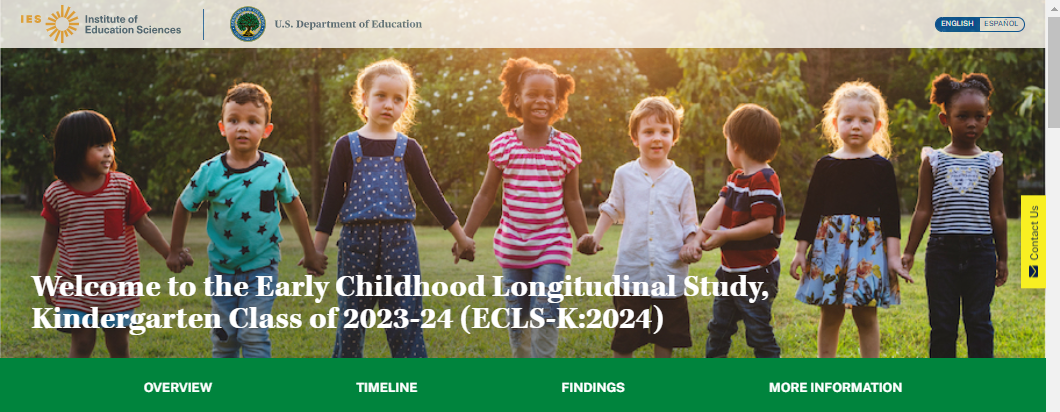
Top of the screen, when the participant is logged in:
MyECLS Home
Portal
Logout
Spanish text:
Página inicial de MyECLS
Portal
Cerrar sesión
Welcome to the Early Childhood Longitudinal Study, Kindergarten Class of 2023-24 (ECLS-K:2024)
The green banner displays buttons to navigate to different sections of the screen: Overview, Timeline, Findings, and More Information.
“Overview” navigates to the overview section. This section includes the “What is the ECLS?,” the Log-in fields to access the participant’s portal page, and “Why Should I Participate?.”
“Timeline” navigates to the “Study Timeline” section.
“Findings” navigates to the “Study Findings” section.
“More Information” navigates to general study information, the list of endorsements, and resources targeted to districts and schools.
Spanish text:
Bienvenido(a) al Estudio Longitudinal de la Primera Infancia, Clase de Kindergarten 2023-24 (ECLS-K:2024)
Descripción general
Calendario
Resultados
Más información
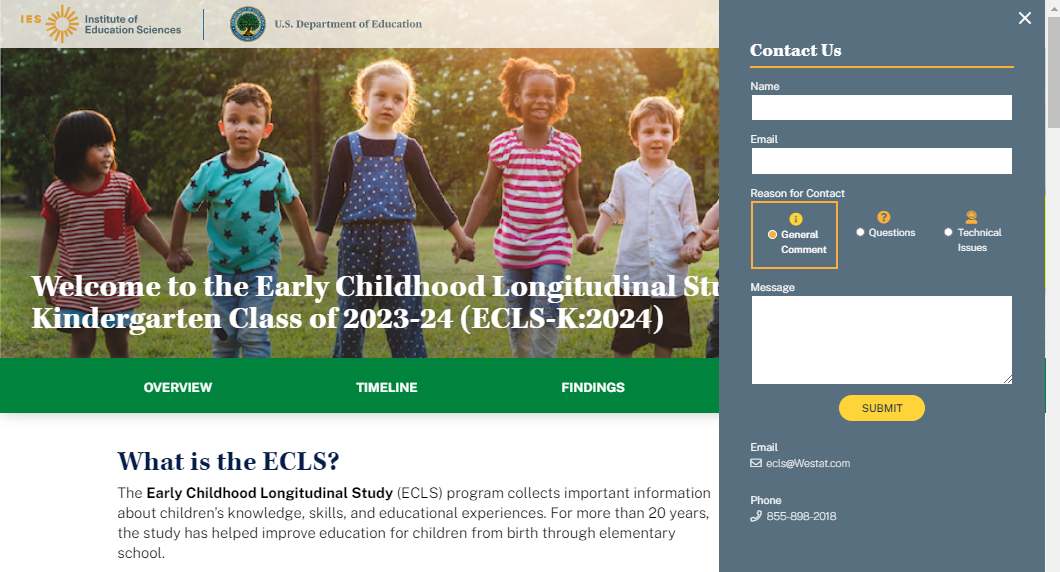
A tab to “Contact us” appears on the right-hand side of the screen. Selecting the “Contact Us” tab opens the “Contact Us” window. Completing the fields in the “Contact Us” window and selecting “Submit” sends a message to [email protected].
English text: Spanish Text:
Contact Us Contáctenos
Name Nombre
Email Correo electrónico
Reason for Contact Motivo del contacto
General Comment Comentario general
Questions Preguntas
Technical Issues Problemas técnicos
Message Mensaje
SUBMIT ENVIAR
Email Correo electrónico
Phone Teléfono
The user may receive the following messages upon selecting “submit”:
An error occurred, please try again. (Se produjo un error. Vuelva a intentarlo.)
Thank you. Message sent successfully. (Gracias. El mensaje se ha enviado con éxito.)
This field is required. (Se debe rellenar este campo.)
1.1 Overview/Log-in Section
If still timely and relevant, display a banner at the top of the page regarding the coronavirus pandemic:

Coronavirus Message
The coronavirus pandemic continues to pose significant challenges for state agencies, districts, and schools, while also affecting us all personally. We recognize these challenges and we are implementing approaches to conduct ECLS-K:2024 activities in schools in a manner that aims to protect the health and safety of students, school staff, and ECLS-K:2024 staff. We will follow recommended guidance from health experts and school-specific safety precautions when our staff visit schools.
Dismiss
Spanish text:
Mensaje sobre coronavirus
La pandemia del coronavirus continúa presentando desafíos importantes a las agencias estatales, distritos y escuelas, mientras sigue afectándonos a todos a nivel individual. Reconocemos estos desafíos y estamos implementando cómo llevar adelante las actividades de ECLS-K:2024 en las escuelas de manera de proteger la salud y la seguridad de los estudiantes, del personal escolar y del personal de ECLS-K:2024. Cuando nuestro personal visite las escuelas, seguiremos las recomendaciones de los expertos en salud y las precauciones específicas de las escuelas.
Eliminar mensaje de error
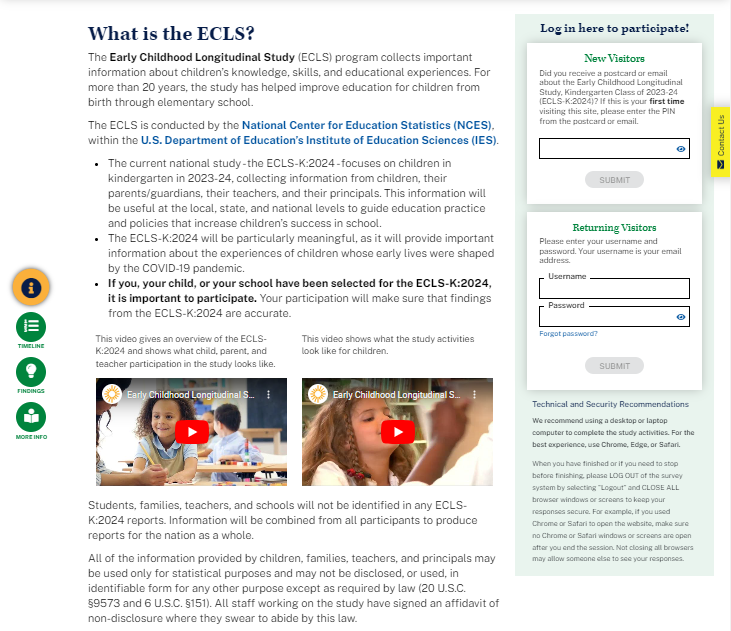
The left-hand side of the screen displays information about the ECLS. The navigation buttons on the left can be used to skip to each section: Overview, Timeline, Findings, and More Info.
What is the ECLS?
The Early Childhood Longitudinal Study (ECLS) program collects important information about children’s knowledge, skills, and educational experiences. For more than 20 years, the study has helped improve education for children from birth through elementary school.
The ECLS is conducted by the National Center for Education Statistics (NCES) [LINK TO NCES WEBSITE https://nces.ed.gov/ecls/], within the U.S. Department of Education’s [LINK TO DEPARTMENT OF EDUCATION SITE https://www.ed.gov/] Institute of Education Sciences (IES) [LINK TO IES SITE https://ies.ed.gov/].
The current national study - the ECLS-K:2024 - focuses on children [BEGINNING IN FALL 2024: who were] in kindergarten in 2023-24, collecting information from children, their parents/guardians, their teachers, and their principals. This information will be useful at the local, state, and national levels to guide education practice and policies that increase children’s success in school. [FALL 2024: The study is currently contacting selected schools to prepare for the spring 2025 study activities, when most participating children will be in first grade.] [SPRING 2025: The study is currently conducting activities with participating children, most of whom are in first grade.]
The ECLS-K:2024 will be particularly meaningful, as it will provide important information about the experiences of children whose early lives were shaped by the COVID-19 pandemic.
If you, your child, or your school have been selected for the ECLS-K:2024, it is important to participate. Your participation will make sure that findings from the ECLS-K:2024 are accurate.
Thumbnails of the ECLS-K:2024 videos display below the text. The overview video gives a summary of the ECLS program and ECLS-K:2024 study. The child experience video shows what study activities look like for children. See the video scripts in Attachments A-3 and A-6.
This video gives an overview of the ECLS-K:2024 and shows what child, parent, and teacher participation in the study looks like.
DISPLAY OVERVIEW VIDEO THUMBNAIL.
This video shows what the study activities look like for children.
DISPLAY CHILD EXPERIENCE VIDEO THUMBNAIL
Students, families, teachers, and schools will not be identified in any ECLS-K:2024 reports. Information will be combined from all participants to produce reports for the nation as a whole.
All of the information provided by children, families, teachers, and principals may be used only for statistical purposes and may not be disclosed, or used, in identifiable form for any other purpose except as required by law (20 U.S.C. §9573 and 6 U.S.C. §151). All staff working on the study have signed an affidavit of non-disclosure where they swear to abide by this law.
The right-hand side of the screen displays log-in fields for visitors with credentials.
Log in here to participate!
[[New Visitors]/[BEGINNING IN ROUND 2 SPRING K, DISPLAY: “First login to the website this [spring/fall]?”]]
Did you receive a postcard or email about the Early Childhood Longitudinal Study, Kindergarten Class of 2023-24 (ECLS-K:2024)? If this is your first time visiting this site this [spring/fall], please enter the PIN from the postcard or email.
[[Returning Visitors]/[BEGINNING IN ROUND 2 SPRING K, DISPLAY: “Already set your username and password for this [spring/fall]?”]]
Please enter your username and password. Your username is your email address.
Forgot Password? [LINK]
When the “forgot password” link is clicked, the user receives an email with a link. The email reads: “Click the link below to create a new password. Reset Password [LINK].”
Spanish text:
¿Qué es el ECLS?
El programa del Estudio Longitudinal de la Primera Infancia (ECLS por sus siglas en inglés) recopila información importante sobre los conocimientos, las habilidades y las experiencias educativas de los niños. Durante más de 20 años, el estudio ha ayudado a mejorar la educación de los niños desde su nacimiento y durante la escuela elemental.
El estudio ECLS es llevado a cabo por el Centro Nacional para Estadísticas de Educación (NCES por sus siglas en inglés) [LINK TO NCES WEBSITE https://nces.ed.gov/ecls/], dentro del Instituto de Ciencias de la Educación (IES por sus siglas en inglés) [LINK TO IES SITE https://ies.ed.gov/], del Departamento de Educación de los EE.UU. [LINK TO DEPARTMENT OF EDUCATION SITE https://www.ed.gov/].
El estudio nacional actual - el ECLS-K:2024 – se enfoca en los niños [BEGINNING IN FALL 2024: que estaban] en kindergarten en 2023-24 y obtiene información de los niños, sus padres o madres/tutores o guardianes legales, sus maestros y los directores de escuelas. Esta información será útil a nivel local, estatal y nacional para guiar las prácticas y políticas educativas que permiten un mejor desempeño escolar en los niños. [FALL 2024: Actualmente el estudio está contactando a las escuelas seleccionadas para que se preparen para las actividades del estudio en la primavera de 2025, cuando la mayoría de los niños que participen estarán en primer grado.] [SPRING 2025: Actualmente el estudio está llevando a cabo actividades con los niños que participan, la mayor parte de los cuales están en primer grado.]
El estudio ECLS-K:2024 será particularmente significativo ya que proporcionará importante información acerca de las experiencias de los niños cuyos primeros años de vida fueron moldeados por la pandemia del COVID-19.
Si usted, su niño(a) o su escuela han sido seleccionados para el ECLS-K:2024, es importante que participen. Su participación asegurará que los resultados de ECLS-K:2024 sean precisos.
Este video presenta un resumen del ECLS-K:2024 y muestra en qué consiste la participación de los niños, sus padres/madres y maestros.
DISPLAY OVERVIEW VIDEO THUMBNAIL
En este video se muestra cómo son las actividades del estudio para los niños y niñas.
DISPLAY CHILD EXPERIENCE VIDEO THUMBNAIL
Los estudiantes, las familias, los maestros y las escuelas no se identificarán en ningún reporte de ECLS-K:2024. La información de todos los participantes se combinará para producir reportes sobre la nación en su conjunto.
Toda la información que proporcionen los niños, las familias, los maestros y los directores podrá usarse solamente para propósitos estadísticos y no podrá divulgarse ni usarse de manera que permita identificar a los participantes para ningún otro propósito, salvo que lo requiera la ley (20 U.S.C. §9573 y 6 U.S.C. §151). Todo el personal que trabaja en el estudio ha firmado una declaración de no divulgación, donde juran cumplir con esta ley.
¡Ingrese aquí para participar!
[[Visitantes Nuevos]/[ BEGINNING IN ROUND 2 SPRING K, DISPLAY: “¿Es la primera vez que ingresa a esta página de Internet [esta primavera/este otoño]?”]]
¿Recibió una tarjeta postal o un correo electrónico sobre el Estudio Longitudinal de la Primera Infancia, Clase de Kindergarten 2023-24 (ECLS-K:2024)? Si es la primera vez que visita esta página de Internet [esta primavera/este otoño], por favor ponga el PIN que está en la tarjeta postal o en su correo electrónico.
[[Visitantes Que Regresan ]/[ BEGINNING IN ROUND 2 SPRING K, DISPLAY: “¿Ya puso su nombre de usuario y su contraseña para [esta primavera/este otoño]?”]]
Por favor ponga su nombre de usuario y su contraseña. Su nombre de usuario es su dirección de correo electrónico.
¿Olvidó su contraseña? [LINK]
When the “¿Olvidó su contraseña?” link is clicked, the user receives an email with a link. The email reads: Haga clic en el siguiente enlace para crear una nueva contraseña. Crear nueva contraseña [LINK].
There is a PIN field for first-time visitors and there are username and password fields for returning visitors.
First-time visitors will enter a PIN and then immediately will be prompted to create a username and password.
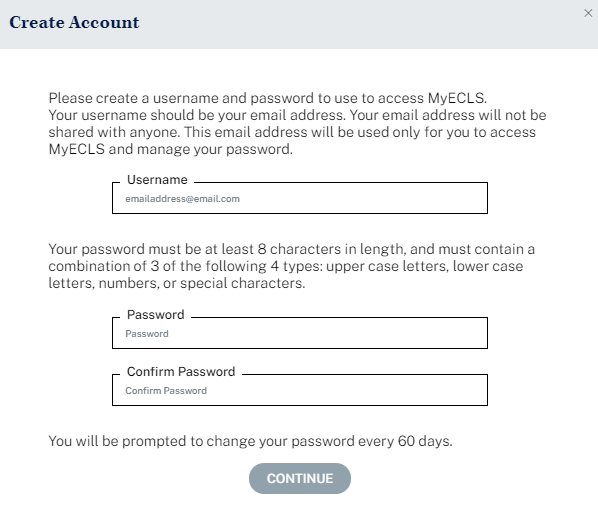
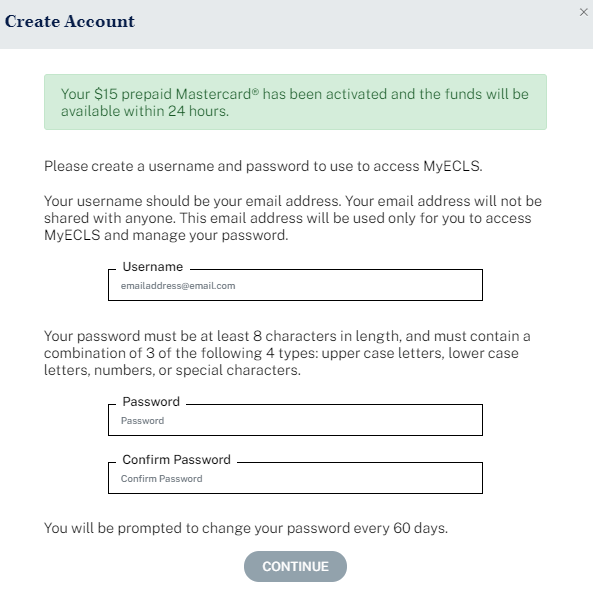
Create Account
Display for parents if a parent incentive is offered: Your $15 prepaid Mastercard® has been activated and the funds will be available within 24 hours.
Please create a username and password to use to access MyECLS. Your username should be your email address. Your email address will not be shared with anyone. This email address will be used only for you to access MyECLS and manage your password.
Username
Your password must be at least 8 characters in length and must contain a combination of 3 of the following 4 types: upper case letters, lower case letters, numbers, or special characters.
Password
Confirm Password
You will be prompted to change your password every 60 days.
Continue (BUTTON)
Spanish text:
Crear una cuenta
Display for parents if a parent incentive is offered: Su tarjeta prepagada Mastercard® de $15 ha sido activada y los fondos estarán disponibles en un plazo de 24 horas.
Por favor, cree un nombre de usuario y una contraseña para ingresar a MyECLS. Su nombre de usuario debe ser su dirección de correo electrónico. No compartiremos con nadie su dirección de correo electrónico. Esta dirección de correo electrónico se usará solamente para ingresar a MyECLS y administrar su contraseña.
Nombre de usuario
Su contraseña deberá tener al menos 8 caracteres de longitud y deberá incluir una combinación de 3 de los siguientes 4 tipos: letras mayúsculas, letras minúsculas, números, o caracteres especiales.
Contraseña
Confirmar contraseña
Cada 60 días se le pedirá que cambie su contraseña.
Continuar (BUTTON)
When the “Forgot Password?” link is selected, a temporary password will be sent to the user’s email address (username).
Users will be prompted to reset passwords every 60 days.
The following messages will appear below the log-in fields on the Create Account modal (2-4; 6), or will appear in a new pop-up window (1; 5; 7-15).
A message for invalid PIN entry (too few/many digits or not recognized):
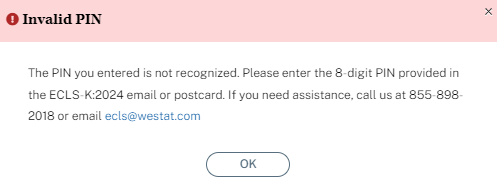
Invalid PIN
“The PIN you entered is not recognized. Please enter the 8-digit PIN provided in the ECLS-K:2024 email or postcard. If you need assistance, call us at 855-898-2018 or email [email protected].”
Spanish text:
PIN inválido
“El PIN que ingresó no se reconoce. Por favor, ingrese el PIN válido de 8 dígitos proporcionado en el correo electrónico o tarjeta postal de ECLS-K:2024. Si necesita ayuda, llámenos al 855-898-2018 o envíe un correo electrónico a [email protected]."
A message for invalid email address at account creation (no @ symbol, no .com/.org/etc. extension, contains a space or invalid characters):

“Please enter a valid email address.”
Spanish text:
“Por favor ponga una dirección de correo electrónico válida.”
Messages for user account password requirements (depending on what is entered in the fields):


“Please enter at least 8 characters.”
“Please use at least 1 lowercase letter.”
“Please use at least 1 uppercase letter.”
“Please use at least 1 digit.”
“Please use at least 1 special character.”
“Password successfully updated.”
“Reset MyECLS Password”
“This field is required.”
Spanish text:
“Por favor ingrese por lo menos 8 caracteres.”
“Por favor use por lo menos 1 letra minúscula.”
“Por favor use por lo menos 1 letra mayúscula.”
“Por favor use por lo menos 1 dígito.”
“Por favor use por lo menos 1 carácter especial.”
“La contraseña se ha logrado cambiar.”
“Cambiar mi contraseña de MyECLS”
“Se debe rellenar este campo.”
A message for non-matching passwords at password creation (either initially or upon reset):

“Please enter the same value again.”
Spanish text:
“Por favor ponga nuevamente el mismo valor.”
A message if the user enters a PIN associated with an ID for which an account (username and password) has already been created:
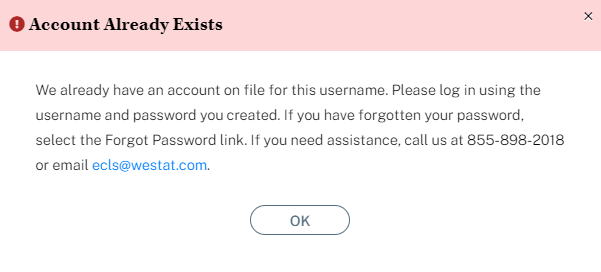
Account Already Exists
“We already have an account on file for this username. Please log in using the username and password you created. If you have forgotten your password, select the Forgot Password link. If you need assistance, call us at 855-898-2018 or email [email protected].”
Spanish text:
Esta cuenta ya existe
“Ya tenemos una cuenta en el sistema para este nombre de usuario. Por favor, inicie la sesión con el nombre de usuario y la contraseña que ha creado. Si ha olvidado su contraseña, haga clic en el enlace ¿Olvidó su contraseña? Si necesita ayuda, llámenos al 855-898-2018 o envíe un correo electrónico a [email protected]."
A message if the user attempts to use an existing username to create an account for a second PIN (red text on Create Account window):
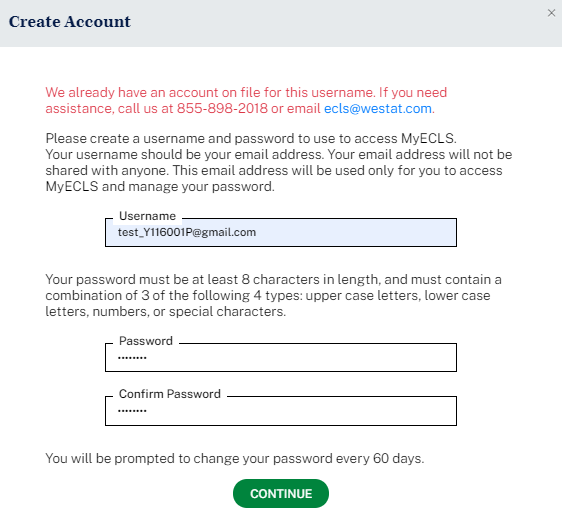
“We already have an account on file for this username. If you need assistance, call us at 855-898-2018 or email [email protected].”
Spanish text:
"Ya tenemos una cuenta en el sistema para este nombre de usuario. Si necesita ayuda, llámenos al 855-898-2018 o envíe un correo electrónico a [email protected]."
A message for unrecognized username:
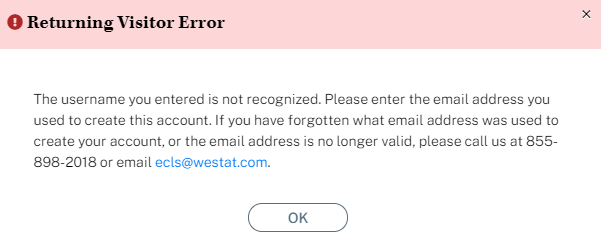
Returning Visitor Error
“The username you entered is not recognized. Please enter the email address you used to create this account. If you have forgotten what email address was used to create your account, or the email address is no longer valid, please call us at 855-898-2018 or email [email protected].”
Spanish text:
Error para visitantes que regresan
"El nombre de usuario que ha ingresado no se reconoce. Por favor, ingrese la dirección de correo electrónico que utilizó para crear esta cuenta. Si ha olvidado la dirección de correo electrónico que utilizó para crear su cuenta, o si esa dirección ya no es válida, por favor llámenos al 855-898-2018 o envíe un correo electrónico a [email protected]."
A message for unrecognized password:
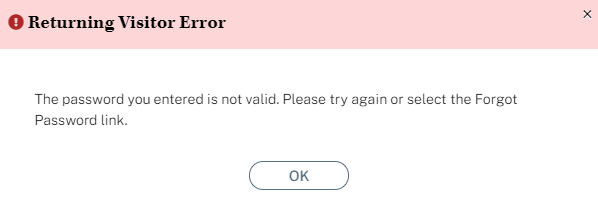
Returning Visitor Error
“The password you entered is not valid. Please try again or select the Forgot Password link.”
Spanish text:
Error para visitantes que regresan
"La contraseña que ha ingresado no es válida. Por favor, inténtelo de nuevo o haga clic en el enlace ¿Olvidó su contraseña?"
Message pop-up box for when the user clicks the forgot password link:
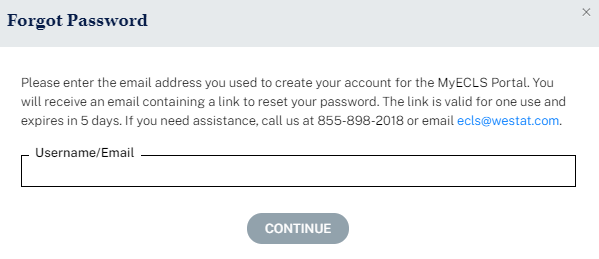
Forgot Password
“Please enter the email address you used to create your account for the MyECLS Portal. You will receive an email containing a link to reset your password. The link is valid for one use and expires in 5 days. If you need assistance, call us at 855-898-2018 or email [email protected].”
Username/Email [FIELD]
Continue [BUTTON]
Spanish text:
Olvidó su contraseña
"Por favor, ingrese la dirección de correo electrónico que utilizó para crear su cuenta en el portal MyECLS. Recibirá un correo electrónico con un enlace para cambiar su contraseña. El enlace es válido para un solo uso y expira en 5 días. Si necesita ayuda, llámenos al 855-898-2018 o envíe un correo electrónico a [email protected]."
Nombre de usuario/correo electrónico [FIELD]
Continuar [BUTTON]
Message box for log-in using the reset password link that the user received in an email after selecting the “forgot password” link:
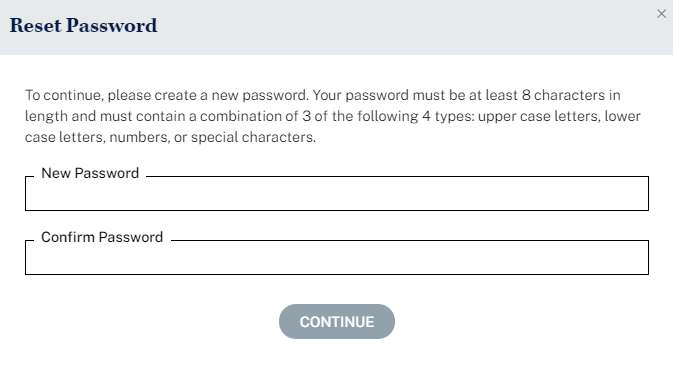
Reset Password
“To continue, please create a new password. Your password must be at least 8 characters in length and must contain a combination of 3 of the following 4 types: upper case letters, lower case letters, numbers, or special characters.”
New Password [FIELD]
Confirm Password [FIELD]
Continue [BUTTON]
Spanish text:
Cambiar de contraseña
"Para continuar, por favor cambie la contraseña. Su contraseña deberá tener al menos 8 caracteres de longitud y deberá incluir una combinación de 3 de los siguientes 4 tipos: letras mayúsculas, letras minúsculas, números, o caracteres especiales."
Nueva contraseña [FIELD]
Confirme la contraseña [FIELD]
Continuar [BUTTON]
Possible error messages associated with this screen (English and Spanish):
The password you entered does not meet the minimum requirements. Your password must be at least 8 characters in length and must contain a combination of 3 of the following 4 types: upper case letters, lower case letters, numbers, or special characters. It must not be identical to a previous password.
La contraseña que puso no cumple con los requisitos mínimos. Su contraseña deberá tener al menos 8 caracteres de longitud y deberá incluir una combinación de 3 de los siguientes 4 tipos: letras mayúsculas, letras minúsculas, números, o caracteres especiales. No debe ser idéntica a una contraseña que usó aquí antes.
The passwords you entered do not match. Please try again. Your password must be at least 8 characters in length and must contain a combination of 3 of the following 4 types: upper case letters, lower case letters, numbers, or special characters. It must not be identical to a previous password.
Las contraseñas que puso no concuerdan. Por favor, inténtelo de nuevo. Su contraseña deberá tener al menos 8 caracteres de longitud y deberá incluir una combinación de 3 de los siguientes 4 tipos: letras mayúsculas, letras minúsculas, números, o caracteres especiales. No debe ser idéntica a una contraseña que usó aquí antes.

Reset Password
Password successfully updated.
Continue [BUTTON]
Spanish text:
Cambiar de contraseña
La contraseña se ha logrado cambiar.
Continuar [BUTTON]
Message when user clicks a reset password link that has expired:
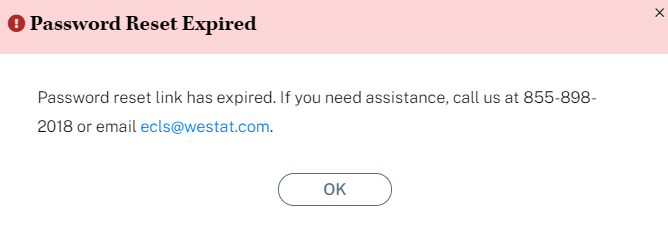
Password Reset Expired
“Password reset link has expired. If you need assistance, call us at 855-898-2018 or email [email protected].”
Spanish text:
El cambio de contraseña ha expirado
"El enlace para cambiar la contraseña ha expirado. Si necesita ayuda, llámenos al 855-898-2018 o envíe un correo electrónico a [email protected]."
An alert that the password will expire soon (passwords expire every 60 days). This message will display upon log-in within 7 days of the expiration date. The user can cancel, since he or she is not required to change passwords until the 60-day expiration. For the second message, only the red text is specified below the screenshot.
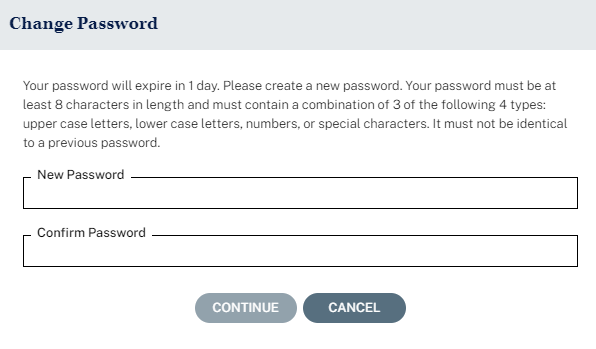
Change Password
“Your password will expire in X days. Please create a new password. Your password must be at least 8 characters in length and must contain a combination of 3 of the following 4 types: upper case letters, lower case letters, numbers, or special characters. It must not be identical to a previous password.”
New Password [FIELD]
Confirm Password [FIELD]
Continue [BUTTON]
Cancel [BUTTON]
Spanish text:
Cambiar contraseña
"Su contraseña expirará en X días. Por favor, cambie su nueva contraseña. Su contraseña deberá tener al menos 8 caracteres de longitud y deberá incluir una combinación de 3 de los siguientes 4 tipos: letras mayúsculas, letras minúsculas, números, o caracteres especiales. No debe ser idéntica a una contraseña que usó aquí antes."
Nueva contraseña [FIELD]
Confirme la contraseña [FIELD]
Cancelar [BUTTON]
Continuar [BUTTON]
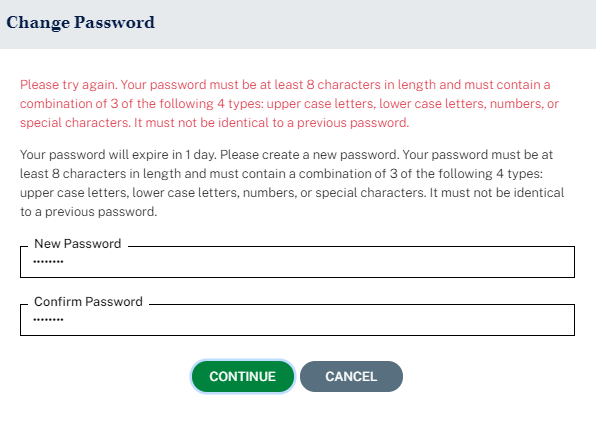
Change Password
“Please try again. Your password must be at least 8 characters in length and must contain a combination of 3 of the following 4 types: upper case letters, lower case letters, numbers, or special characters. It must not be identical to a previous password.
Your password will expire in X days. Please create a new password. Your password must be at least 8 characters in length and must contain a combination of 3 of the following 4 types: upper case letters, lower case letters, numbers, or special characters. It must not be identical to a previous password.”
New Password [FIELD]
Confirm Password [FIELD]
Continue [BUTTON]
Cancel [BUTTON]
Spanish text:
Cambiar contraseña
"Por favor, inténtelo de nuevo. Su contraseña deberá tener al menos 8 caracteres de longitud y deberá incluir una combinación de 3 de los siguientes 4 tipos: letras mayúsculas, letras minúsculas, números, o caracteres especiales. No debe ser idéntica a una contraseña que usó aquí antes.
Su contraseña expirará en X días. Por favor, cambie su nueva contraseña. Su contraseña deberá tener al menos 8 caracteres de longitud y deberá incluir una combinación de 3 de los siguientes 4 tipos: letras mayúsculas, letras minúsculas, números, o caracteres especiales. No debe ser idéntica a una contraseña que usó aquí antes."
Nueva contraseña [FIELD]
Confirme la contraseña [FIELD]
Continuar [BUTTON]
Cancelar [BUTTON]
Possible error messages associated with this screen (English and Spanish):
The password you entered does not meet the minimum requirements. Your password must be at least 8 characters in length and must contain a combination of 3 of the following 4 types: upper case letters, lower case letters, numbers, or special characters. It must not be identical to a previous password.
La contraseña que puso no cumple con los requisitos mínimos. Su contraseña deberá tener al menos 8 caracteres de longitud y deberá incluir una combinación de 3 de los siguientes 4 tipos: letras mayúsculas, letras minúsculas, números, o caracteres especiales. No debe ser idéntica a una contraseña que usó aquí antes.
The passwords you entered do not match. Please try again. Your password must be at least 8 characters in length and must contain a combination of 3 of the following 4 types: upper case letters, lower case letters, numbers, or special characters. It must not be identical to a previous password.
Las contraseñas que puso no concuerdan. Por favor, inténtelo de nuevo. Su contraseña deberá tener al menos 8 caracteres de longitud y deberá incluir una combinación de 3 de los siguientes 4 tipos: letras mayúsculas, letras minúsculas, números, o caracteres especiales. No debe ser idéntica a una contraseña que usó aquí antes.

Change Password
Password Successfully updated.
Continue [BUTTON]
Spanish text:
Cambiar contraseña
La contraseña se ha logrado cambiar.
Continuar [BUTTON]
An alert that the password has expired and the user must create a new one (passwords expire every 60 days):
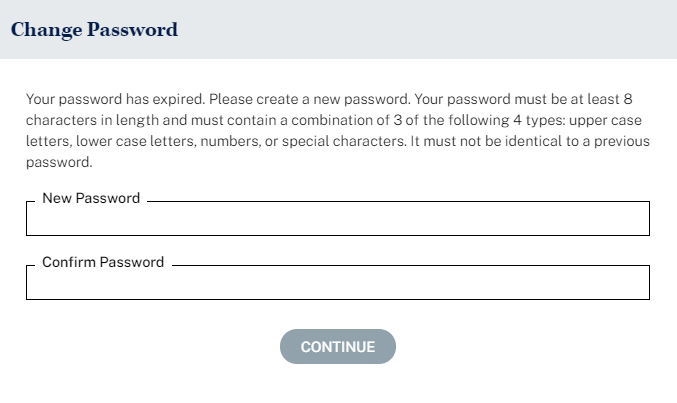
Change Password
“Your password has expired. Please create a new password. Your password must be at least 8 characters in length and must contain a combination of 3 of the following 4 types: upper case letters, lower case letters, numbers, or special characters. It must not be identical to a previous password.”
New Password [FIELD]
Confirm Password [FIELD]
Continue [BUTTON]
Spanish text:
Cambiar contraseña
"Su contraseña ha expirado. Por favor, cambie su contraseña. Su contraseña deberá tener al menos 8 caracteres de longitud y deberá incluir una combinación de 3 de los siguientes 4 tipos: letras mayúsculas, letras minúsculas, números, o caracteres especiales. No debe ser idéntica a una contraseña que usó aquí antes."
Nueva contraseña [FIELD]
Confirme la contraseña [FIELD]
Continuar [BUTTON]
Possible error messages associated with this screen (English and Spanish):
The password you entered does not meet the minimum requirements. Your password must be at least 8 characters in length and must contain a combination of 3 of the following 4 types: upper case letters, lower case letters, numbers, or special characters. It must not be identical to a previous password.
La contraseña que puso no cumple con los requisitos mínimos. Su contraseña deberá tener al menos 8 caracteres de longitud y deberá incluir una combinación de 3 de los siguientes 4 tipos: letras mayúsculas, letras minúsculas, números, o caracteres especiales. No debe ser idéntica a una contraseña que usó aquí antes.
The passwords you entered do not match. Please try again. Your password must be at least 8 characters in length and must contain a combination of 3 of the following 4 types: upper case letters, lower case letters, numbers, or special characters. It must not be identical to a previous password.
Las contraseñas que puso no concuerdan. Por favor, inténtelo de nuevo. Su contraseña deberá tener al menos 8 caracteres de longitud y deberá incluir una combinación de 3 de los siguientes 4 tipos: letras mayúsculas, letras minúsculas, números, o caracteres especiales. No debe ser idéntica a una contraseña que usó aquí antes.
Message for a disabled account (e.g., parent assigned final refusal status code, parent of child who moved and was not followed, teacher no longer linked to study children, school administrator or school coordinator has changed).
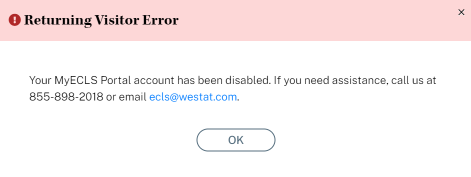
Returning Visitor Error
“Your MyECLS Portal account has been disabled. If you need assistance, call us at 855-898-2018 or email [email protected].”
Spanish text:
Error para visitantes que regresan
"Su cuenta del portal MyECLS ha sido desactivada. Si necesita ayuda, llámenos al 855-898-2018 o envíe un correo electrónico a [email protected]."
Message for when the user is inactive.
![]()
“Inactivity Warning: As a security precaution your MyECLS session will end in 1 minute if there is no additional activity Please click Continue if you do not wish to time out.”
Continue
“Advertencia de inactividad: Como precaución de seguridad, su sesión de MyECLS va a terminar en 1 minuto si no hay ninguna actividad más. Haga clic en Continuar si no desea que se agote el tiempo de espera.”
Continuar
![]()
“Your session has timed out. You will have to log back on to continue.”
“Tu sesión ha expirado. Tendrás que volver a iniciar sesión para continuar.”
Message for when MyECLS participant portals are inactive between rounds.
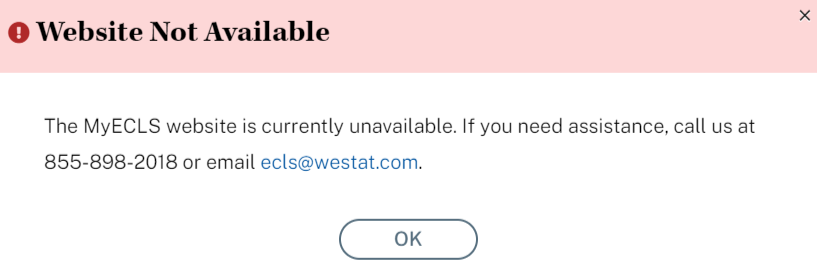
Website Not Available
“The MyECLS website is currently unavailable. If you need assistance, call us at 855-898-2018 or email [email protected].”
Spanish text:
La página no está disponible
“El sitio MyECLS en Internet no está disponible actualmente. Si necesita ayuda, llámenos al 855-898-2018 o envíe un correo a [email protected].”
Below the log-in fields, display “Technical and Security Recommendations”:
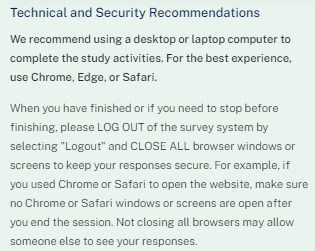
We recommend using a desktop or laptop computer to complete the study activities. For the best experience, use Chrome, Edge, or Safari.
When you have finished or if you need to stop before finishing, please LOG OUT of the survey system by selecting "Logout" and CLOSE ALL browser windows or screens to keep your responses secure. For example, if you used Chrome or Safari to open the website, make sure no Chrome or Safari windows or screens are open after you end the session. Not closing all browsers may allow someone else to see your responses.
Spanish text:
Le recomendamos usar una computadora de escritorio o una computadora portátil para completar las actividades del estudio. Para que tenga una mejor experiencia, use Chrome, Edge o Safari.
Cuando haya terminado, o si necesita hacer otra cosa antes de terminar, por favor CIERRE LA SESIÓN del sistema de la encuesta, haciendo clic en "Cerrar sesión" y CIERRE TODAS las ventanas o pantallas del navegador para mantener sus respuestas seguras. Por ejemplo, si usted usó Chrome o Safari para abrir la página de Internet, asegúrese de que no hay ventanas o pantallas abiertas en Chrome o Safari después de terminar la sesión. No cerrar todos los navegadores puede permitir que otra persona vea sus respuestas.
When the respondent logs in, “Technical and Security Recommendations” will appear:
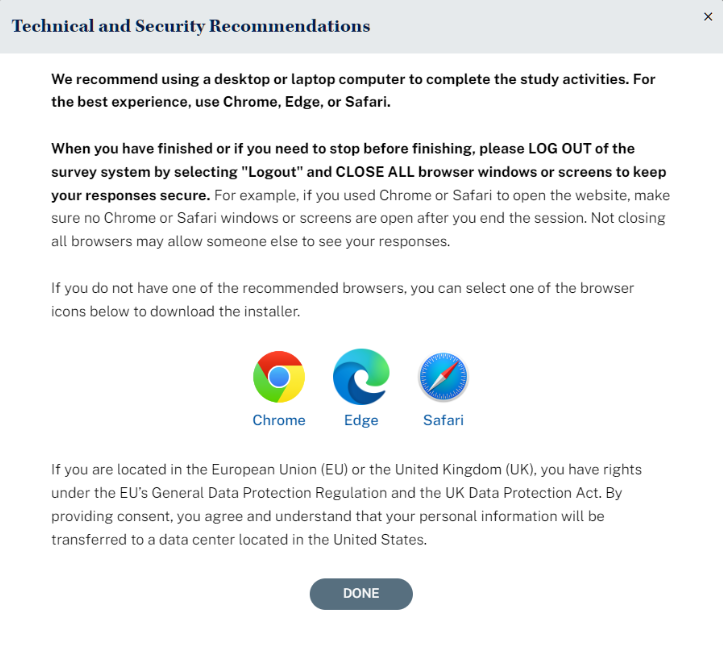
Technical and Security Recommendations
We recommend using a desktop or laptop computer to complete the study activities. For the best experience, use Chrome, Edge, or Safari.
When you have finished or if you need to stop before finishing, please LOG OUT of the survey system by selecting "Logout" and CLOSE ALL browser windows or screens to keep your responses secure. For example, if you used Chrome or Safari to open the website, make sure no Chrome or Safari windows or screens are open after you end the session. Not closing all browsers may allow someone else to see your responses.
If you do not have one of the recommended browsers, you can select one of the browser icons below to download the installer.
Chrome Edge Safari
If you are located in the European Union (EU) or the United Kingdom (UK), you have rights under the EU’s General Data Protection Regulation and the UK Data Protection Act. By providing consent, you agree and understand that your personal information will be transferred to a data center located in the United States.
DONE
Spanish text:
Recomendaciones técnicas y de seguridad
Le recomendamos usar una computadora de escritorio o una computadora portátil para completar las actividades del estudio. Para que tenga una mejor experiencia, use Chrome, Edge o Safari.
Cuando haya terminado, o si necesita hacer otra cosa antes de terminar, por favor CIERRE LA SESIÓN del sistema de la encuesta, haciendo clic en "Cerrar sesión" y CIERRE TODAS las ventanas o pantallas del navegador para mantener sus respuestas seguras. Por ejemplo, si usted usó Chrome o Safari para abrir la página de Internet, asegúrese de que no hay ventanas o pantallas abiertas en Chrome o Safari después de terminar la sesión. No cerrar todos los navegadores puede permitir que otra persona vea sus respuestas.
Si no tiene ninguno de los navegadores recomendados, puede seleccionar uno de los íconos de navegadores que están a continuación para descargar el instalador.
Chrome Edge Safari
Si usted está ubicado(a) en la Unión Europea o en el Reino Unido, tiene derechos bajo el Reglamento General de Protección de Datos de la Unión Europea y bajo la Ley de Protección de Datos del Reino Unido. Al dar su consentimiento, usted indica que está de acuerdo y entiende que su información personal será transferida a un centro de datos ubicado en los Estados Unidos.
LISTO
1.2 “Why Should I Participate?” Section
Below the overview and log-in section, the user can scroll down to “Why Should I Participate?”
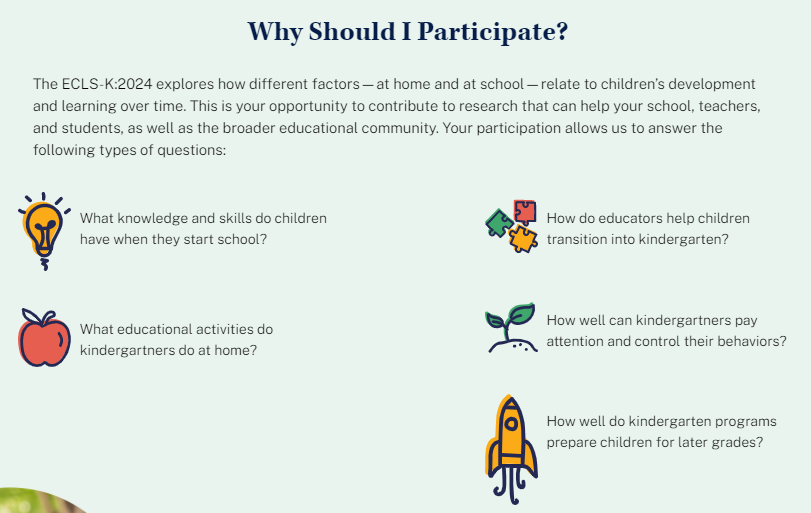
Why Should I Participate?
The ECLS-K:2024 explores how different factors—at home and at school—relate to children’s development and learning over time. This is your opportunity to contribute to research that can help your school, teachers, and students, as well as the broader educational community. Your participation allows us to answer the following types of questions:
[DISPLAY IN FALL AND SPRING KINDERGARTEN:
What knowledge and skills do children have when they start school?
What educational activities do kindergartners do at home?
How do educators help children transition into kindergarten?
How well can kindergartners pay attention and control their behaviors?
How well do kindergarten programs prepare children for later grades?]
[DISPLAY IN FALL1 AND SPRING FIRST GRADE:
How do children’s knowledge and skills at kindergarten entry relate to their development through elementary school?
What educational activities do children in the first grade do at home?
How do educators help children transition into later grades of elementary school?
How well can children in the first grade pay attention and control their behaviors?
How well did kindergarten programs prepare children for later grades?]
Spanish text:
¿Por qué debería yo participar?
El ECLS-K:2024 explora la manera en que distintos factores, en el hogar y en la escuela, se relacionan con el desarrollo y el aprendizaje de los niños a lo largo del tiempo. Esta es su oportunidad de contribuir a una serie de estudios que pueden ayudar a su escuela, a los maestros y a los estudiantes, así como a la comunidad educativa en general. Su participación nos permite responder a los siguientes tipos de preguntas:
[DISPLAY IN FALL AND SPRING KINDERGARTEN:
¿Qué conocimientos y habilidades tienen los niños cuando empiezan la escuela?
¿Qué actividades educativas hacen los niños de kindergarten en su hogar?
¿Cómo ayudan los educadores en la transición de los niños al kindergarten?
¿Qué tan bien pueden los niños de kindergarten poner atención y controlar sus comportamientos?
¿Qué tan bien preparan los programas de kindergarten a los niños para los grados que siguen?
[DISPLAY IN FALL AND SPRING FIRST GRADE:
¿Cómo se relacionan los conocimientos y habilidades de los niños al entrar al kindergarten con su desarrollo a lo largo de la escuela elemental?
¿Qué actividades educativas hacen los niños de primer grado en su hogar?
¿Cómo ayudan los educadores en la transición de los niños a los grados que siguen de la escuela elemental?
¿Qué tan bien pueden los niños de primer grado poner atención y controlar sus comportamientos?
¿Qué tan bien prepararon los programas de kindergarten a los niños para los grados que siguen?]
1.3 Study Timeline Section
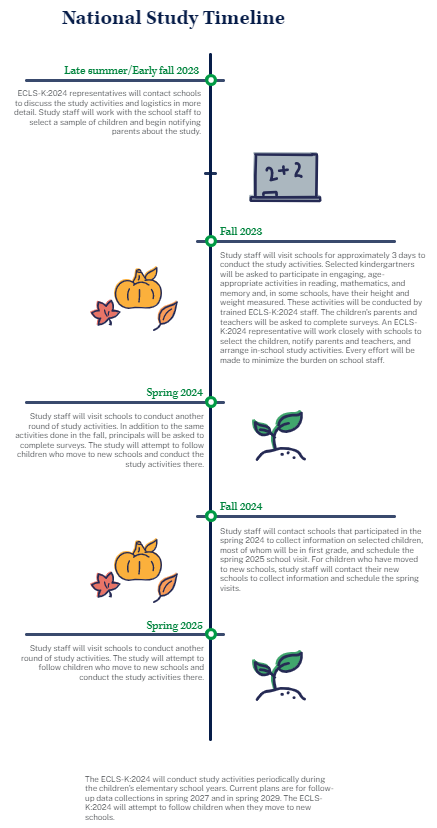
Study Timeline
National
Late summer/Early fall 2023: ECLS-K:2024 representatives will contact schools to discuss the study activities and logistics in more detail. Study staff will work with the school staff to select a sample of children and begin notifying parents about the study.
Fall 2023: Study staff will visit schools for approximately 3 days to conduct the study activities. Selected kindergartners will be asked to participate in engaging, age-appropriate activities in reading, mathematics, and memory and, in some schools, have their height and weight measured. These activities will be conducted by trained ECLS-K:2024 staff. The children’s parents and teachers will be asked to complete surveys. An ECLS-K:2024 representative will work closely with schools to select the children, notify parents and teachers, and arrange in-school study activities. Every effort will be made to minimize the burden on school staff.
Spring 2024: Study staff will visit schools to conduct another round of study activities. In addition to the same activities done in the fall, principals will be asked to complete surveys. The study will attempt to follow children who move to new schools and conduct the study activities there.
Fall 2024: Study staff will contact schools that participated in the spring 2024 to collect information on selected children, most of whom will be in first grade, and schedule the spring 2025 school visit. For children who have moved to new schools, study staff will contact their new schools to collect information and schedule the spring visits.
Spring 2025: Study staff will visit schools to conduct another round of study activities. The study will attempt to follow children who move to new schools and conduct the study activities there.
The ECLS-K:2024 will conduct study activities periodically during the children’s elementary school years. The ECLS-K:2024 will attempt to follow children when they move to new schools.
Spanish text:
Calendario del estudio
Nacional
A finales del verano/principios del otoño 2023: Los representantes de ECLS-K:2024 se pondrán en contacto con las escuelas para hablar en más detalle sobre las actividades del estudio y la logística. El personal del estudio trabajará con el personal de la escuela para seleccionar una muestra de niños y comenzar a notificar a los padres sobre el estudio.
Otoño de 2023: El personal del estudio visitará escuelas durante aproximadamente 3 días para llevar a cabo las actividades de estudio. Se les pedirá a los niños de kindergarten seleccionados que participen en actividades interesantes y apropiadas para su edad lectura, matemáticas, y memoria y, en algunas escuelas, se les medirá la altura y el peso. Estas actividades serán llevadas a cabo por personal entrenado de ECLS-K:2024. A los padres o madres de los niños y a los maestros se les pedirá que completen encuestas. Un representante de ECLS-K:2024 trabajará muy de cerca con las escuelas para seleccionar los niños, notificar a los padres o madres y maestros, y organizar las actividades del estudio en la escuela. Se hará todo lo posible para minimizar la carga del personal de la escuela.
Primavera de 2024: El personal del estudio visitará las escuelas para llevar a cabo otra ronda de actividades del estudio. Además de las mismas actividades realizadas en el otoño, se les pedirá a los directores que completen encuestas. El estudio intentará seguir a sus nuevas escuelas a los niños que se muden, para llevar a cabo las actividades del estudio allí.
Otoño de 2024: El personal del estudio se pondrá en contacto con las escuelas que participaron en la primavera de 2024 para obtener información sobre algunos niños seleccionados, la mayoría de los cuales estarán en primer grado, y programar la visita escolar de la primavera de 2025. Para aquellos niños que hayan cambiado de escuela, el personal del estudio se pondrá en contacto con sus nuevas escuelas para obtener información y programar las visitas de primavera.
Primavera de 2025: El personal del estudio visitará las escuelas para realizar otra ronda de actividades del estudio. [Además de las mismas actividades realizadas en la primavera de 2024, algunos niños serán seleccionados para participar en evaluaciones de la visión durante las visitas escolares de la primavera de 2025]. El estudio intentará seguir a los niños que se transfieran a nuevas escuelas y realizar allí las actividades del estudio.
ECLS-K:2024 llevará a cabo actividades del estudio periódicamente durante los años de los niños en la escuela elemental. ECLS-K:2024 intentará seguir a los niños cuando se muden a nuevas escuelas.
1.4 Findings Section
The infographics to be included in the “Findings” section include those on the following topics: social and academic skills, school supports for families, materials sent home from schools to parents/guardians, and children’s transition to school. The top of the page has the following text:
What we learned from ECLS students, parents, and schools
Spanish text:
Lo que aprendimos de los estudiantes, padres y madres, y escuelas de ECLS
The three sets of infographics display on three tabs: “Social & Academic Skills,” “Children Going to School,” and “School Support of Families.” The first tab displays the “Social and Academic Skills” infographic.
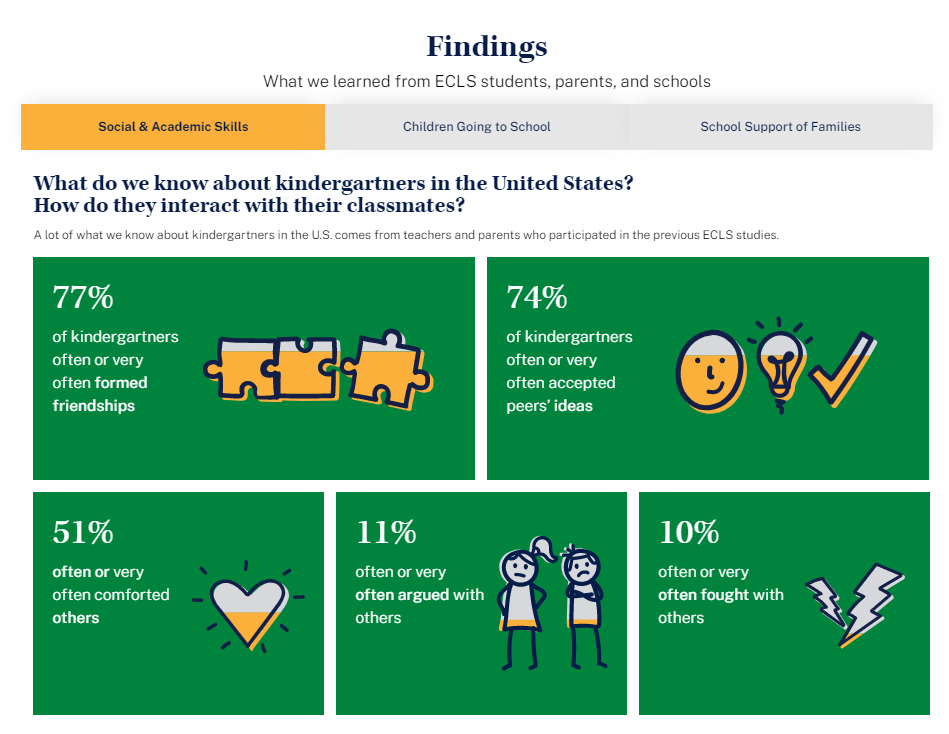
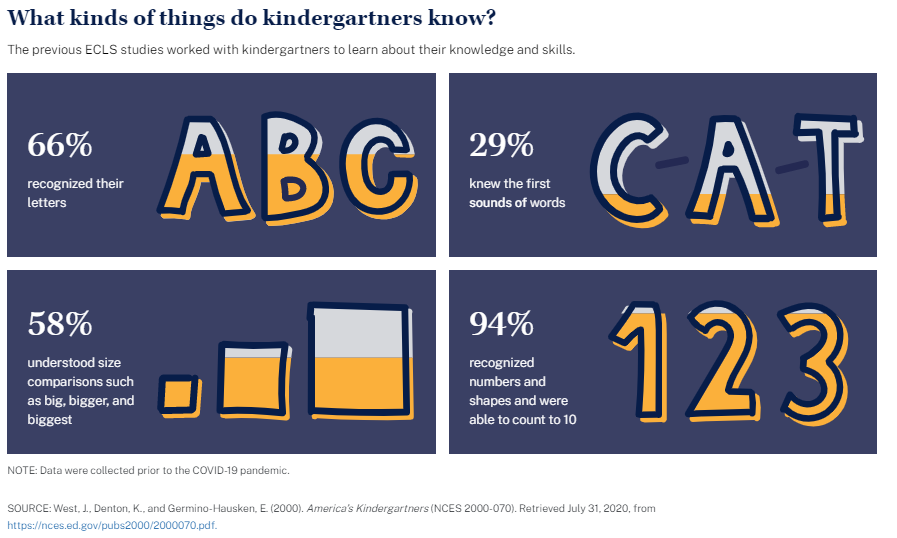
Findings
Social & Academic Skills
What do we know about kindergartners in the United States? How do they interact with their classmates?
A lot of what we know about kindergartners in the U.S. comes from teachers and parents who participated in the previous ECLS studies.
77% of kindergartners often or very often formed friendships
74% of kindergartners often or very often accepted peers’ ideas
51% often or very often comforted others
11% often or very often argued with others
10% often or very often fought with others
What kinds of things do kindergartners know?
The previous ECLS studies worked with kindergartners to learn about their knowledge and skills.
66% recognized their letters
29% knew the first sounds of words
58% understood size comparisons such as big, bigger, and biggest
94% recognized numbers and shapes and were able to count to 10
NOTE: Data were collected prior to the COVID-19 pandemic.
SOURCE: West, J., Denton, K., and Germino-Hausken, E. (2000). America’s Kindergartners (NCES 2000-070). Retrieved July 31, 2020, from https://nces.ed.gov/pubs2000/2000070.pdf.
Spanish text:
Resultados
Habilidades sociales y académicas
¿Qué sabemos de los niños de kindergarten en los Estados Unidos? ¿Cómo interactúan con sus compañeros de clase?
Mucho de lo que sabemos sobre los niños de kindergarten en los EE.UU. proviene de los maestros y de los padres y madres que participaron en los estudios de ECLS anteriores.
77% de los niños de kindergarten formaron amistades frecuentemente o muy frecuentemente
74% de los niños de kindergarten aceptaron las ideas de sus compañeros frecuentemente o muy frecuentemente
51% consolaron a otros frecuentemente o muy frecuentemente
11% discutieron con otros frecuentemente o muy frecuentemente
10% pelearon con otros frecuentemente o muy frecuentemente
¿Qué tipo de cosas saben los niños de kindergarten?
Los estudios de ECLS anteriores trabajaron con niños de kindergarten para conocer sobre sus conocimientos y habilidades.
66% reconoció las letras
29% sabía los primeros sonidos de palabras
58% entendía las comparaciones de tamaño, tales como grande, mayor y el más grande de todos
94% reconoció números y formas y pudo contar hasta 10
NOTA: Los datos fueron recopilados antes de la pandemia de COVID-19.
FUENTE: West, J., Denton, K., and Germino-Hausken, E. (2000). America’s Kindergartners (NCES 2000-070). Datos extraídos el 31 de julio de 2020, de https://nces.ed.gov/pubs2000/2000070.pdf.
The second tab displays the “Children Going to School” infographic.
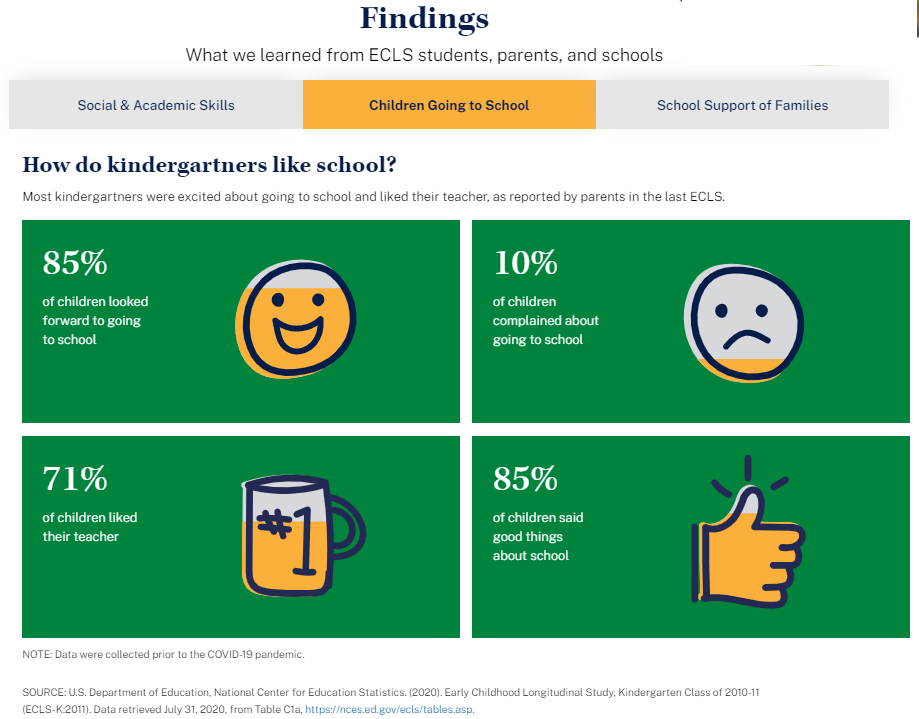
Children Going to School
How do kindergartners like school?
Most kindergartners were excited about going to school and liked their teacher, as reported by parents in the last ECLS.
85% of children looked forward to going to school
10% of children complained about going to school
71% of children liked their teacher
85% of children said good things about school
NOTE: Data were collected prior to the COVID-19 pandemic.
SOURCE: U.S. Department of Education, National Center for Education Statistics. (2020). Early Childhood Longitudinal Study, Kindergarten Class of 2010-11 (ECLS-K:2011). Data retrieved July 31, 2020, from Table C1a, https://nces.ed.gov/ecls/tables.asp.
Spanish text:
Los niños que van a la escuela
¿Qué tanto les gusta la escuela a los niños de kindergarten?
La mayoría de los niños de kindergarten estaban entusiasmados de ir a la escuela y les caía bien su maestro(a), de acuerdo a lo que reportaron los padres y madres en el último estudio ECLS.
85% de los niños estaban deseosos de ir a la escuela
10% de los niños se quejaban de ir a la escuela
71% de los niños les caía bien su maestro(a)
85% de los niños hablaron bien de su escuela
NOTA: Los datos fueron recopilados antes de la pandemia de COVID-19.
FUENTE: Departamento de Educación de los EE.UU., Centro Nacional para Estadísticas de Educación. (2020). Estudio Longitudinal de la Primera Infancia, Clase de Kindergarten 2010-11 (ECLS-K:2011). Datos extraídos el 31 de julio de 2020, de la tabla C1a, https://nces.ed.gov/ecls/tables.asp.
The third tab displays the “School Support of Families” and “Materials Sent Home” infographics.
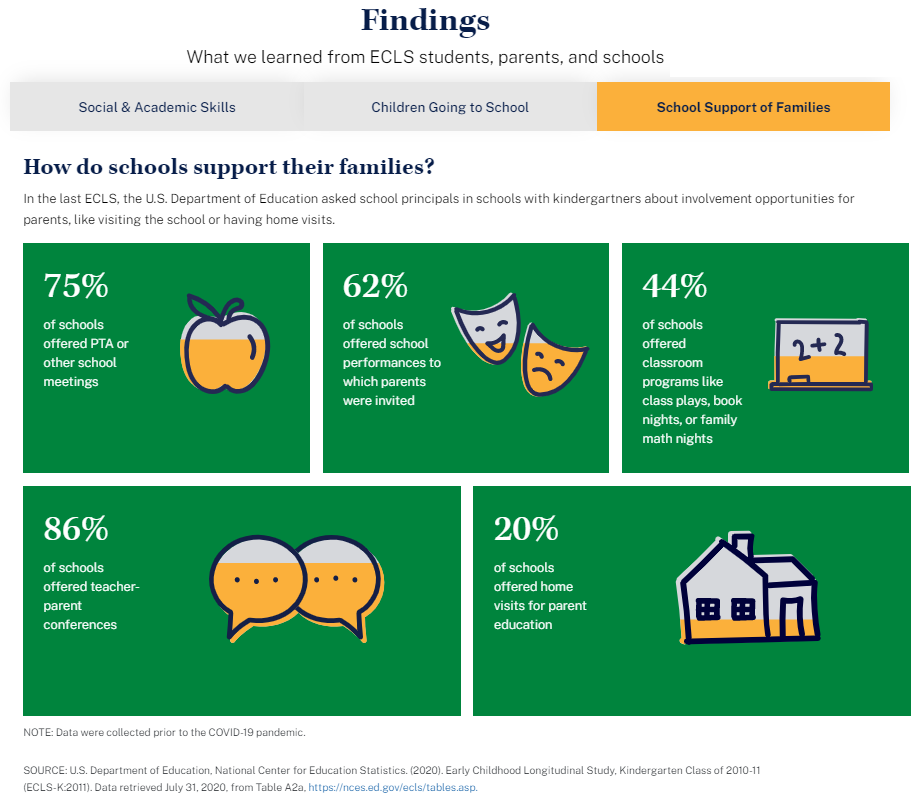
School Support of Families
How do schools support their families?
In the last ECLS, the U.S. Department of Education asked school principals in schools with kindergartners about involvement opportunities for parents, like visiting the school or having home visits.
75% of schools offered PTA or other school meetings
62% of schools offered school performances to which parents were invited
44% of schools offered classroom programs like class plays, book nights, or family math nights
86% of schools offered teacher-parent conferences
20% of schools offered home visits for parent education
NOTE: Data were collected prior to the COVID-19 pandemic.
SOURCE: U.S. Department of Education, National Center for Education Statistics. (2020). Early Childhood Longitudinal Study, Kindergarten Class of 2010-11 (ECLS-K:2011). Data retrieved July 31, 2020, from Table A2a, https://nces.ed.gov/ecls/tables.asp.
Spanish text:
Apoyo de las escuelas a las familias
¿Cómo apoyan las escuelas a las familias?
En el último estudio ECLS, el Departamento de Educación de los EE.UU. les preguntó a los directores de escuelas que tienen niños de kindergarten sobre las oportunidades de participación de los padres y madres, tales como visitar la escuela o ser visitados en el hogar.
75% de las escuelas ofrecían reuniones de la Asociación de padres/madres y maestros (PTA por sus siglas en inglés) u otras reuniones escolares
62% de las escuelas ofrecían representaciones o espectáculos escolares a los cuales los padres están invitados
44% de las escuelas ofrecían programas escolares, como obras de teatro en la clase, noches de libros o noches de matemáticas con la familia
86% de las escuelas ofrecían conferencias entre maestros y padres
20% de las escuelas ofrecían visitas al hogar para la educación de los padres y madres
NOTA: Los datos fueron recopilados antes de la pandemia de COVID-19.
FUENTE: Departamento de Educación de los EE.UU., Centro Nacional para Estadísticas de Educación. (2020). Estudio Longitudinal de la Primera Infancia, Clase de Kindergarten 2010-11 (ECLS-K:2011). Datos extraídos el 31 de julio de 2020, de la tabla A2a, https://nces.ed.gov/ecls/tables.asp.
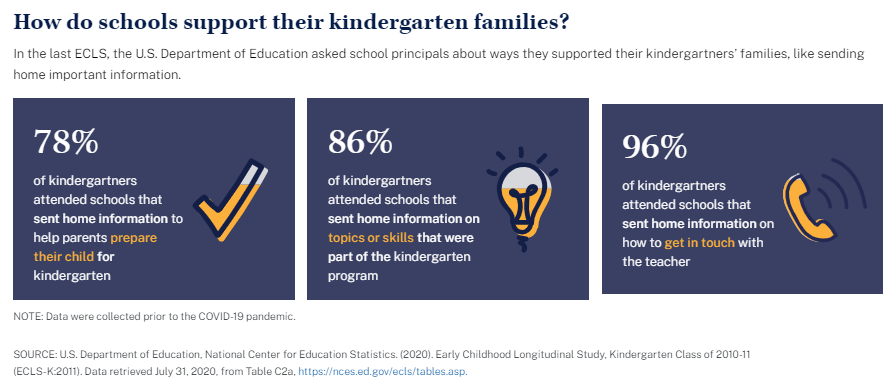
How do schools support their kindergarten families?
In the last ECLS, the U.S. Department of Education asked school principals about ways they support their kindergartners’ families, like sending home important information.
78% of kindergartners attended schools that sent home information to help parents prepare their child for kindergarten
86% of kindergartners attended schools that sent home information on topics or skills that were part of the kindergarten program
96% of kindergartners attended schools that sent home information on how to get in touch with the teacher
NOTE: Data were collected prior to the COVID-19 pandemic.
SOURCE: U.S. Department of Education, National Center for Education Statistics. (2020). Early Childhood Longitudinal Study, Kindergarten Class of 2010-11 (ECLS-K:2011). Data retrieved July 31, 2020, from Table C2a, https://nces.ed.gov/ecls/tables.asp.
Spanish text:
¿De qué manera apoyan las escuelas a sus familias de kindergarten?
En el último estudio ECLS, el Departamento de Educación de los EE.UU. les preguntó a los directores de las escuelas sobre las formas en que apoyaban a las familias de los niños de kindergarten, como por ejemplo, enviando información importante al hogar.
78% de los niños de kindergarten asistían a escuelas que enviaban información a sus hogares para ayudar a los padres y madres a preparar a su niño(a) para el kindergarten
86% de los niños de kindergarten asistían a escuelas que enviaban información a sus hogares sobre temas o habilidades que forman parte del programa de kindergarten
96% de los niños de kindergarten asistían a escuelas que enviaban información a sus hogares sobre cómo ponerse en contacto con el maestro/la maestra
NOTA: Los datos fueron recopilados antes de la pandemia de COVID-19.
FUENTE: Departamento de Educación de los EE.UU., Centro Nacional para Estadísticas de Educación. (2020). Estudio Longitudinal de la Primera Infancia, Clase de Kindergarten 2010-11 (ECLS-K:2011). Datos extraídos el 31 de julio de 2020, de la tabla C2a, https://nces.ed.gov/ecls/tables.asp.
For fall 2024 and spring 2025 (first grade), the infographics will be replaced as follows:
Replace “Social and Academic Skills” with “Positive Learning Behaviors.”
Replace “Children Going to School” with “Participation in Summer Activities.”
Replace “School Support of Families” and “Materials Sent Home” with “School Programs and Services Available to Parents and Families.”
Tabs read: Positive Learning Behaviors, Participation in Summer Activities, School Programs and Services
Spanish tabs read: Comportamientos positivos de aprendizaje, Participación en actividades de verano, Programas y servicios escolares
The first tab displays the “Positive Learning Behaviors” infographics.
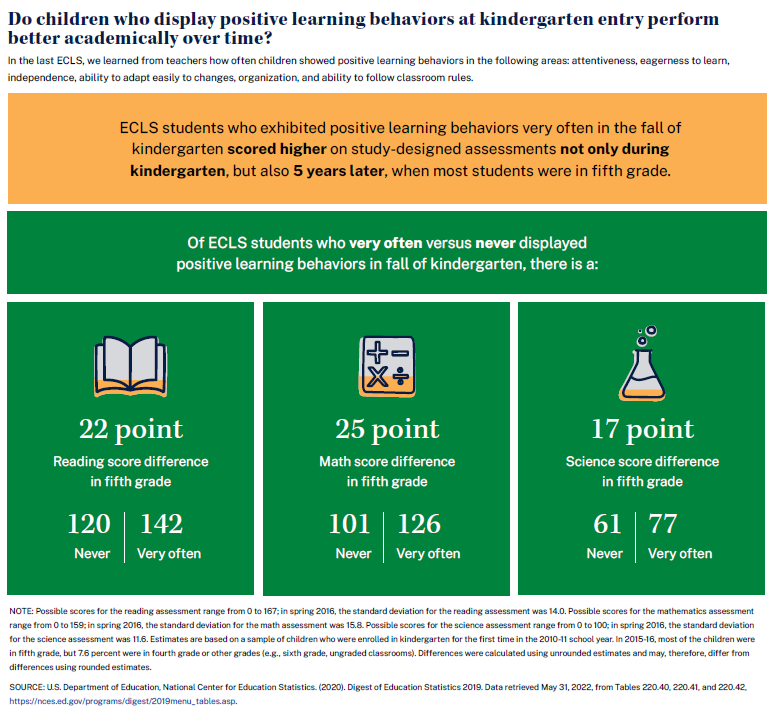
Do children who display positive learning behaviors at kindergarten entry perform better academically over time?
In the last ECLS, we learned from teachers how often children showed positive learning behaviors in the following areas: attentiveness, eagerness to learn, independence, ability to adapt easily to changes, organization, and ability to follow classroom rules.
ECLS students who exhibited positive learning behaviors very often in the fall of kindergarten scored higher on study-designed assessments not only during kindergarten, but also 5 years later, when most students were in fifth grade. Of ECLS students who very often versus never displayed positive learning behaviors in fall of kindergarten, there is a:
22 point Reading score difference in fifth grade
120 Never
142 Very often
25 point Math score difference in fifth grade
101 Never
126 Very often
17 point Science score difference in fifth grade
61 Never
77 Very often
NOTE: Possible scores for the reading assessment range from 0 to 167; in spring 2016, the standard deviation for the reading assessment was 14.0. Possible scores for the mathematics assessment range from 0 to 159; in spring 2016, the standard deviation for the math assessment was 15.8. Possible scores for the science assessment range from 0 to 100; in spring 2016, the standard deviation for the science assessment was 11.6. Estimates are based on a sample of children who were enrolled in kindergarten for the first time in the 2010-11 school year. In 2015-16, most of the children were in fifth grade, but 7.6 percent were in fourth grade or other grades (e.g., sixth grade, ungraded classrooms). Differences were calculated using unrounded estimates and may, therefore, differ from differences using rounded estimates.
NOTE: Data were collected prior to the COVID-19 pandemic.
SOURCE: U.S. Department of Education, National Center for Education Statistics. (2020). Digest of Education Statistics 2019. Data retrieved May 31, 2022, from Tables 220.40, 220.41, and 220.42, https://nces.ed.gov/programs/digest/2019menu_tables.asp.
Spanish Text
¿Los niños que exhiben conductas positivas de aprendizaje al entrar al Kindergarten tienen mejor desempeño académico a lo largo del tiempo?
En el último ECLS, los maestros nos informaron de la frecuencia con que los niños exhibían conductas positivas de aprendizaje en las siguientes áreas: atención, ansias de aprender, independencia, capacidad de adaptarse fácilmente a los cambios, organización y capacidad de seguir las reglas del aula.
Los alumnos del ECLS que exhibían conductas positivas de aprendizaje muy a menudo en el otoño de kindergarten obtuvieron puntuaciones más altas en las evaluaciones diseñadas para el estudio, no sólo durante el kindergarten, sino también 5 años después, cuando la mayoría de los alumnos estaban en quinto grado. Entre los estudiantes de ECLS que exhibían conductas positivas de aprendizaje muy a menudo en otoño de kindergarten y los que nunca las exhibían, hay una diferencia de 22 puntos en el puntaje de Lectura en quinto grado:
22 puntos de diferencia en el puntaje de Lectura en quinto grado
o 120 Nunca
o 142 Muy a menudo
25 puntos de diferencia en Matemáticas en quinto grado
o 101 Nunca
o 126 Muy a menudo
17 puntos de diferencia en Ciencias en 5º curso
o 61 Nunca
o 77 Muy a menudo
NOTA: El puntaje posible para la evaluación de lectura va de 0 a 167; en la primavera de 2016, la desviación estándar para la evaluación de lectura fue de 14.0. El puntaje posible para la evaluación de matemáticas va de 0 a 159; en la primavera de 2016, la desviación estándar para la evaluación de matemáticas fue de 15.8. El puntaje posible en la evaluación de ciencias va de 0 a 100; en la primavera de 2016, la desviación estándar de la evaluación de ciencias fue de 11.6. Estas estimaciones se basan en una muestra de niños que se matricularon en el kindergarten por primera vez en el año escolar 2010-11. En 2015-16, la mayoría de los niños estaban en quinto grado, pero el 7.6% estaba en cuarto grado o en otros grados (por ejemplo, sexto grado, salones sin nivel de grados). Las diferencias se calcularon utilizando estimaciones sin redondear y, por lo tanto, pueden ser distintas a las diferencias que se hacen utilizando estimaciones redondeadas.
NOTA: Los datos fueron recopilados antes de la pandemia de COVID-19.
FUENTE: Departamento de Educación de los EE.UU., Centro Nacional para Estadísticas de Educación. (2020). Compendio de Estadísticas de Educación 2019. Datos extraídos el 31 de mayo de 2022, de las Tablas 220.40, 220.41 y 220.42, https://nces.ed.gov/programs/digest/2019menu_tables.asp.
The second tab displays the “Participation in Summer Activities” infographics.
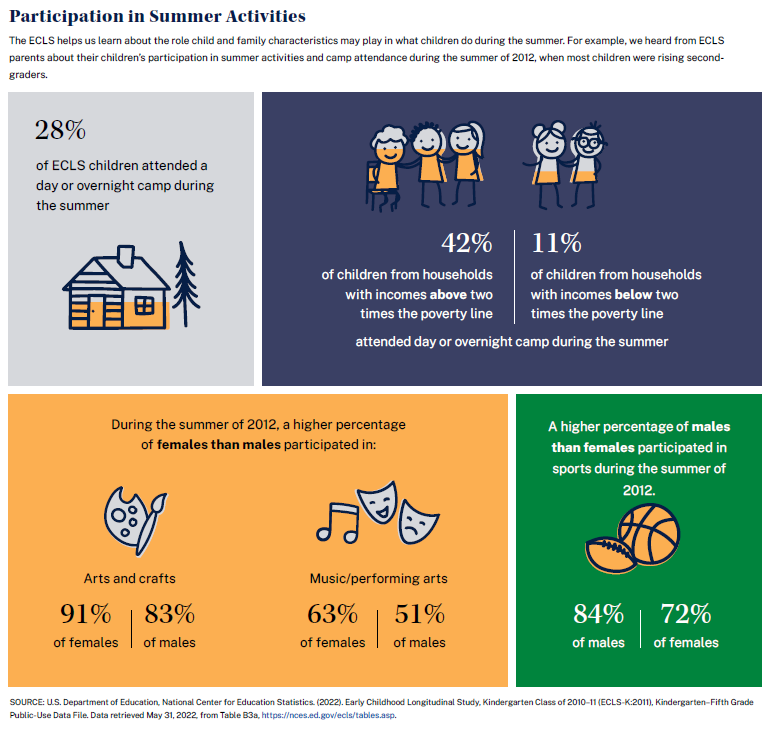
Participation in Summer Activities
The ECLS helps us learn about the role child and family characteristics may play in what children do during the summer. For example, we heard from ECLS parents about their children’s participation in summer activities and camp attendance during the summer of 2012, when most children were rising second-graders.
28% of ECLS children attended a day or overnight camp during the summer
42% of children from households with incomes above two times the poverty line
11% of children from households with incomes below two times the poverty line
Attended day or overnight camp during the summer
During the summer of 2012, a higher percentage of females than males participated in:
Arts and crafts
91% of females
83% of males
Music/performing arts
63% of females
51% of males
A higher percentage of males than females participated in sports during the summer of 2012.
84% of males
72% of females
NOTE: Data were collected prior to the COVID-19 pandemic.
SOURCE: U.S. Department of Education, National Center for Education Statistics. (2022). Early Childhood Longitudinal Study, Kindergarten Class of 2010–11 (ECLS-K:2011), Kindergarten–Fifth Grade Public-Use Data File. Data retrieved May 31, 2022, from Table B3a, https://nces.ed.gov/ecls/tables.asp.
Spanish Text
Participación en actividades de verano
El estudio ECLS nos ayuda a conocer cómo las características del niño y de la familia pueden influir en lo que los niños hacen durante el verano. Por ejemplo, los padres de estudiantes del ECLS nos informaron sobre la participación de sus hijos en actividades de verano y la asistencia a campamentos durante el verano de 2012, cuando la mayoría de los niños estaban por comenzar segundo grado.
el 28% de los niños de ECLS asistieron a un campamento de día o de noche, durante el verano
el 42% de los niños de hogares con ingresos superiores a dos veces el límite de pobreza
el 11% de los niños de hogares con ingresos inferiores a dos veces el límite de pobreza
Asistieron a un campamento de día o de noche durante el verano
Durante el verano de 2012, un mayor porcentaje de mujeres que de hombres participaron en:
Artes y manualidades
91% de las mujeres
83% de los hombres
Música/artes escénicas
63% de mujeres
51% de los hombres
Un mayor porcentaje de hombres que de mujeres participó en deportes durante el verano de 2012.
84% de los hombres
72% de las mujeres
NOTA: Los datos fueron recopilados antes de la pandemia de COVID-19.
FUENTE: Departamento de Educación de los EE.UU., Centro Nacional para Estadísticas de Educación. (2022). Estudio Longitudinal de la Primera Infancia, Clase de Kindergarten de 2010-11 (ECLS-K:2011), Archivo de datos de uso público de Kindergarten a Quinto Grado. Datos extraídos el 31 de mayo de 2022, de la Tabla B3a, https://nces.ed.gov/ecls/tables.asp.
The third tab displays the “School Programs and Services Available to Parents and Families” infographics.
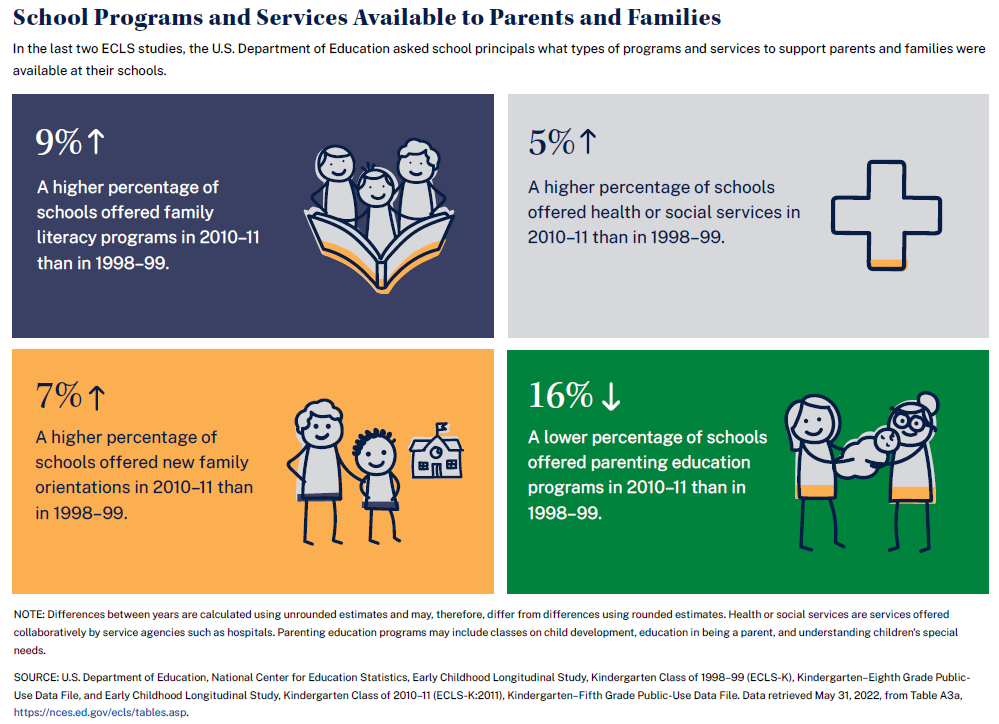
School Programs and Services Available to Parents and Families
In the last two ECLS studies, the U.S. Department of Education asked school principals what types of programs and services to support parents and families were available at their schools.
9% A higher percentage of schools offered family literacy programs in 2010-11 than in 1998-99.
5% A higher percentage of schools offered health or social services in 2010-11 than in 1998-99.
7% A higher percentage of schools offered new family orientations in 2010-11 than in 1998-99.
16% A lower percentage of schools offered parenting education programs in 2010-11 than in 1998-99.
NOTE: Differences between years are calculated using unrounded estimates and may, therefore, differ from differences using rounded estimates. Health or social services are services offered collaboratively by service agencies such as hospitals. Parenting education programs may include classes on child development, education in being a parent, and understanding children's special needs.
NOTE: Data were collected prior to the COVID-19 pandemic.
SOURCE: U.S. Department of Education, National Center for Education Statistics, Early Childhood Longitudinal Study, Kindergarten Class of 1998–99 (ECLS-K), Kindergarten–Eighth Grade Public-Use Data File, and Early Childhood Longitudinal Study, Kindergarten Class of 2010–11 (ECLS-K:2011), Kindergarten–Fifth Grade Public-Use Data File. Data retrieved May 31, 2022, from Table A3a, https://nces.ed.gov/ecls/tables.asp.
Spanish Text
Programas y servicios escolares disponibles para padres/madres y familias
En los últimos dos estudios de ECLS, el Departamento de Educación de los EE.UU. preguntó a los directores de los centros escolares de qué tupos de programas y servicios de apoyo a padres y familias disponían en sus escuelas.
9% Un porcentaje mayor de escuelas ofrecían programas de alfabetización familiar en 2010-11 que en 1998-99.
5% Un porcentaje mayor de escuelas ofrecía servicios de salud o servicios sociales en 2010-11 que en 1998-99.
7% Un porcentaje mayor de escuelas ofrecieron orientación para familias nuevas en 2010-11 que en 1998-99.
16% Un porcentaje menor de escuelas ofrecieron programas de educación para padres en 2010-11 que en 1998-99.
NOTA: Las diferencias entre los años se calcularon utilizando estimaciones sin redondear y, por lo tanto, pueden ser distintas a las diferencias que se calculan utilizando estimaciones redondeadas. Los servicios de salud o sociales son servicios ofrecidos de manera colaborativa por agencias que prestan servicios, tales como los hospitales. Los programas de educación para padres o madres pueden incluir clases sobre desarrollo infantil, educación para criar hijos y comprensión de las necesidades especiales de los niños.
NOTA: Los datos fueron recopilados antes de la pandemia de COVID-19.
FUENTE: Departamento de Educación de los EE.UU., Centro Nacional para Estadísticas de Educación, Estudio Longitudinal de la Primera Infancia, Clase de Kindergarten de 1998-99 (ECLS-K), Archivo de datos de uso público de Kindergarten- Octavo grado, y Estudio Longitudinal de la Primera Infancia, Clase de Kindergarten de 2010-11 (ECLS-K:2011), Archivo de datos de uso público de Kindergarten-quinto grado. Datos extraídos el 31 de mayo de 2022, de la Tabla A3a, https://nces.ed.gov/ecls/tables.asp.
1.5 More Information Section
This section will display a link to the NCES ECLS website, the ECLS-K:2024 Study Overview, the school newsletter, the parent newsletter, and the ECLS-K:2024 video.
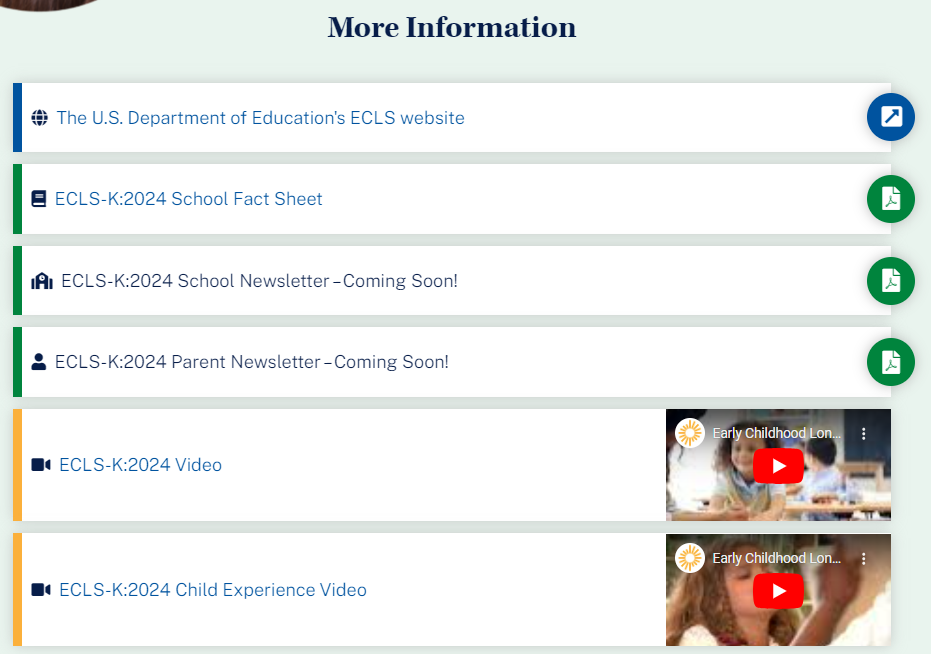
More Information
The U.S. Department of Education’s ECLS website [https://nces.ed.gov/ecls]
ECLS-K:2024 School Fact Sheet [LINK TO FACT SHEET]
ECLS-K:2024 School Newsletter – Coming Soon! [LINK TO MOST RECENT SCHOOL NEWSLETTER]
There will be 4 school newsletters each year: October, January, March, and May, beginning in October 2023. Display a link to the newsletter for the most recent month. We do not need to maintain a library of newsletters on MyECLS.
Until the newsletter is available in October 2023, display “Coming Soon!”
ECLS-K:2024 Parent Newsletter – Coming Soon! [LINK TO MOST RECENT PARENT NEWSLETTER]
There will be 1 parent newsletter each year, beginning in October 2023. Display a link to the newsletter for the most recent year. We do not need to maintain a library of newsletters on MyECLS.
Until the newsletter is available in October 2023, display “Coming Soon!”
ECLS-K:2024 video [LINK TO VIDEO]
ECLS-K:2024 child experience video [LINK TO VIDEO]
Spanish text:
Más información
La página de Internet del estudio ECLS, del Departamento de Educación de los EE.UU. [https://nces.ed.gov/ecls]
Hoja informativa escolar del estudio ECLS-K:2024 [LINK TO FACT SHEET]
Boletín informativo de ECLS-K:2024 para la escuela – !Próximamente! [LINK TO MOST RECENT SCHOOL NEWSLETTER]
Boletín informativo de ECLS-K:2024 para padres y madres – !Próximamente! [LINK TO MOST RECENT PARENT NEWSLETTER]
Video del estudio ECLS-K:2024 [LINK TO VIDEO]
Video de la experiencia de los niños en ECLS-K:2024 [LINK TO VIDEO]
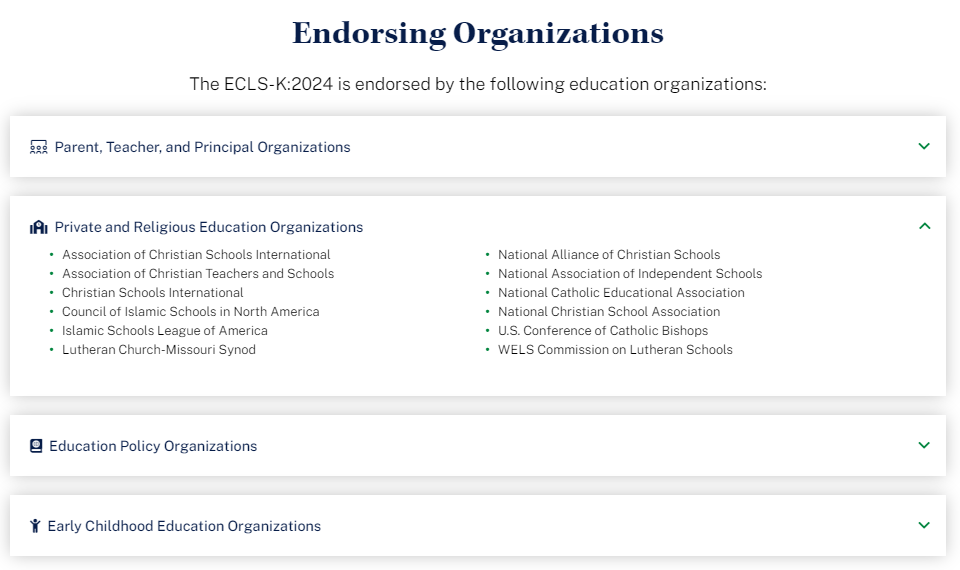
The list of endorsing organizations is divided by type. Each type category is expandable and collapsible.
Endorsing Organizations
The ECLS-K:2024 is endorsed by the following education organizations:
Parent, Teacher, and Principal Organizations
American Federation of Teachers
Association for Middle Level Education
Council for Exceptional Children
International Literacy Association
National Association of Elementary School Principals
National Council of Teachers of Mathematics
National Parent Teacher Association
National Science Teaching Association
Texas State Teachers Association
Private and Religious Education Organizations
Association of Christian Schools International
Association of Christian Teachers and Schools
Christian Schools International
Council of Islamic Schools in North America
Islamic Schools League of America
Lutheran Church-Missouri Synod
National Alliance of Christian Schools
National Association of Independent Schools
National Catholic Educational Association
National Christian School Association
U.S. Conference of Catholic Bishops
WELS Commission on Lutheran Schools
Education Policy Organizations
Alliance for Excellent Education
Council of Chief State School Officers
National Association of State Boards of Education
National School Boards Association
The School Superintendents Association
Early Childhood Education Organizations
American Montessori Society
Association Montessori International/USA
National Institute for Early Education Research
Spanish text:
Organizaciones que respaldan al estudio
El ECLS-K:2024 está respaldado por las siguientes organizaciones educativas:
Organizaciones de padres/madres, maestros y directores
American Federation of Teachers
Association for Middle Level Education
Council for Exceptional Children
International Literacy Association
National Association of Elementary School Principals
National Council of Teachers of Mathematics
National Parent Teacher Association
National Science Teaching Association
Texas State Teachers Association
Organizaciones de educación privada y/o religiosa
Association of Christian Schools International
Association of Christian Teachers and Schools
Christian Schools International
Council of Islamic Schools in North America
Islamic Schools League of America
Lutheran Church-Missouri Synod
National Alliance of Christian Schools
National Association of Independent Schools
National Catholic Educational Association
National Christian School Association
U.S. Conference of Catholic Bishops
WELS Commission on Lutheran Schools
Organizaciones de políticas educativas
Alliance for Excellent Education
Council of Chief State School Officers
National Association of State Boards of Education
National School Boards Association
The School Superintendents Association
Organizaciones de educación de la primera infancia
American Montessori Society
Association Montessori International/USA
National Institute for Early Education Research

This language appears at the bottom of the log-in page, directly on the screen.
Privacy & Authorization
The National
Center for Education Statistics (NCES) is authorized to conduct the
Early Childhood Longitudinal Study (ECLS) by the Education Sciences
Reform Act of 2002 (ESRA 2002, 20 U.S.C. §9543). The data are
being collected for NCES by Westat, a U.S.-based research
organization. All of the information you provide may be used only
for statistical purposes and may not be disclosed, or used, in
identifiable form for any other purpose except as required by law
(20 U.S.C. §9573 and 6 U.S.C. §151). Information from
multiple individuals will be combined to produce statistical
reports; no information that identifies you will be included in any
reports or provided to students, their parents, or other school
staff. By law, every NCES employee as well as every NCES agent, such
as contractors, has taken an oath and is subject to a jail term of
up to 5 years, a fine of $250,000, or both if he or she willfully
discloses ANY identifiable information about respondents. Electronic
submission of each student’s information will be monitored for
viruses, malware, and other threats by Federal employees and
contractors in accordance with the Cybersecurity Enhancement Act of
2015.
According to the Paperwork Reduction Act of 1995,
no persons are required to respond to a collection of information
unless it displays a valid OMB control number. The valid OMB control
number for this voluntary information collection is 1850-0750. If
you have any comments concerning the accuracy of the time estimate,
suggestions for improving this information collection, or any
comments or concerns regarding the status of your individual
submission of these data, please write directly to: Early Childhood
Longitudinal Study, National Center for Education Statistics, PCP,
550 12th St., SW, 4th floor, Washington, DC 20202.
OMB
No. 1850-0750, Approval Expires XX/XX/XXXX
Spanish text:
Privacidad y Autorización
El
Centro Nacional para Estadísticas de Educación (NCES)
está autorizado a hacer el Estudio Longitudinal de la Primera
Infancia (ECLS por sus siglas en inglés) por el Acta de
Reforma de las Ciencias de la Educación de 2002
(ESRA 2002, 20 U.S.C. §9543). La
firma Westat, una organización que realiza estudios y está
basada en los Estados Unidos, está recopilando los datos para
NCES. Toda la
información que usted proporcione podrá usarse
solamente para propósitos estadísticos y no podrá
divulgarse ni usarse de manera que permita identificar a los
participantes para ningún otro propósito, salvo que lo
requiera la ley (20 U.S.C. §9573 y 6
U.S.C. §151). La información recopilada de múltiples
participantes se combinará para producir reportes
estadísticos; ninguna información que pudiera
identificarlo(a) será incluida en ningún reporte ni
será proporcionada a los estudiantes, a sus padres o a otro
personal de la escuela. Por
ley, cada empleado de NCES, al igual que cada agente de NCES -- por
ejemplo, los contratistas -- ha prestado un juramento y puede
recibir una pena de cárcel de hasta 5 años, una multa
de 250.000 dólares o ambas cosas, si revela deliberadamente
CUALQUIER información que permita identificar a los
participantes. En cumplimiento con la Ley de Mejora de la
Ciberseguridad de 2015, habrá empleados y contratistas
federales monitoreando el envío electrónico de la
información de cada estudiante para detectar virus, malware y
otras amenazas.
Según
lo establece el Acta de Reducción del Papeleo de 1995,
ninguna persona está obligada a responder a un pedido de
información si la misma no contiene un número de
control de OMB válido. El número de control de OMB
válido para recolectar esta información que se
proporciona voluntariamente es 1850-0750. Si usted tiene algún
comentario con respecto a la precisión del cálculo de
tiempo, sugerencias para mejorar esta recolección de
información, o cualquier comentario o inquietud acerca del
estatus del envío de sus datos individuales, por favor
escriba directamente a: Early Childhood Longitudinal Study, National
Center for Education Statistics, PCP, 550 12th St., SW, 4th floor,
Washington, DC 20202.
Número OMB. 1850-0750. La
aprobación vence el XX/XX/XXXX
The School Coordinator Portal has three sections: Overview, To Do (which contains links to other tabs), and More Information. Use the navigation icons on the left to skip to each section: Overview, To Do, and More Info.
2.1 Overview Section
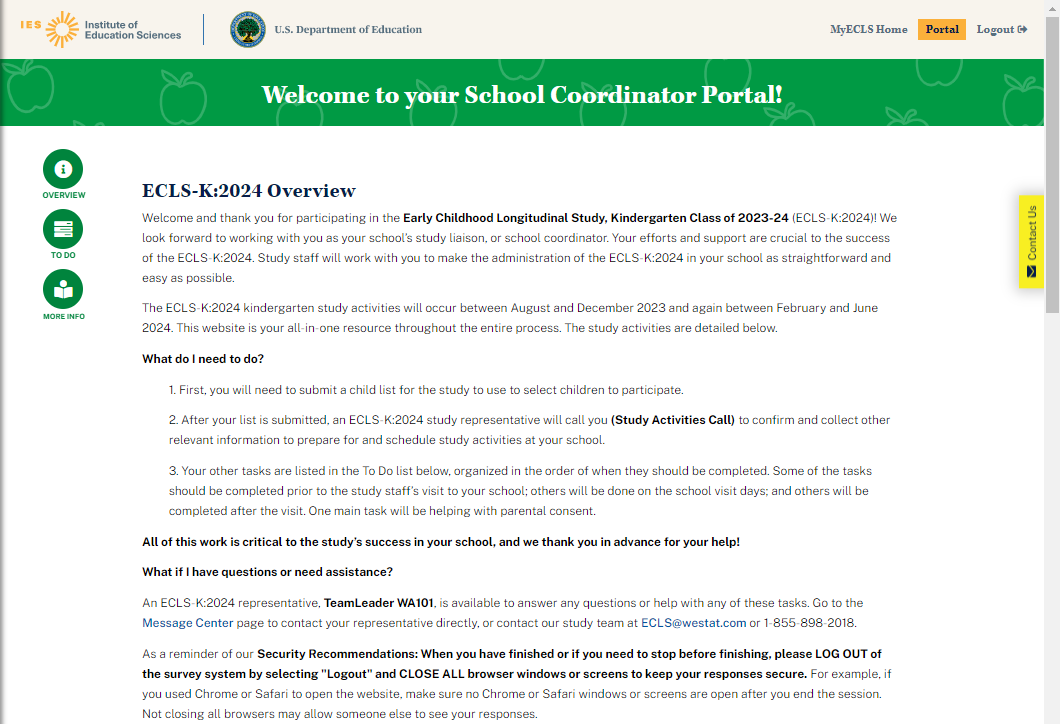
Welcome to your School Coordinator Portal!
ECLS-K:2024 Overview
Welcome and thank you for participating in the Early Childhood Longitudinal Study, Kindergarten Class of 2023-24 (ECLS-K:2024)! We look forward to working with you as your school’s study liaison, or school coordinator. Your efforts and support are crucial to the success of the ECLS-K:2024. Study staff will work with you to make the administration of the ECLS-K:2024 in your school as straightforward and easy as possible.
[DISPLAY IN FALL FIRST GRADE: This fall, we are preparing for our first-grade study activities that will take place between February and June 2025.] [DISPLAY IN SPRING FIRST GRADE: The next phase of ECLS-K:2024 study activities will take place between February and June 2025, when most of the participating children are in first grade.] This website is your all-in-one resource throughout the entire process. The study activities are detailed below.
[DISPLAY IN FALL KINDERGARTEN AND SPRING KINDERGARTEN FOR ORIGINAL SCHOOLS THAT HAVE NOT COMPLETED CHILD SAMPLING: What do I need to do?
First, you will need to submit a child list for the study to use to select children to participate.
After your list is submitted, an ECLS-K:2024 study representative will call you (Study Activities Call) to confirm and collect other relevant information to prepare for and schedule study activities at your school.
Your other tasks are listed in the To Do list below, organized in the order of when they should be completed. Some of the tasks should be completed prior to the study staff’s visit to your school; others will be done on the school visit days; and others will be completed after the visit. One main task will be helping with parental consent.]
[DISPLAY IN SPRING KINDERGARTEN FOR ORIGINAL SCHOOLS THAT COMPLETED CHILD SAMPLING IN A PREVIOUS ROUND AND SPRING FIRST GRADE: What do I need to do?
First, you will receive a package of materials to distribute to teachers and parents of participating children.
After you receive the package, an ECLS-K:2024 study representative will call you (Study Activities Call) to confirm and collect other relevant information to prepare for and schedule study activities at your school.
Your other tasks are listed in the To Do list below, organized in the order of when they should be completed. Some of the tasks should be completed prior to the study staff’s visit to your school; others will be done on the school visit days; and others will be completed after the visit.]
[DISPLAY IN SPRING KINDERGARTEN AND SPRING FIRST GRADE FOR NEW TRANSFER SCHOOLS: What do I need to do?
One or more children who have been participating in the ECLS-K:2024 are attending your school.
An ECLS-K:2024 study representative will call you (Study Activities Call) to confirm and collect information to prepare for and schedule study activities at your school.
Your other tasks are listed in the To Do list below, organized in the order of when they should be completed. Some of the tasks should be completed prior to the study staff’s visit to your school; others will be done on the school visit days; and others will be completed after the visit.]
DISPLAY IN FALL FIRST GRADE: What do I need to do?
An ECLS-K:2024 study representative will call you (Study Activities Call) to confirm and collect information to prepare for and schedule spring 2025 study activities at your school.
Your other tasks are listed in the To Do list below, organized in the order of when they should be completed.]
All of this work is critical to the study’s success in your school, and we thank you in advance for your help!
What if I have questions or need assistance?
An ECLS-K:2024 representative, [DISPLAY TEAM LEADER NAME], is available to answer any questions or help with any of these tasks. Go to the Message Center [DISPLAY LINK] page to contact your representative directly, or contact our study team at [email protected] or 1-855-898-2018.
As a reminder of our Security Recommendations: When you have finished or if you need to stop before finishing, please LOG OUT of the survey system by selecting "Logout" and CLOSE ALL browser windows or screens to keep your responses secure. For example, if you used Chrome or Safari to open the website, make sure no Chrome or Safari windows or screens are open after you end the session. Not closing all browsers may allow someone else to see your responses.
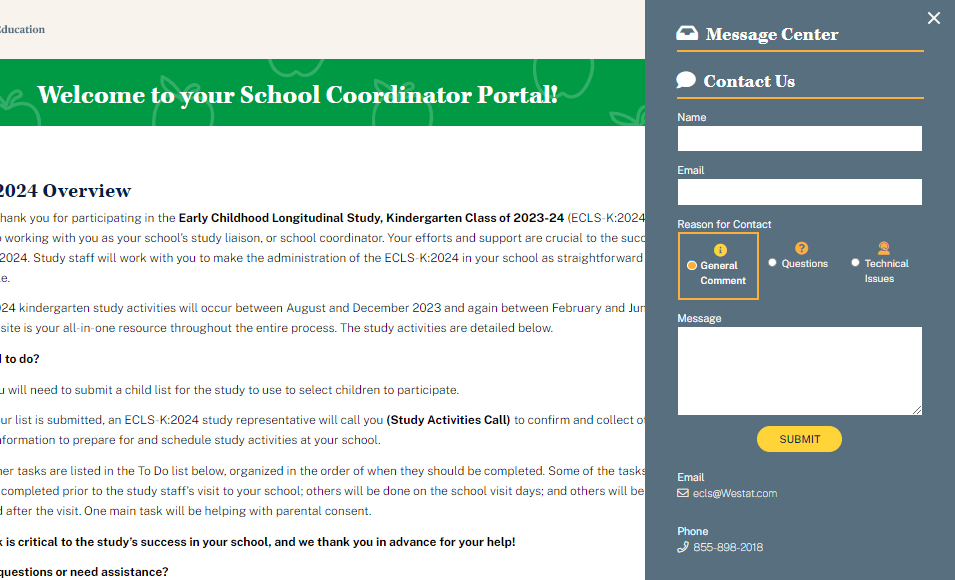
The Contact Us tab displays a link to the Message Center for the School Coordinator role.
2.2 To Do Section
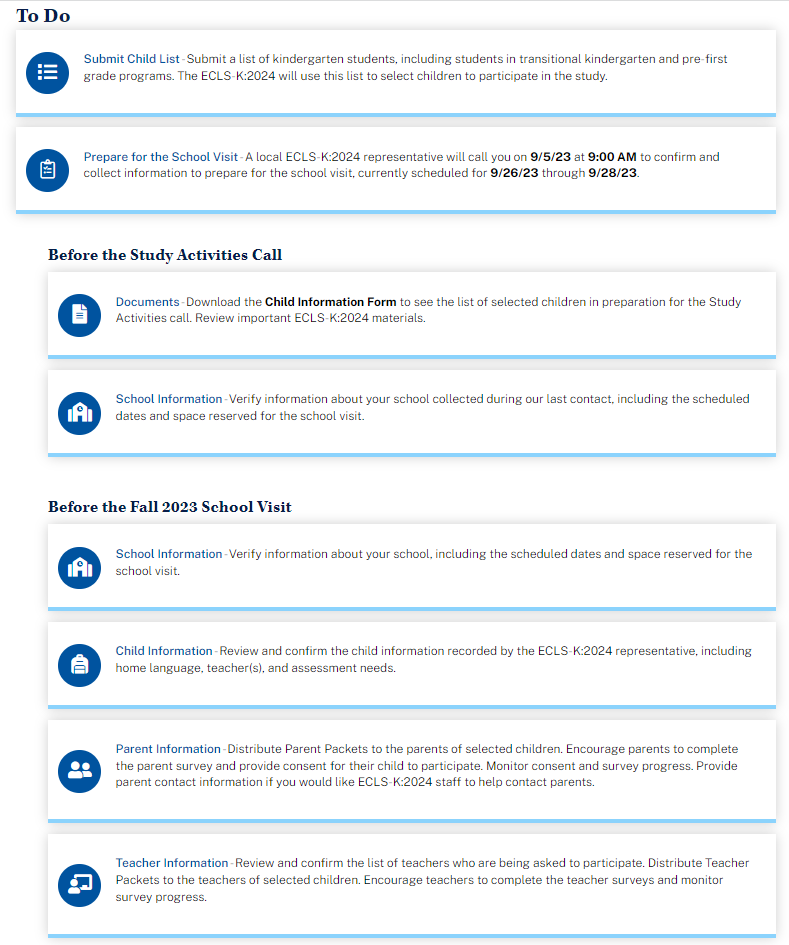
In the fall and spring kindergarten round, only the School Information, Submit Child List, and Documents screens are available prior to the child list being submitted and finalized. Each of the items includes a link to a tab. The details of each tab are displayed on the following pages.
To Do
[DISPLAY IN FALL KINDERGARTEN FOR ALL SCHOOLS AND DISPLAY IN SPRING KINDERGARTEN FOR SCHOOLS THAT HAVE NOT YET COMPLETED CHILD SAMPLING: Submit Child List – Submit a list of kindergarten students, including students in transitional kindergarten and pre-first grade programs. The ECLS-K:2024 will use this list to select children to participate in the study.]
[DISPLAY IN FALL KINDERGARTEN, SPRING KINDERGARTEN: Prepare for the School Visit – A local ECLS-K:2024 representative will call you [on [STUDY ACTIVITIES CALL DATE] at [STUDY ACTIVITIES CALL TIME]] to confirm and collect information to prepare for the school visit[.] / [, currently scheduled for [SCHOOL VISIT START] through [SCHOOL VISIT END].]]
[DISPLAY IN FALL FIRST GRADE: Prepare for the Spring 2025 School Visit – A local ECLS-K:2024 representative will call you to confirm and collect information to prepare for the spring school visit.]
[DISPLAY IN SPRING FIRST GRADE: Prepare for the School Visit – A local ECLS-K:2024 representative will call you to confirm and collect information to prepare for the spring school visit[.] / [, currently scheduled for [SCHOOL VISIT START] through [SCHOOL VISIT END].]]
Before the Study Activities Call
[DISPLAY IN FALL ROUNDS, IN SPRING KINDERGARTEN SCHOOLS THAT WERE NOT PREVIOUSLY SAMPLED, AND AT NEW TRANSFER SCHOOLS IN SPRING KINDERGARTEN: Documents – Download the Child Information Form to see the list of selected children in preparation for the Study Activities call. Review important ECLS-K:2024 materials.]
[DISPLAY IN FALL KINDERGARTEN AND IN SPRING ROUNDS: School Information – Verify information about your school collected during our last contact, including the scheduled dates and space reserved for the school visit.]
[DISPLAY IN FALL FIRST GRADE: School Information – Verify information about your school collected during our last contact.]
[DISPLAY IN SPRING ROUNDS: Child Information – Review and confirm the child information collected during our last contact, including home language, teacher(s), and assessment needs.]
[DISPLAY IN SPRING ROUNDS: Teacher Information – Review and confirm the teacher information collected during our last contact.]
Before the [Fall 2023/Spring 2024/Spring 2025] School Visit
School Information – Verify information about your school, including the scheduled dates and space reserved for the school visit. [SPRING ROUNDS ONLY: Encourage the school administrator to complete the school administrator survey and monitor survey progress.]
Child Information – Review and confirm the child information recorded by the ECLS-K:2024 representative, including home language, teacher(s), and assessment needs.
Parent/Guardian Information – Distribute Parent Packets to the parents/guardians of selected children. Encourage parents to complete the parent survey and provide consent for their child to participate, if necessary. Monitor consent and survey progress. Provide parent contact information if you would like ECLS-K:2024 staff to help contact parents.
Teacher Information – Review and confirm the list of teachers who are being asked to participate. Distribute Teacher Packets to the teachers of selected children. Encourage teachers to complete the teacher surveys and monitor survey progress.
Display “During the School Visit” and “After the School Visit” sections in fall kindergarten, spring kindergarten, and spring first-grade only (content not displayed during fall 2024 advance school contact).
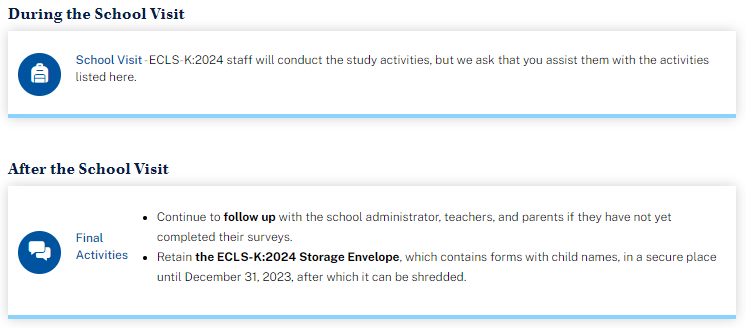
During the School Visit
School Visit – ECLS-K:2024 staff will conduct the study activities, but we ask that you assist them with the activities listed here.
SCHOOL VISIT MODAL
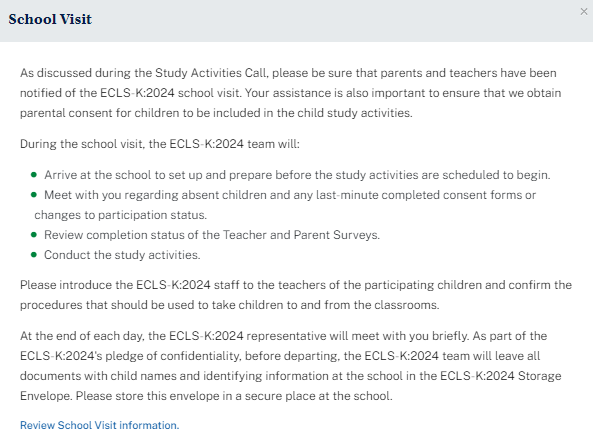
School Visit
As discussed during the Study Activities Call, please be sure that parents and teachers have been notified of the ECLS-K:2024 school visit. [KINDERGARTEN ROUNDS ONLY: Your assistance is also important to ensure that we obtain parental consent for children to be included in the child study activities.]
During the school visit, the ECLS-K:2024 team will:
Arrive at the school to set up and prepare before the study activities are scheduled to begin.
Meet with you regarding absent children and any last-minute completed consent forms or changes to participation status.
Review completion status of the [SPRING ROUNDS ONLY: School Administrator,] Teacher[,] and Parent Surveys.
Conduct the study activities.
Please introduce the ECLS-K:2024 staff to the teachers of the participating children and confirm the procedures that should be used to take children to and from the classrooms.
At the end of each day, the ECLS-K:2024 representative will meet with you briefly. As part of the ECLS-K:2024’s pledge of confidentiality, before departing, the ECLS-K:2024 team will leave all documents with child names and identifying information at the school in the ECLS-K:2024 Storage Envelope. Please store this envelope in a secure place at the school.
Review School Visit information [LINK TO SCHOOL INFO TAB].
After the School Visit
Final Activities –
Continue to follow up with the [SPRING ROUNDS ONLY: school administrator,] teachers[,] and parents if they have not yet completed their surveys.
Retain the ECLS-K:2024 Storage Envelope, which contains forms with child names, in a secure place until [December 31, 2023][ June 30, 2024][ June 30, 2025], after which it can be shredded.
2.3 More Information Section

To learn more about the ECLS-K:2024, please review the following documents or return to the MyECLS home screen for more study information:
School Coordinator Letter [LINK TO LETTER]
School Coordinator Responsibilities [LINK TO RESPONSIBILITIES]
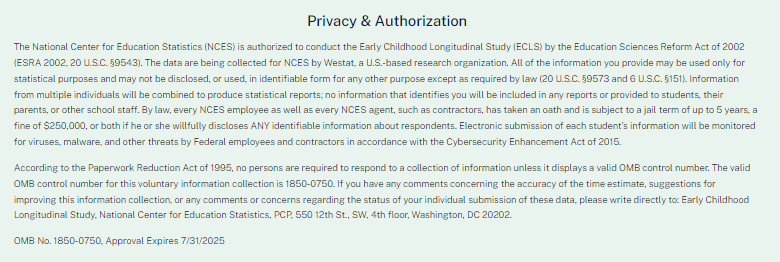
This language appears at the bottom of the School Coordinator Portal page, directly on the screen.
The National Center for Education Statistics (NCES) is authorized to conduct the Early Childhood Longitudinal Study (ECLS) by the Education Sciences Reform Act of 2002 (ESRA 2002, 20 U.S.C. §9543). The data are being collected for NCES by Westat, a U.S.-based research organization. All of the information you provide may be used only for statistical purposes and may not be disclosed, or used, in identifiable form for any other purpose except as required by law (20 U.S.C. §9573 and 6 U.S.C. §151). By law, every NCES employee as well as every NCES agent, such as contractors, has taken an oath and is subject to a jail term of up to 5 years, a fine of $250,000, or both if he or she willfully discloses ANY identifiable information about respondents. Electronic submission of each student’s information will be monitored for viruses, malware, and other threats by Federal employees and contractors in accordance with the Cybersecurity Enhancement Act of 2015.
Information from multiple individuals will be combined to produce statistical reports; no information that identifies you will be included in any reports or provided to students, their parents, or other school staff. According to the Paperwork Reduction Act of 1995, no persons are required to respond to a collection of information unless it displays a valid OMB control number. The valid OMB control number for this voluntary information collection is 1850-0750. If you have any comments concerning the accuracy of the time estimate, suggestions for improving this information collection, or any comments or concerns regarding the status of your individual submission of these data, please write directly to: Early Childhood Longitudinal Study, National Center for Education Statistics, PCP, 550 12th St., SW, 4th floor, Washington, DC 20202.
OMB No. 1850-0750, Approval Expires XX/XX/XXXX
2.4 To Do Tabs
When a user clicks on a tab in the To Do Section, a box with tabs that match the links in that section appears. Users can click on each tab to see detailed instructions. (They can also click on the links in the To Do section to display that particular tab.)
SUBMIT CHILD LIST TAB
The Submit Child List tab will display in fall kindergarten. It will display in spring kindergarten only for schools where children have not yet been sampled.
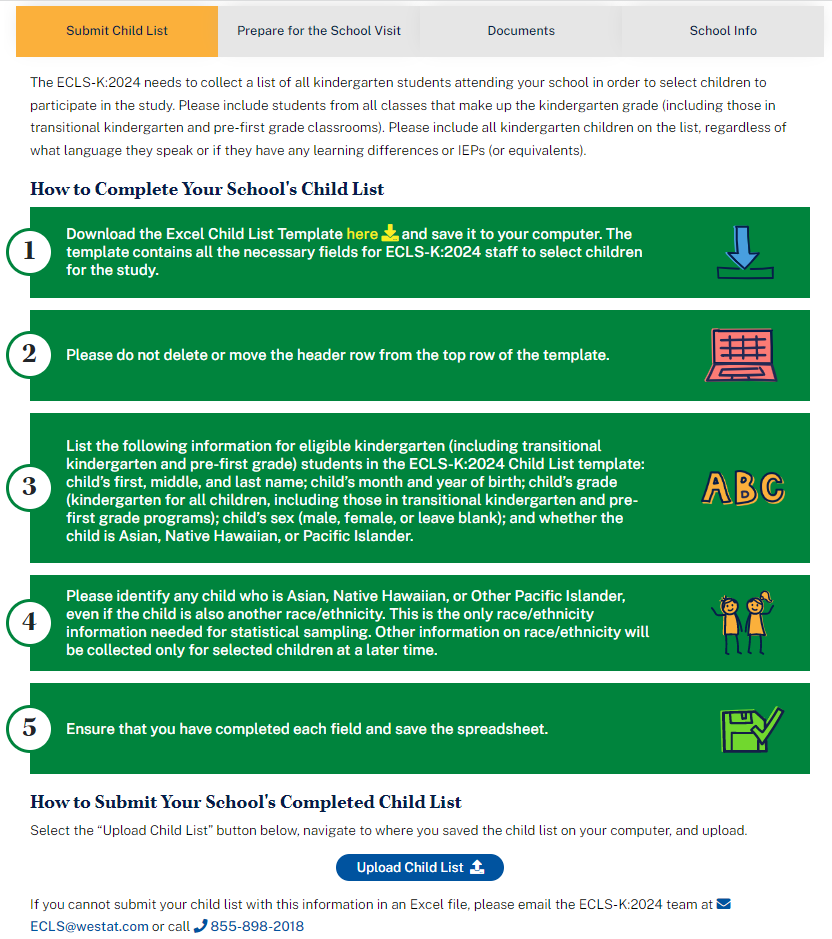
The ECLS-K:2024 needs to collect a list of all kindergarten students attending your school in order to select children to participate in the study. Please include students from all classes that make up the kindergarten grade (including those in transitional kindergarten and pre-first grade classrooms). Please include all kindergarten children on the list, regardless of what language they speak or if they have any learning differences or IEPs (or equivalents).
How to Complete Your School’s Child List
Download the Excel Child List Template here [DISPLAY LINK] and save it to your computer. The template contains all the necessary fields for ECLS-K:2024 staff to select children for the study.
Please do not delete or move the header row from the top row of the template.
List the following information for eligible kindergarten (including transitional kindergarten and pre-first grade) students in the ECLS-K:2024 Child List template: child’s first, middle, and last name; child’s month and year of birth; child’s grade (kindergarten for all children, including those in transitional kindergarten and pre-first grade programs); child’s sex (male, female, or leave blank); and whether the child is Asian, Native Hawaiian, or Pacific Islander.
Please identify any child who is Asian, Native Hawaiian, or Other Pacific Islander, even if the child is also another race/ethnicity. This is the only race/ethnicity information needed for statistical sampling. Other information on race/ethnicity will be collected only for selected children at a later time.
Ensure that you have completed each field and save the spreadsheet.
How to Submit your School’s Completed Child List
Select the “Upload Child List” button below, navigate to where you saved the child list on your computer, and upload.
Display “Upload Child List” button. Selecting the “Upload Child List” button allows the user to browse his or her saved files and choose one to upload.
If you cannot submit your child list in an Excel file, please email the ECLS-K:2024 team at [email protected] or call 855-898-2018.
The Child List Template is a spreadsheet with a header row displaying labels for the following columns (required fields are indicated with an asterisk):
Child First Name*
Child Middle Name
Child Last Name*
Month of Birth
Year of Birth
Grade*
Sex
Asian, Native Hawaiian, or Other Pacific Islander?*
Child First Name |
Child Middle Name |
Child Last Name |
Month of Birth |
Year of Birth |
Grade |
Sex |
Asian, Native Hawaiian, or Other Pacific Islander? |
Ted |
Brian |
Brooks |
5 |
2018 |
K |
M |
N |
Validation Messages for Child List
Variable |
Values / Messages |
Initial Submission of Child List |
|
Child List is missing required columns |
”Your file may be missing some information. Please confirm that your file includes columns for child’s first middle, and last name; child’s month and year of birth; child’s sex; and whether the child is Asian, Native Hawaiian, or Pacific Islander. Select Start Over to correct and upload your list again.” |
First Name |
Hard Edit Check if Missing: "Please provide a first and last name or unique identifier in each name column for each child on the list. Select Start Over to correct and upload your list again." |
Last Name |
Hard Edit Check if Missing: "Please provide a first and last name or unique identifier in each name column for each child on the list. Select Start Over to correct and upload your list again." |
Year of Birth |
2016 - 2019 (age 3 to 7); |
Month of Birth |
1-12; |
Grade |
Hard Edit Check if missing: "Please provide
a grade for each child on the list. In 2023-24, each child should
be listed as in kindergarten. Record students in transitional
kindergarten and pre-first grade classrooms as in kindergarten.
Select Start Over to correct and upload your list again." |
Asian, Native Hawaiian, or Other Pacific Islander |
Hard Edit Check if Missing: "Please
indicate whether each child is Asian, Native Hawaiian, or Other
Pacific Islander. Type 'NA' if this information is not available.
Select Start Over to update and upload your list again." |
The following text will display on the screen once the list is submitted successfully.

Your list has been submitted successfully!
Thank you for submitting your school’s Child List. That’s all we need for now! You will receive an email when the list of selected children has been uploaded to the system. You may log out now or continue to explore the portal.
If you would like to modify your submission or have problems with your list, please contact the ECLS-K:2024 team at [email protected] or 855-898-2018.
PREPARE FOR SCHOOL VISIT TAB
Note that links to Child Info, Parent Info, and Teacher Info pages display after children have been sampled. Prior to sampling, these pages do not display data.
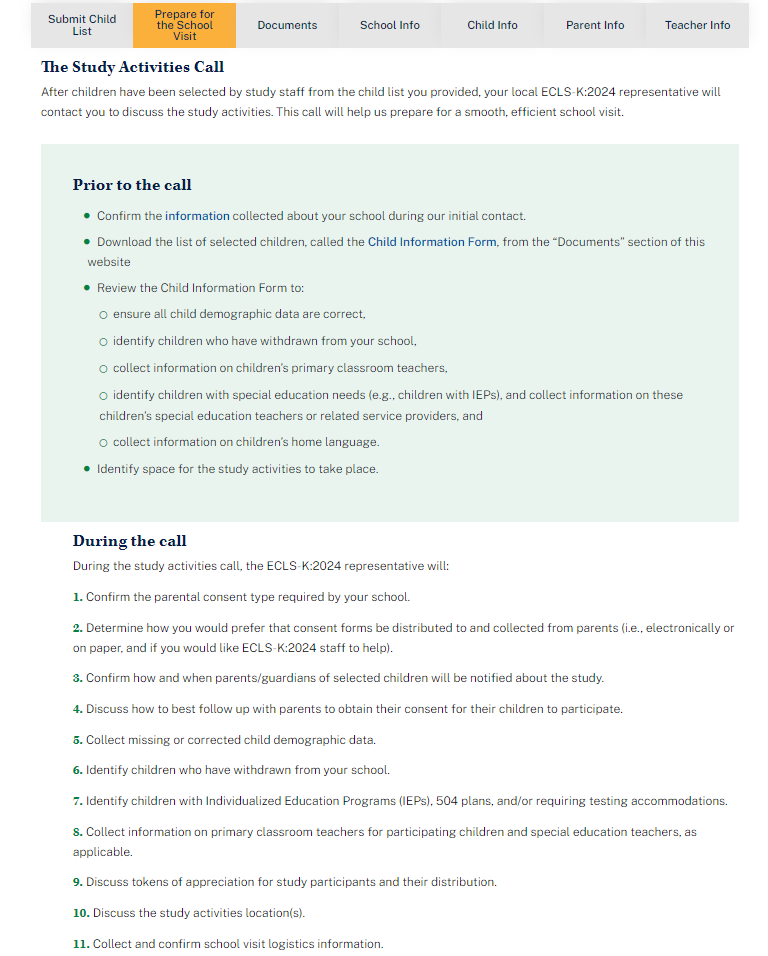
The Study Activities Call
[IN FALL KINDERGARTEN AND IN SPRING KINDERGARTEN SCHOOLS THAT DID NOT PREVIOUSLY HAVE CHILDREN SAMPLED, DISPLAY: After children have been selected by study staff from the child list you provided, your local ECLS-K:2024 representative will contact you to discuss the study activities. This call will help us prepare for a smooth, efficient school visit.]
[IN SPRING KINDERGARTEN SCHOOLS THAT HAD CHILDREN SAMPLED IN THE FALL AND IN NEW SPRING KINDERGARTEN TRANSFER SCHOOLS, DISPLAY: Your local ECLS-K:2024 representative will contact you to discuss the spring kindergarten study activities.]
[IN FALL FIRST GRADE, DISPLAY: An ECLS-K:2024 representative will contact you to collect information on the participating children and discuss the study activities that will take place in the spring.]
[IN SPRING FIRST GRADE, DISPLAY: Your local ECLS-K:2024 representative will contact you to discuss the spring study activities.]
Prior to the call
[IN FALL KINDERGARTEN AND IN SPRING KINDERGARTEN SCHOOLS THAT DID NOT PREVIOUSLY HAVE CHILDREN SAMPLED, DISPLAY:
Confirm the information [DISPLAY LINK TO SCHOOL INFO TAB] collected about your school during our initial contact.
Download the list of selected children, called the Child Information Form [DISPLAY LINK TO CHILD INFORMATION FORM], from the “Documents” section of this website.
Review the Child Information Form to:
ensure all child demographic data are correct,
identify children who have withdrawn from your school,
collect information on children’s primary classroom teachers,
identify children with special education needs (e.g., children with IEPs), and collect information on these children’s special education teachers or related service providers, and
collect information on children’s home language.
Identify space for the study activities to take place.]
[IN SPRING KINDERGARTEN SCHOOLS THAT HAD CHILDREN SAMPLED IN THE FALL AND IN NEW TRANSFER SCHOOLS IN SPRING KINDERGARTEN, DISPLAY:
Confirm the information [DISPLAY LINK TO SCHOOL INFO TAB] collected about your school during our last contact, including the space for the study activities to take place.
Review the Child Information [DISPLAY LINK TO CHILD INFO TAB] to:
ensure all child demographic data are correct,
identify children who have withdrawn from your school, and
confirm children’s special education needs (e.g., IEPs).
Review the Teacher Information [DISPLAY LINK TO TEACHER INFO TAB] to confirm children’s primary classroom and, as appropriate, special education teachers or related services providers]
[IN FALL FIRST GRADE, DISPLAY:
Confirm the information [DISPLAY LINK TO SCHOOL INFO TAB] collected about your school during our last contact.
Review the child information [DISPLAY LINK TO CHILD INFO TAB] to:
ensure all child demographic data and home language are correct,
identify children who have withdrawn from your school,
collect information on children’s primary classroom teachers, and
identify children with special education needs (e.g., children with IEPs), and collect information on these children’s special education teachers or related service providers.
Identify space for the study activities to take place.]
[IN SPRING FIRST GRADE, DISPLAY FOR SCHOOLS THAT PARTICIPATED IN PREVIOUS ROUNDS:
Receive a FedEx package with your instructions, a school administrator packet, parent packet(s), and teacher packet(s).
Confirm the information [DISPLAY LINK TO SCHOOL INFO TAB] collected about your school during our last contact, including the space for the study activities to take place.
Review the child information [DISPLAY LINK TO CHILD INFO TAB] to:
ensure all child demographic data are correct,
identify children who have withdrawn from your school, and
confirm children’s special education needs (e.g., IEPs).
Review the teacher information [DISPLAY LINK TO TEACHER INFO TAB] to confirm children’s primary classroom and, as appropriate, special education teachers or related services providers.]
[IN SPRING FIRST GRADE, DISPLAY FOR NEW TRANSFER SCHOOLS:
Confirm the information [DISPLAY LINK TO SCHOOL INFO TAB] collected about your school during our last contact, including the space for the study activities to take place.
Review the child information [DISPLAY LINK TO CHILD INFO TAB] to:
During the call
[IN FALL KINDERGARTEN AND IN SPRING KINDERGARTEN SCHOOLS THAT DID NOT PREVIOUSLY HAVE CHILDREN SAMPLED, DISPLAY:
During the study activities call, the ECLS-K:2024 representative will:
Confirm the parental consent type required by your school.
Determine how you would prefer that consent forms be distributed to and collected from parents (i.e., electronically or on paper, and if you would like ECLS staff to help).
Confirm how and when parents/guardians of selected children will be notified about the study.
Discuss how to best follow up with parents to obtain their consent for their children to participate.
Collect missing or corrected child demographic data.
Identify children who have withdrawn from your school.
Identify children with Individualized Education Programs (IEPs), 504 plans, and/or requiring testing accommodations.
Collect information on primary classroom teachers for participating children and special education teachers, as applicable.
Discuss tokens of appreciation for study participants and their distribution.
Discuss the study activities location(s).
Collect and confirm school visit logistics information.]
[IN SPRING KINDERGARTEN SCHOOLS THAT HAD CHILDREN SAMPLED IN THE FALL, DISPLAY:
During the study activities call, the ECLS-K:2024 representative will:
Collect missing or corrected child demographic data.
Identify children who have withdrawn from your school.
Confirm children’s Individualized Education Programs (IEPs), 504 plans, and/or requiring testing accommodations.
Confirm or collect information on primary classroom teachers for participating children and special education teachers, as applicable.
Discuss tokens of appreciation for study participants and their distribution.
Discuss the study activities location(s).
Collect and confirm school visit logistics information.]
[IN FALL FIRST GRADE, DISPLAY:
During the study activities call, the ECLS-K:2024 representative will:
Collect missing or corrected child demographic data.
Identify children who have withdrawn from your school.
Identify children with Individualized Education Programs (IEPs), 504 plans, and/or requiring testing accommodations.
Collect information on primary classroom teachers for participating children and special education teachers, as applicable.
Discuss logistics for the spring school visit, including the location for study activities.]
[IN SPRING FIRST GRADE, DISPLAY:
During the study activities call, the ECLS-K:2024 representative will:
Collect missing or corrected child demographic data.
Identify children who have withdrawn from your school.
Confirm children’s Individualized Education Programs (IEPs), 504 plans, and/or required testing accommodations.
Confirm or collect information on primary classroom teachers for participating children and special education teachers, as applicable.
Discuss tokens of appreciation for study participants and their distribution.
Discuss the study activities location(s).
Collect and confirm school visit logistics information.]
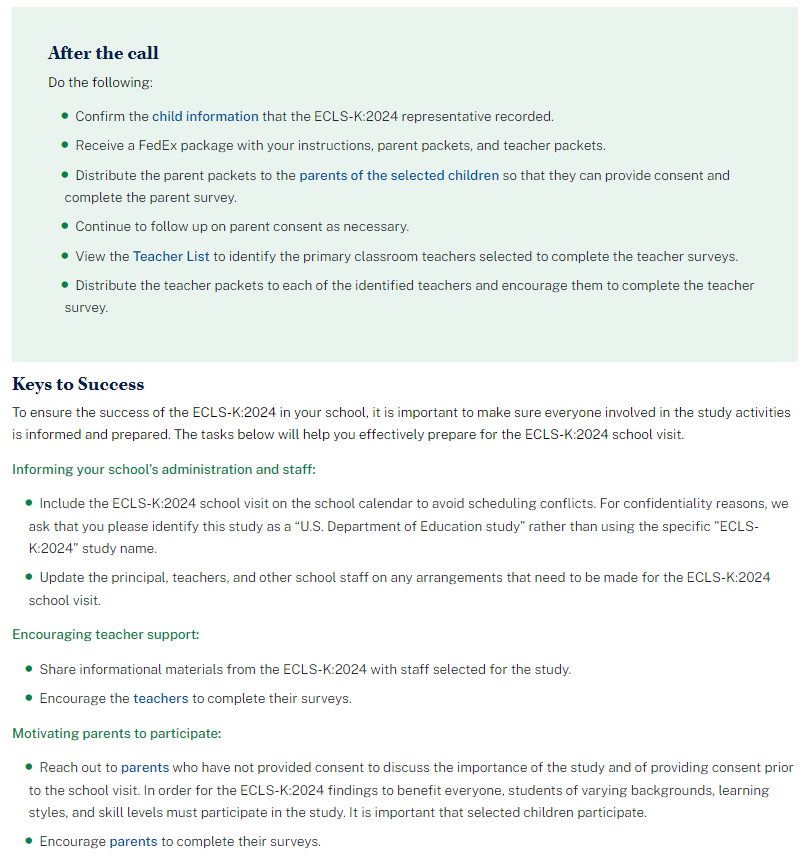
After the Call:
Do the following:
[DISPLAY FOR NEW TRANSFER SCHOOLS: Receive a FedEx package with your instructions, a school administrator packet, parent packet(s), and teacher packet(s).]
Confirm the child information [DISPLAY LINK TO CHILD INFO TAB] that the ECLS-K:2024 representative recorded.
Distribute the parent packets to the parents of the selected children [DISPLAY LINK TO PARENT INFO TAB] so that they can provide consent, if necessary, and complete the parent survey.
[FALL KINDERGARTEN AND SPRING KINDERGARTEN SCHOOLS THAT DID NOT HAVE CHILDREN SAMPLED PREVIOUSLY:] Continue to follow up on parent consent as necessary.
View the Teacher List [DISPLAY LINK TO TEACHER INFO TAB] to identify the primary classroom [SPRING ROUNDS ONLY: and special education teachers] selected to complete the teacher surveys.
[SPRING ROUNDS ONLY: Distribute a school administrator packet to the school administrator and encourage him or her to complete the survey.]
Distribute the teacher packets to each of the identified teachers and encourage them to complete the teacher survey.
Keys to Success:
To ensure the success of the ECLS-K:2024 in your school, it is important to make sure everyone involved in the study activities is informed and prepared. The tasks below will help you effectively prepare for the ECLS-K:2024 school visit.
Informing your school’s administration and staff:
Include the ECLS-K:2024 school visit on the school calendar to avoid scheduling conflicts. For confidentiality reasons, we ask that you please identify this study as a “U.S. Department of Education study” rather than using the specific “ECLS-K:2024” study name.
Update the principal, teachers, and other school staff on any arrangements that need to be made for the ECLS-K:2024 school visit.
Encouraging [SPRING ROUNDS ONLY: school administrator and] teacher support:
Share informational materials from the ECLS-K:2024 with staff selected for the study.
Encourage the [SPRING ROUNDS ONLY: school administrator [DISPLAY LINK TO SCHOOL INFO TAB] and] teachers [DISPLAY LINK TO TEACHER INFO TAB] to complete their surveys.
Motivating parents to participate:
Reach out to parents [DISPLAY LINK TO PARENT INFO TAB] who have not provided consent to discuss the importance of the study and of providing consent prior to the school visit. In order for the ECLS-K:2024 findings to benefit everyone, students of varying backgrounds, learning styles, and skill levels must participate in the study. It is important that selected children participate.
Encourage parents [DISPLAY LINK TO PARENT INFO TAB] to complete their surveys.
DOCUMENTS TAB [DISPLAY ONLY IN KINDERGARTEN ROUNDS.]
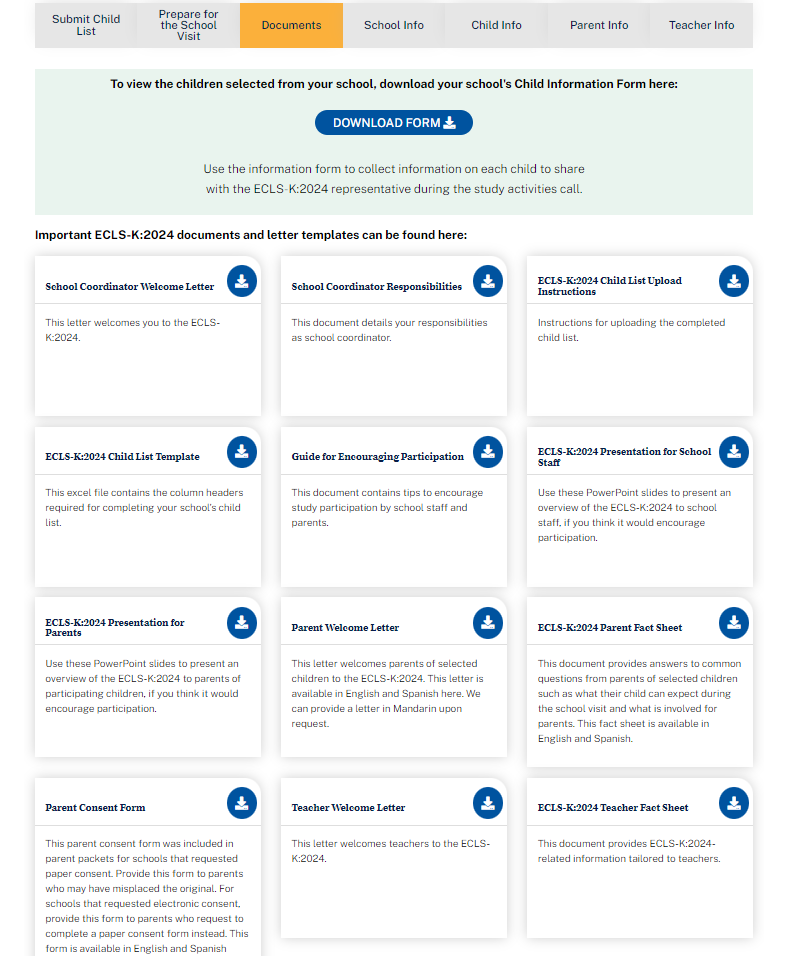
[FALL ROUNDS AND SPRING KINDERGARTEN SCHOOLS THAT DID NOT HAVE CHILDREN SAMPLED IN THE FALL AND NEW TRANSFER SCHOOLS: To view the children selected from your school, download your school's Child Information Form here: DISPLAY DOWNLOAD FORM BUTTON. Use the information form to collect information on each child to share with the ECLS-K:2024 representative during the study activities call.
The Child Information Form is a spreadsheet displaying a table with prefilled information on selected children from the uploaded child list, plus empty columns* in fall kindergarten and spring kindergarten schools that did not have children sampled in the fall and new transfer schools for the school coordinator (SC) to collect additional information:
Child last name
Child first name
ECLS Child ID
Child month of birth (ORIGINAL KINDERGARTEN SCHOOLS ONLY)
Child year of birth (ORIGINAL KINDERGARTEN SCHOOLS ONLY)
Child sex (ORIGINAL KINDERGARTEN SCHOOLS ONLY)
Child grade
Child ethnicity*(ORIGINAL KINDERGARTEN SCHOOLS ONLY)
Child race*(ORIGINAL KINDERGARTEN SCHOOLS ONLY)
Child’s home language*
Primary classroom teacher name*
Classroom*
Teacher email address*
Accommodations needed?*]
Important ECLS-K:2024 documents and letter templates can be found here:
File Name |
Description |
School Coordinator Welcome Letter |
This letter welcomes you to the ECLS-K:2024. |
School Coordinator Responsibilities |
This document details your responsibilities as school coordinator. |
ECLS-K:2024 Child List Upload Instructions |
Instructions for uploading the completed child list. |
ECLS-K:2024 Child List Template |
This excel file contains the column headers required for completing your school’s child list. |
Guide for Encouraging Participation |
This document contains tips to encourage study participation by school staff and parents. |
FALL AND SPRING KINDERGARTEN ONLY: ECLS-K:2024 Presentation for School Staff |
Use these PowerPoint slides to present an overview of the ECLS-K:2024 to school staff, if you think it would encourage participation. |
FALL AND SPRING KINDERGARTEN ONLY: ECLS-K:2024 Presentation for Parents |
Use these PowerPoint slides to present an overview of the ECLS-K:2024 to parents of participating children, if you think it would encourage participation. |
SPRING KINDERGARTEN AND SPRING FIRST GRADE ONLY: School Administrator Survey Worksheet |
This worksheet presents an overview of the School Administrator Survey so that the school administrator can see what kinds of questions will be asked, in case he or she would like another knowledgeable school staff member to help complete portions of the survey. |
FALL AND SPRING KINDERGARTEN ONLY: Parent Welcome Letter |
This letter welcomes parents of selected children to the ECLS-K:2024. This letter is available in English and Spanish here. We can provide a letter in Mandarin upon request. |
ECLS-K:2024 Parent Fact Sheet |
This document provides answers to common questions from parents of selected children such as what their child can expect during the school visit and what is involved for parents. This fact sheet is available in English and Spanish. |
FALL AND SPRING KINDERGARTEN ONLY: Parent Consent Form [EXPLICIT OR IMPLICIT DEPENDING ON THE SCHOOL’S CHOICE ON THE SCHOOL INFO SCREEN] |
This parent consent form was included in parent packets for schools that requested paper consent. Provide this form to parents who may have misplaced the original. For schools that requested electronic consent, provide this form to parents who request to complete a paper consent form instead. This form is available in English and Spanish here. We can provide a form in Mandarin upon request. |
Teacher Welcome Letter |
This letter welcomes teachers to the ECLS-K:2024. |
ECLS-K:2024 Teacher Fact Sheet |
This document provides ECLS-K:2024-related information tailored to teachers. |
SCHOOL INFORMATION TAB
The School Information (“School Info”) tab has three sections, which can be expanded and collapsed: School Information, School Administrator Survey Status (spring rounds only), and School Visit Information.
SCHOOL INFORMATION SECTION
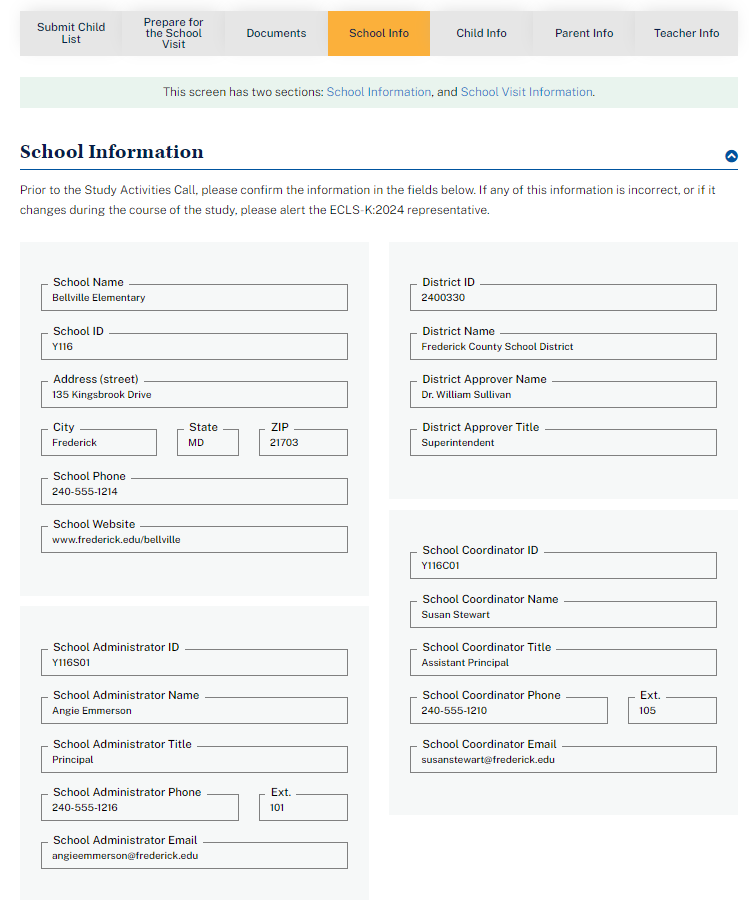
Display information prefilled from the previous round.
This screen has [two/three] sections: School Information[, SPRING ROUNDS ONLY: School Administrator Survey,] and School Visit Information.
School Information
Prior to the Study Activities Call, please confirm the information in the fields below. If any of this information is incorrect, or if it changes during the course of the study, please alert the ECLS-K:2024 representative.
School Name
School ID
Address (street, city, state, ZIP)
School Phone
School Website
District fields. Do not display if the school is private.
District ID
District Name
District Approver Name
District Approver Title
School Administrator ID
School Administrator Name
School Administrator Title
School Administrator Phone
School Administrator Phone ext.
School Administrator Email
School Coordinator ID
School Coordinator Name
School Coordinator Title
School Coordinator Phone
School Coordinator Phone ext.
School Coordinator Email
[DISPLAY IN SPRING ROUNDS ONLY: SCHOOL ADMINISTRATOR SURVEY STATUS SECTION (with example text):]
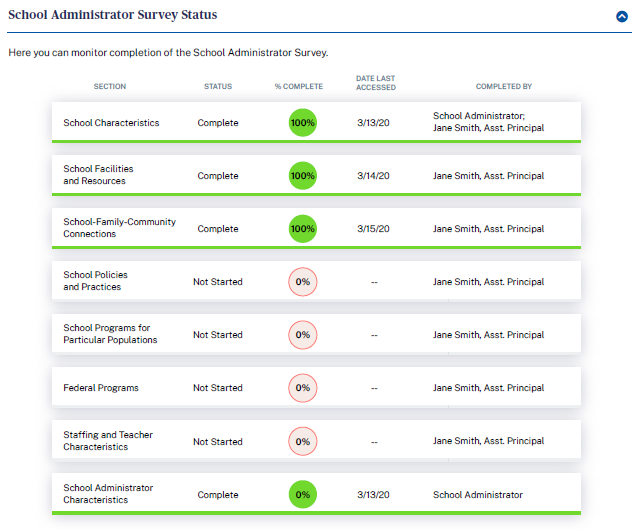
School Administrator Survey Status
Here you can monitor completion of the School Administrator Survey.
Section |
Status |
% Complete |
Date Last Accessed |
Completed by |
|
Complete |
100% |
4/13/24 |
School Administrator; Other School Staff: Jane Smith, Assistant Principal |
|
Complete |
100% |
4/14/24 |
Other School Staff: Jane Smith, Assistant Principal |
|
In-progress |
50% |
4/15/24 |
|
|
Not started |
0% |
|
|
|
Not started |
0% |
|
|
|
Not started |
0% |
|
|
|
Not started |
0% |
|
|
|
Complete |
100% |
4/13/24 |
School Administrator |
SCHOOL VISIT INFORMATION SECTION (with example text):

School Visit Information
Display information recorded by the ECLS-K:2024 representative.
FALL KINDERGARTEN AND SPRING KINDERGARTEN SCHOOLS WITH CHILDREN NOT SAMPLED PREVIOUSLY: Consent Type: Explicit or Implicit
FALL KINDERGARTEN AND SPRING KINDERGARTEN SCHOOLS WITH CHILDREN NOT SAMPLED PREVIOUSLY: Consent Collection Mode: Electronic or Paper
FALL KINDERGARTEN AND SPRING KINDERGARTEN SCHOOLS WITH CHILDREN NOT SAMPLED PREVIOUSLY: Consent Distribution Method: ECLS-K:2024 Staff or School Staff
First day of School Visit
Last day of School Visit
School Visit Arrival Time
CHILD INFORMATION TAB
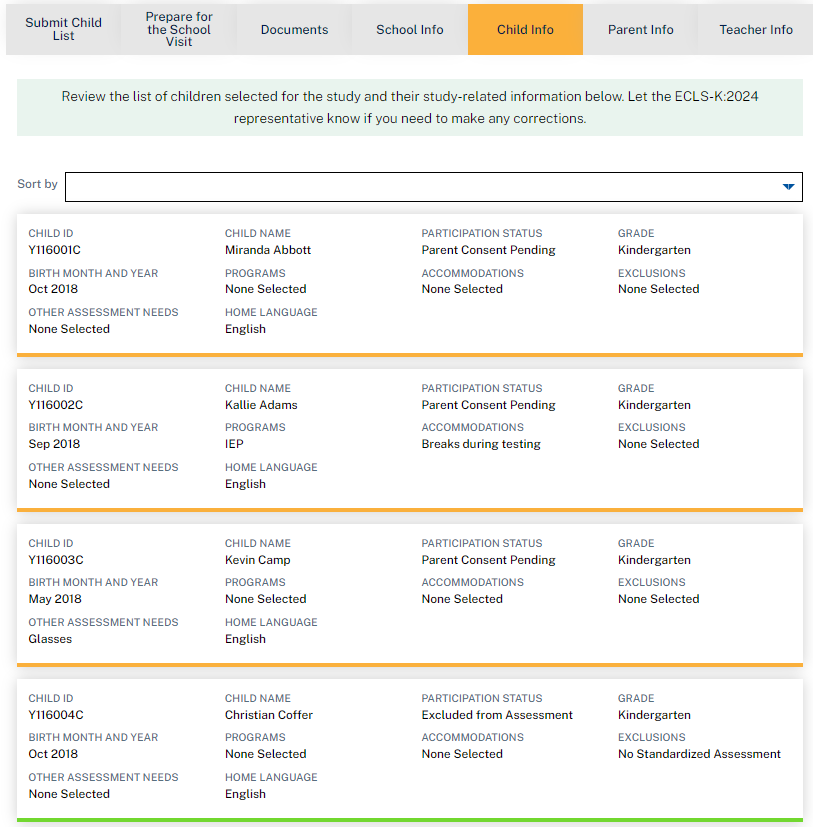
Review the list of children [FALL KINDERGARTEN AND SPRING KINDERGARTEN IN SCHOOLS THAT DID NOT HAVE CHILDREN SAMPLED PREVIOUSLY: selected for ][SPRING KINDERGARTEN IN SCHOOLS WITH CHILDREN SAMPLED PREVIOUSLY, FALL FIRST GRADE, SPRING FIRST GRADE, AND NEW TRANSFER SCHOOLS: participating in] the study and their study-related information below. Let the ECLS-K:2024 representative know if you need to make any corrections.
Display a list of children in child ID order with the following information. Display the ECLS-K:2024 representative’s entries. The user can sort by child ID, child name, or grade.
Child ID
Child Name
Participation Status
Grade
Birth Month, Day, and Year [KINDERGARTEN ROUNDS ONLY]
Program(s) (IEP, IFSP, or 504 Plan)
Accommodations the ECLS-K:2024 will provide to help the child complete the study activities
Exclusions (accommodations the ECLS-K:2024 is unable to provide)
Other Assessment Needs
Home Language
PARENT INFORMATION TAB
[FALL AND SPRING KINDERGARTEN, SPRING FIRST GRADE: Please use this screen to review and update Parent Consent and to review the status of Parent Surveys.]
[FALL FIRST GRADE: Please use this screen to review and update Parent Consent and Parent Contact Information.]
The Parent Information (“Parent Info”) tab has two sections: Parent Consent and Parent Information [and Survey Tracking]. “Parent Consent” and Parent [Surveys/Contact Information]” are links that navigate to the corresponding sections of the page. In fall first grade, the screen will not display survey information.
PARENT CONSENT SECTION
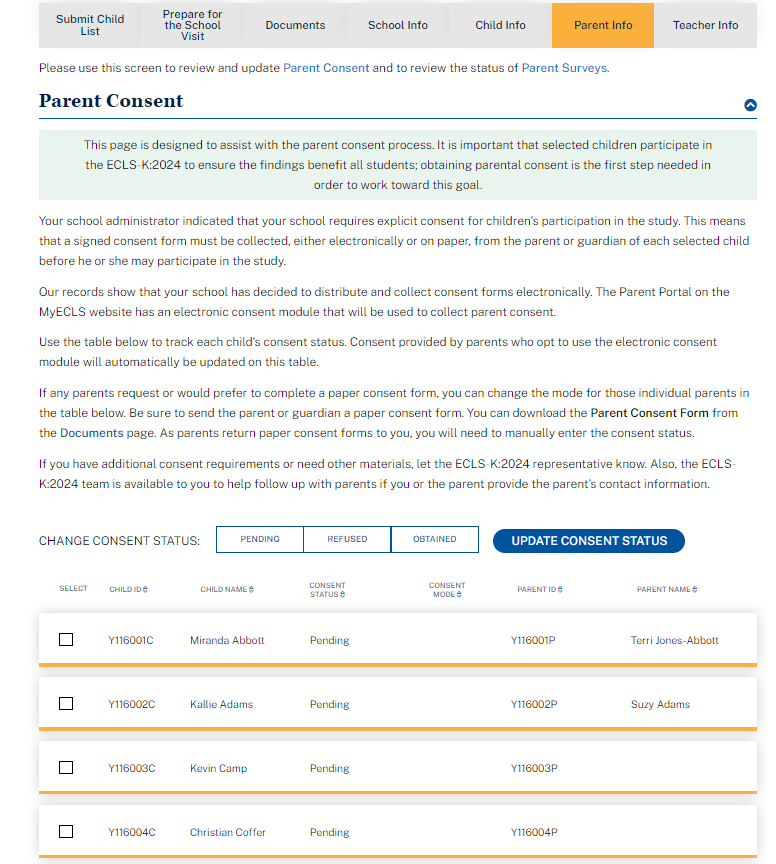
Parent Consent
[FALL KINDERGARTEN AND SPRING KINDERGARTEN SCHOOLS WITH CHILDREN NOT SAMPLED PREVIOUSLY:
This page is designed to assist with the parent consent process. It is important that selected children participate in the ECLS-K:2024 to ensure the findings benefit all students; obtaining parental consent is the first step needed in order to work toward this goal.
Your school administrator indicated that your school requires {EXPLICIT/IMPLICIT} consent for children’s participation in the study. [IF EXPLICIT, DISPLAY: This means that a signed consent form must be collected, either electronically or on paper, from the parent or guardian of each selected child before he or she may participate in the study.] [IF IMPLICIT, DISPLAY: This means that parents will be notified about their child’s selection for the study and they will be able to opt out if they would prefer that their child not participate.]
[IF PAPER CONSENT IS SELECTED, DISPLAY:] Our records show that your school has decided to distribute and collect consent forms on paper. The Parent Portal on the MyECLS website has an electronic consent module to collect and track parent consent. While you will be distributing paper forms, parents may still choose to use the electronic consent module.
[IF PAPER CONSENT IS SELECTED, DISPLAY:] Use the table below to track each child’s consent status. As you collect paper consent forms, please update the consent status manually for the associated children. (Consent provided by parents who opt to use the electronic consent module on MyECLS will automatically be updated on this table.) Please update and monitor consent statuses on a regular basis. It is important that every selected child participate to ensure the findings benefit all students.
[IF ELECTRONIC CONSENT IS SELECTED, DISPLAY:] Our records show that your school has decided to distribute and collect consent forms electronically. The Parent Portal on the MyECLS website has an electronic consent module that will be used to collect parent consent.
[IF ELECTRONIC CONSENT IS SELECTED, DISPLAY:] Use the table below to track each child’s consent status. Consent provided by parents who opt to use the electronic consent module will automatically be updated on this table.
[IF ELECTRONIC CONSENT SELECTED, DISPLAY:] If any parents request or would prefer to complete a paper consent form, you can change the mode for those individual parents in the table below. Be sure to send the parent or guardian a paper consent form. You can download the Parent Consent Form from the Documents [LINK TO DOCUMENTS PAGE] page. As parents return paper consent forms to you, you will need to manually enter the consent status.
If you have additional consent requirements or need other materials, let the ECLS-K:2024 representative know. Also, the ECLS-K:2024 team is available to you to help follow up with parents if you or the parent provide the parent’s contact information.
Display a list of children along with child ID, child name, consent status, consent delivery method, parent ID, parent name.
Consent delivery method is either electronic or paper, as recorded on the School Information Screen.
If electronic, child consent status will update automatically as the electronic forms are signed.
If paper, or for individual parents who prefer to provide paper, the school coordinator or ECLS-K:2024 representative will update child consent status as the forms are received.
The electronic or paper column is prefilled based on the school’s selection but can be updated manually for individual children.]
[SPRING KINDERGARTEN WITH CHILDREN SAMPLED PREVIOUSLY, FALL FIRST GRADE, SPRING FIRST GRADE, AND NEW TRANSFER SCHOOLS:
Use the table below to track the consent status for each participating child. It is important that every selected child participate to ensure the findings benefit all students. However, if parents choose to opt their child out of future participation, you can change the consent status in the table below.
Display a list of children along with child ID, child name, consent status, parent ID, parent name.]
The checkbox in the far left column allows the user to select the row to update consent status
Display a consent status update button above the table. The options include:
Pending
Obtained
Refused
Apply the selection to selected children in the consent status column.
Child ID |
Child Name |
Consent Status |
Consent Mode |
Parent ID |
Parent Name |
9999001C |
Child Name |
C_Consent |
[Electronic] |
9999001P |
Parent Name |
PARENT INFORMATION AND SURVEY TRACKING SECTION
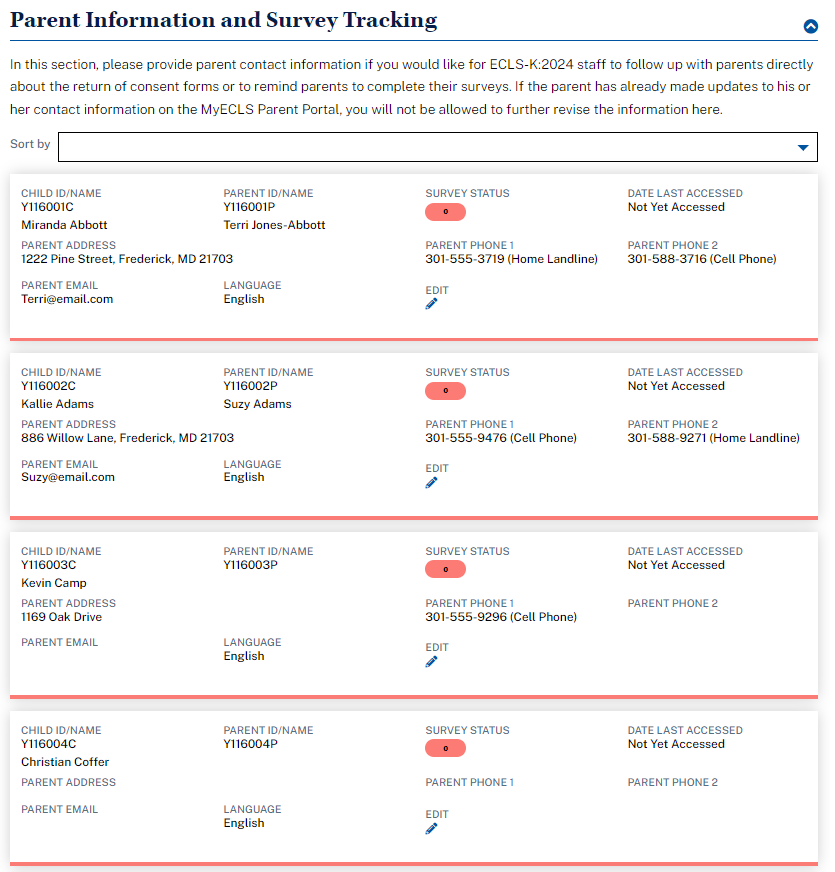
Parent Information [and Survey Tracking]
In this section, please provide parent contact information if you would like for ECLS-K:2024 staff to [follow up with parents directly about the return of consent forms or to] remind parents to complete their surveys. If the parent has already made updates to his or her contact information on the MyECLS Parent Portal, you will not be allowed to further revise the information here.
Display a tile for each child with the following information.
Fall kindergarten, spring kindergarten, and spring first grade:
Child ID/Name |
Parent ID/Name |
Parent Address |
Parent Phone |
Parent Email |
Language |
Survey Status |
Date Last Accessed |
Edit |
9999 001C Child Name |
9999001P Parent Name |
123 Main St |
301-555-1212 |
Parent @gmail .com |
English |
75 |
9/15/23 |
Edit icon |
Fall first grade:
Child ID/Name |
Parent ID/Name |
Parent Address |
Parent Phone |
Parent Email |
Language |
9999 001C Child Name |
9999001P Parent Name |
123 Main St |
301-555-1212 |
Parent @gmail .com |
English |
Fill parent information fields as parent information is recorded in the Parent Portal. Allow updates to the parent address/phone/email fields on this screen by the SC. If the parent has recorded information or made updates, do not allow updates by the SC. When the Edit icon is selected, a modal displays with fields to allow the user to update information: Parent First and Last Name, Address (street), City, State, ZIP, Parent Phone1, Phone 1 Type, Parent Phone 2, Phone 2 Type, and Parent Email.
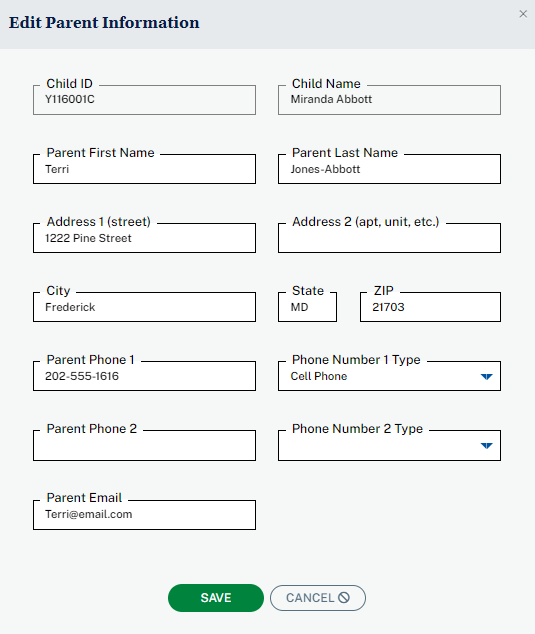
TEACHER INFORMATION TAB
Please use this screen to review the Teacher List, the list of Child-Teacher Links, and the status of Teacher Surveys.
The Teacher Information (“Teacher Info”) tab has three sections in fall kindergarten, spring kindergarten, and spring first grade: Teacher List, Child-Teacher Link, and Track Teacher Surveys. “Teacher List,” “Child-Teacher Links,” and “Teacher Surveys” are links that navigate to the corresponding sections of the page. The ”Track Teacher Surveys” section does not appear in fall first grade.
TEACHER LIST SECTION
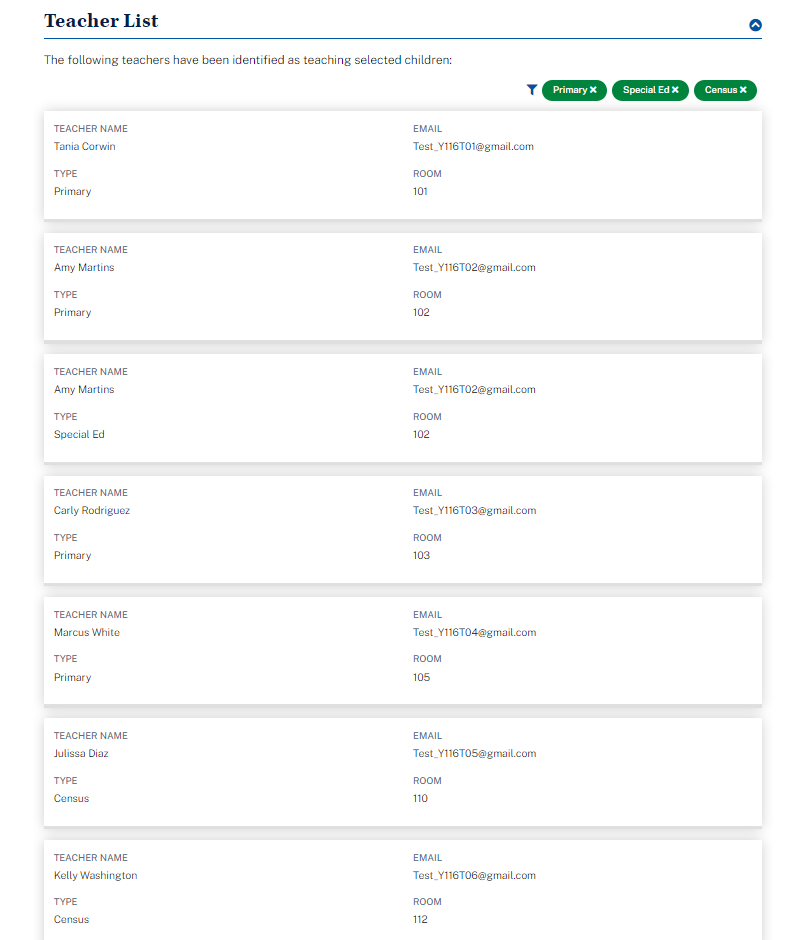
Teacher List
The following teachers have been identified as teaching selected children:
Display a list of teachers, as recorded by the ECLS-K:2024 representative.
Teacher Name |
Email Address |
Type |
Room |
Teacher Name |
Primary, Census, or Special Ed |
123 |
CHILD-TEACHER LINK SECTION
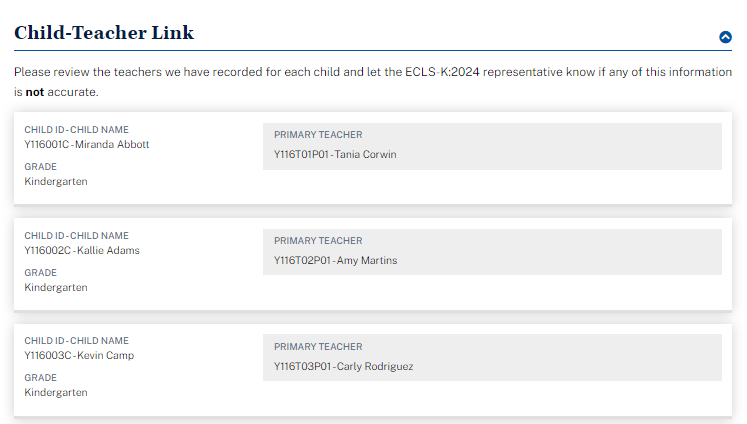
Display a list of children. For each child, display a primary classroom teacher, as recorded by the ECLS-K:2024 representative. For each child with an IEP or exclusion on file, also display the special education teacher, as recorded by the ECLS-K:2024 representative.
Child-Teacher Link
Please review the teachers we have recorded for each child and let the ECLS-K:2024 representative know if any of this information is not accurate.
Child ID |
Child Name |
Grade |
Primary Teacher ID |
Primary Teacher Name |
Special Ed Teacher ID |
Special Ed Teacher Name |
9999001C |
Child One |
K |
9999T01 – P01 |
Teacher Name |
9999T01 – S01 |
Teacher Name |
9999002C |
Child Two |
K |
9999T01 – P01 |
Teacher Name |
N/A |
N/A |
9999003C |
Child Three |
TK |
9999T02 – P01 |
Teacher Name |
9999T02 – S01 |
Teacher Name |
TEACHER SURVEY SECTION (FALL KINDERGARTEN, SPRING KINDERGARTEN, AND SPRING FIRST GRADE)
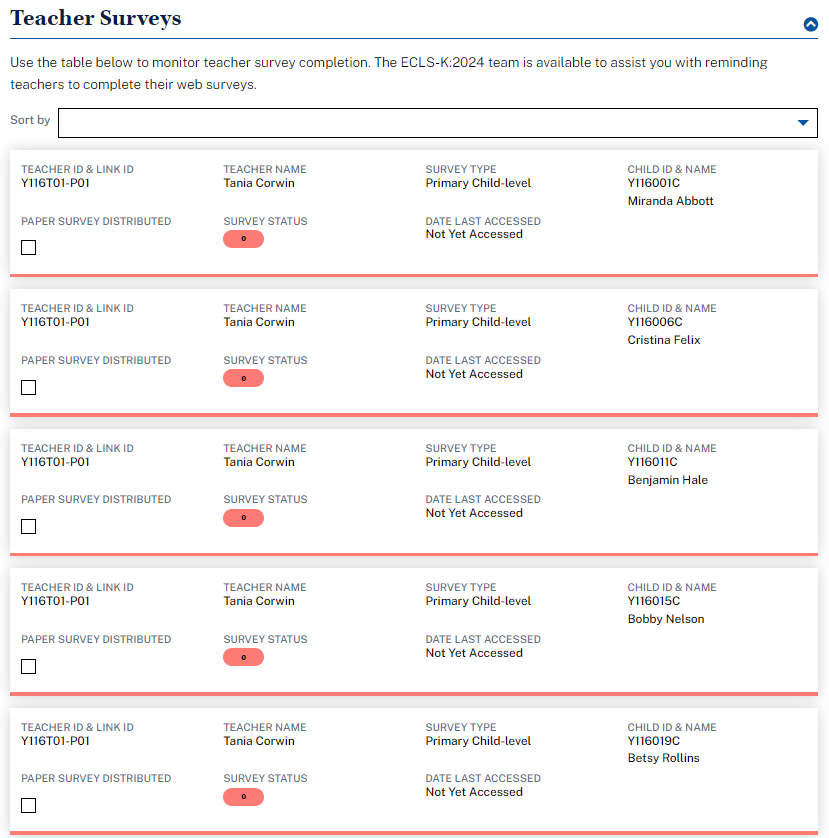
Teacher Surveys
Use the table below to monitor teacher survey completion. The ECLS-K:2024 team is available to assist you with reminding teachers to complete their web surveys.
The user can sort by child name, grade, or teacher name.
Teacher ID and link ID
Teacher Name
Survey type: Display primary teacher-level, primary child-level, and, in spring rounds only, special ed teacher-level, or special ed child-level.
Child ID and name: For child-level surveys, display child ID and name, else display “n/a”.
Paper survey distributed: Checked if the ECLS-K:2024 representative has distributed paper surveys
Survey Status (% complete)
Date Last Accessed
Teacher ID & Link ID |
Teacher Name |
Survey Type |
Child ID and Name |
Paper Survey Distributed |
Survey Status |
Date Last Accessed |
9999T01-P01/S01 |
Teacher Name |
primary teacher-level / primary child-level / special ed teacher-level / special ed child-level |
9999001C Child Name |
CHECK-BOX |
100% |
9/15/23 |
The screens appearing in this section (“3. SCHOOL ADMINISTRATOR PORTAL”) are for spring rounds only.
The School Administrator Portal has three sections: Overview, Survey, and More Information. Use the navigation icons on the left to skip to each section.
This portal is available to the school administrators, as well as other school personnel designated by a school administrator to complete sections of the School Administrator Survey. Some text on this screen is to be displayed only for the school administrator log-in, while some text may be displayed to both the school administrator and the secondary log-in (designee).
3.1 Overview Section
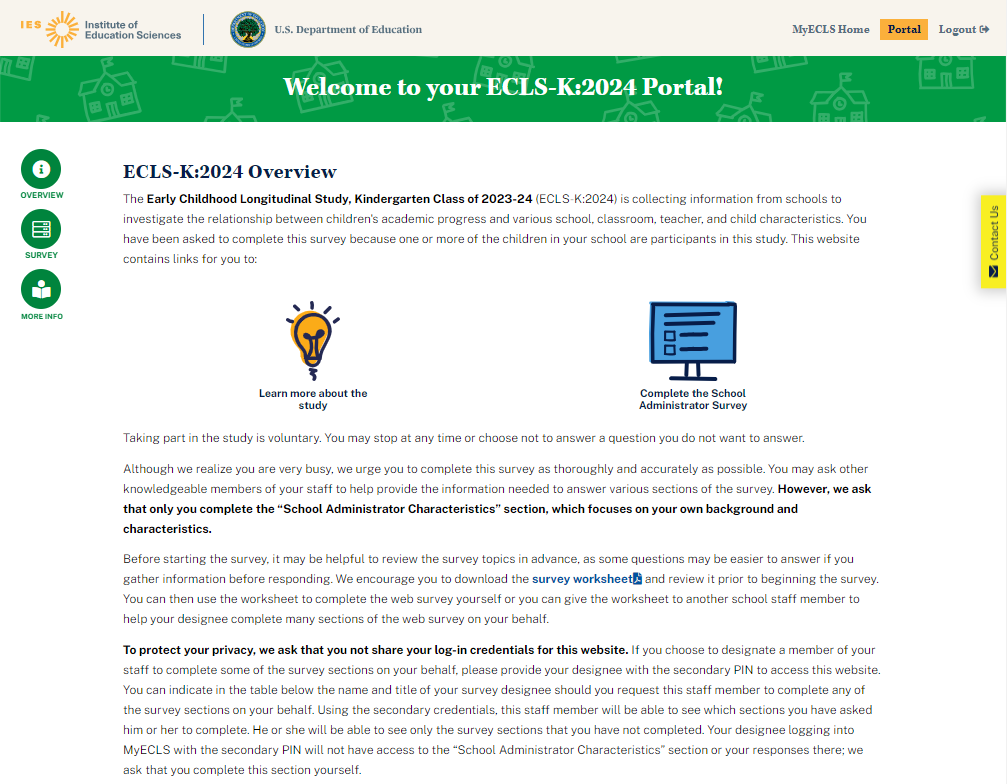
Welcome to your ECLS-K:2024 portal!
ECLS-K:2024 Overview
The Early Childhood Longitudinal Study, Kindergarten Class of 2023-24 (ECLS-K:2024) is collecting information from schools to investigate the relationship between children's academic progress and various school, classroom, teacher, and child characteristics. [DISPLAY IN SPRING FIRST GRADE: The next phase of ECLS-K:2024 study activities will take place between February and June 2025, when most of the participating children are in first grade.] You have been asked to complete this survey because one or more of the children in your school are participants in this study. This website contains links for you to:
Learn more about the study
Complete the School Administrator Survey
Taking part in the study is voluntary. You may stop at any time or choose not to answer a question you do not want to answer.
[DISPLAY FOR SCHOOL ADMINISTRATOR ONLY:] Although we realize you are very busy, we urge you to complete this survey as thoroughly and accurately as possible. You may ask other knowledgeable members of your staff to help provide the information needed to answer various sections of the survey. However, we ask that only you complete the “School Administrator Characteristics” section, which focuses on your own background and characteristics.
[DISPLAY FOR SCHOOL ADMINISTRATOR ONLY:] Before starting the survey, it may be helpful to review the survey topics in advance, as some questions may be easier to answer if you gather information before responding. We encourage you to download the survey worksheet [DISPLAY LINK TO SAQ WORKSHEET] and review it prior to beginning the survey. You can then use the worksheet to complete the web survey yourself or you can give the worksheet to another school staff member to help your designee complete many sections of the web survey on your behalf.
The worksheet (see Attachment A-1) will display each section and a description of the types of items that appear in each section. There will also be a reminder that only the principal can and should respond to section H (the section about school administrator/principal background).
[DISPLAY FOR SCHOOL ADMINISTRATOR ONLY:] To protect your privacy, we ask that you not share your log-in credentials for this website. If you choose to designate a member of your staff to complete some of the survey sections on your behalf, please provide this designee with the secondary PIN to access this website. You can indicate in the table below the name and title of your survey designee should you request this staff member to complete any of the survey sections on your behalf. Using the secondary credentials, this staff member will be able to see which sections you have asked him or her to complete. He or she will be able to see only the survey sections that you have not completed. Your designee logging into MyECLS with the secondary PIN will not have access to the “School Administrator Characteristics” section or your responses there; we ask that you complete this section yourself.
3.2 Survey Section
Participants select the blue arrow to launch the survey section. When the survey section is complete, a green check mark displays and the section can no longer be opened.
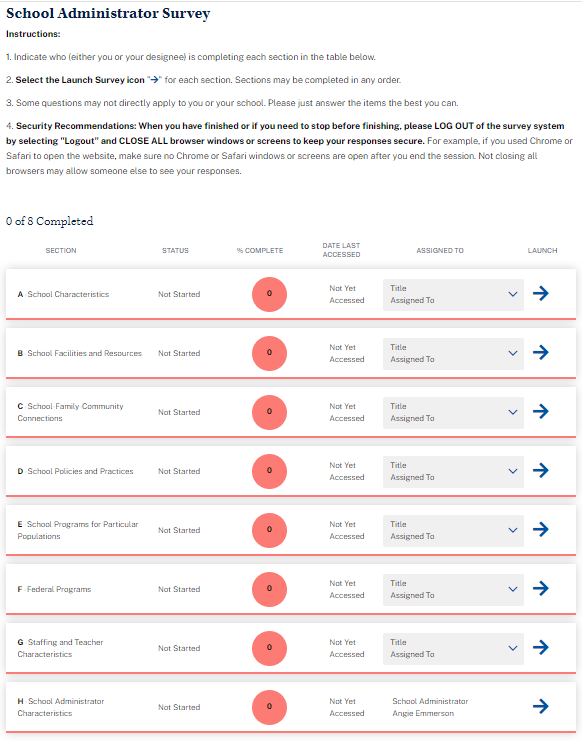
School Administrator Survey
Instructions:
Indicate who (either you or your designee) is completing each section in the table below.
Select the Launch Survey icon [DISPLAY ICON] for each section. Sections may be completed in any order.
Some questions may not directly apply to you or your school. Please just answer the items the best you can.
Security Recommendations: When you have finished or if you need to stop before finishing, please LOG OUT of the survey system by selecting "Logout" and CLOSE ALL browser windows or screens to keep your responses secure. For example, if you used Chrome or Safari to open the website, make sure no Chrome or Safari windows or screens are open after you end the session. Not closing all browsers may allow someone else to see your responses.
If there is an error when launching the Blaise survey, the user may see this message: “There was an error in reloading the survey. Please check that you are not logged into the survey on another device or browser, and wait 10 minutes before signing back in. If you are still experiencing issues, please contact the ECLS-K:2024 at 1-855-898-2018 or [email protected].”
Fields to enter the other school staff name and title:
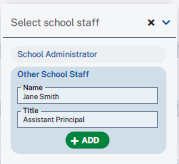
Display survey sections. Only the school administrator can see all 8 sections. The secondary (designee’s) log-in cannot see section H, as this section is to be completed only by the school administrator.
Survey Section table, with example text:
Section |
Status |
Percent Complete |
Date Last Accessed |
Completed by |
Launch |
|
Complete |
100 |
4/13/24 |
School Administrator; Other School Staff: Jane Smith, Assistant Principal |
|
|
Complete |
100 |
4/13/24 |
Other School Staff: Jane Smith, Assistant Principal |
|
|
In-progress |
50 |
4/13/24 |
Other School Staff: Jane Smith, Assistant Principal |
Launch Survey |
|
Not started |
0 |
|
Other School Staff: Jane Smith, Assistant Principal |
Launch Survey |
|
Not started |
0 |
|
Other School Staff: Jane Smith, Assistant Principal |
Launch Survey |
|
Not started |
0 |
|
Other School Staff: Jane Smith, Assistant Principal |
Launch Survey |
|
Not started |
0 |
|
Other School Staff: Jane Smith, Assistant Principal |
Launch Survey |
|
Complete |
100 |
4/13/24 |
School Administrator |
|
3.3 More Information Section

For more information about the ECLS-K:2024, please download the following document or return to the MyECLS home screen for more study information:
School Administrator Letter [LINK TO LETTER]
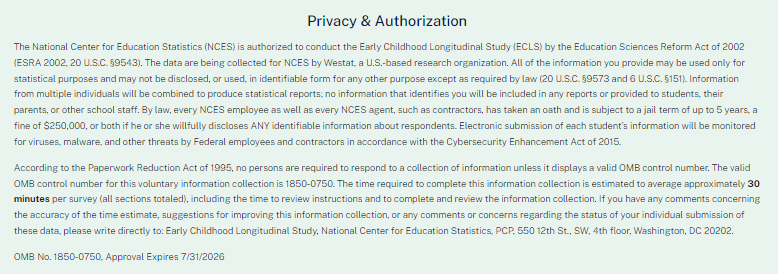
This language appears at the bottom of the School Administrator Portal page, directly on the screen.
The National Center for Education Statistics (NCES) is authorized to conduct the Early Childhood Longitudinal Study (ECLS) by the Education Sciences Reform Act of 2002 (ESRA 2002, 20 U.S.C. §9543). The data are being collected for NCES by Westat, a U.S.-based research organization. All of the information you provide may be used only for statistical purposes and may not be disclosed, or used, in identifiable form for any other purpose except as required by law (20 U.S.C. §9573 and 6 U.S.C. §151). Information from multiple individuals will be combined to produce statistical reports; no information that identifies you will be included in any reports or provided to students, their parents, or other school staff. By law, every NCES employee as well as every NCES agent, such as contractors, has taken an oath and is subject to a jail term of up to 5 years, a fine of $250,000, or both if he or she willfully discloses ANY identifiable information about respondents. Electronic submission of each student’s information will be monitored for viruses, malware, and other threats by Federal employees and contractors in accordance with the Cybersecurity Enhancement Act of 2015.
According to the Paperwork Reduction Act of 1995, no persons are required to respond to a collection of information unless it displays a valid OMB control number. The valid OMB control number for this voluntary information collection is 1850-0750. The time required to complete this information collection is estimated to average approximately 30 minutes per survey (all sections totaled), including the time to review instructions and to complete and review the information collection. If you have any comments concerning the accuracy of the time estimate, suggestions for improving this information collection, or any comments or concerns regarding the status of your individual submission of these data, please write directly to: Early Childhood Longitudinal Study, National Center for Education Statistics, PCP, 550 12th St., SW, 4th floor, Washington, DC 20202.
OMB No. 1850-0750, Approval Expires XX/XX/XXXX
The Teacher Portal is available in the fall kindergarten, spring kindergarten, and spring first-grade rounds. Special education teachers will access the portal only in spring rounds. The special education fills in the text below will display only in spring rounds.
The Teacher Portal has three sections: Overview, Surveys, and More Information. Use the navigation icons on the left to skip to each section.
4.1 Overview Section
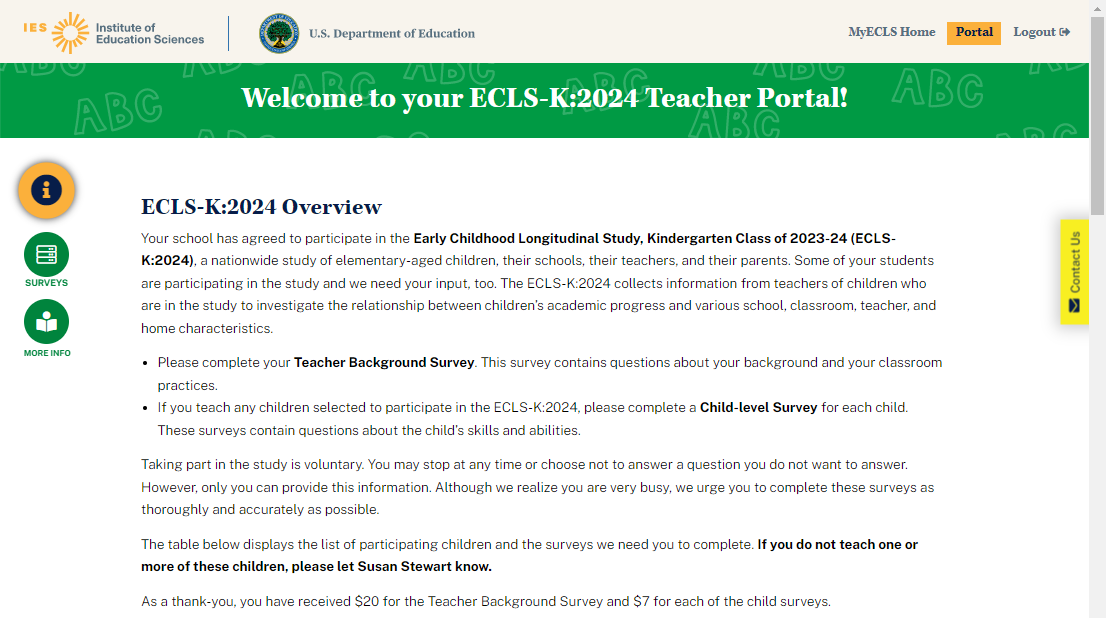
Welcome to your ECLS-K:2024 Teacher Portal!
ECLS-K:2024 Overview
Your school has agreed to participate in the Early Childhood Longitudinal Study, Kindergarten Class of 2023-24 (ECLS-K:2024), a nationwide study of elementary-aged children, their schools, their teachers, and their parents. [DISPLAY IN SPRING FIRST GRADE: The next phase of ECLS-K:2024 study activities will take place between February and June 2025, when most of the participating children are in first grade.] Some of your students are participating in the study and we need your input, too. The ECLS-K:2024 collects information from teachers of children who are in the study to investigate the relationship between children’s academic progress and various school, classroom, teacher, and home characteristics.
[IF TEACHER LINK ID = P (PRIMARY) OR C (CENSUS) AND IT IS A FALL OR SPRING ROUND, OR IF TEACHER LINK ID = BOTH P AND S AND IT IS A FALL ROUND, DISPLAY: Please complete your Teacher Background Survey. This survey contains questions about your background and your classroom practices]. [IF TEACHER LINK ID = S (SPECIAL ED), AND IT IS A SPRING ROUND, DISPLAY: Please complete your Teacher Background Survey. This survey contains questions about your experiences teaching students with special education needs.] [IF TEACHER LINK ID = BOTH P AND S, AND IT IS A SPRING ROUND, DISPLAY: Please complete the two Teacher Background Surveys. One will focus on your background and classroom practices. The other is targeted to your experiences teaching students with special education needs.]
If you teach any children selected to participate in the ECLS-K:2024, please complete a Child-level Survey for each child. [IF TEACHER LINK ID = P (PRIMARY) AND IT IS A FALL OR SPRING ROUND, OR IF TEACHER LINK ID = BOTH P AND S AND IT IS A FALL ROUND, DISPLAY: These surveys contain questions about the child’s skills and abilities.] [IF TEACHER LINK ID = S (SPECIAL ED), AND IT IS A SPRING ROUND, DISPLAY: These surveys contain questions about services provided to the child. Please note that some of the information we are asking for may be found in the child’s IEP.] [IF TEACHER LINK ID = BOTH P AND S, AND IT IS A SPRING ROUND, DISPLAY: These surveys contain questions about the child’s skills and abilities and services provided. Please note that some of the information we are asking for may be found in the child’s IEP.]
Taking part in the study is voluntary. You may stop at any time or choose not to answer a question you do not want to answer. However, only you can provide this information. Although we realize you are very busy, we urge you to complete these surveys as thoroughly and accurately as possible.
The table below displays the list of participating children and the surveys we need you to complete. If you do not teach one or more of these children, please let [SCHOOL COORDINATOR] know.
[IF INCENTIVE RULE ON DISTRICT INFO AND SCHOOL INFO SCREENS = INCENTIVES ALLOWED, DISPLAY: As a thank-you, you have received $20 for the Teacher Background Survey [DISPLAY FOR TEACHERS WHO ARE LINKED TO CHILDREN: and $7 for each of the child surveys].]
4.2 Surveys Section
Participants select the blue arrow to launch the survey. When the survey is complete, a green check mark displays and the survey can no longer be opened.
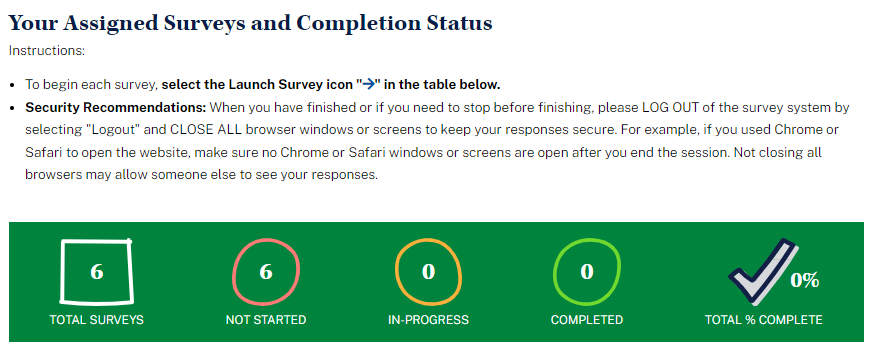
Your Assigned Surveys and Completion Status
Instructions:
To begin each survey, select the Launch Survey icon [DISPLAY ICON] in the table below.
Security Recommendations: When you have finished or if you need to stop before finishing, please LOG OUT of the survey system by selecting "Logout" and CLOSE ALL browser windows or screens to keep your responses secure. For example, if you used Chrome or Safari to open the website, make sure no Chrome or Safari windows or screens are open after you end the session. Not closing all browsers may allow someone else to see your responses.
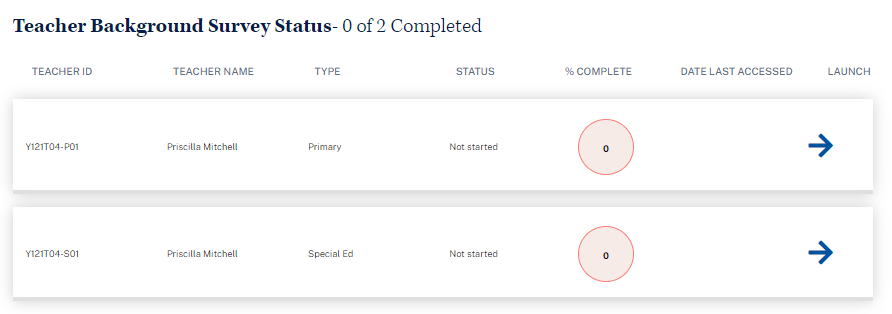
Teacher Background Survey Status (with example text):
Teacher ID |
Teacher Name |
Type |
Status |
% Complete |
Date Last Accessed |
Launch |
9999T01 – P01 |
Teacher Name |
Primary |
In-progress |
75 |
9/15/23 |
Launch Survey |
9999T01 – S01 |
Teacher Name |
Special Ed |
Not Started |
0 |
|
Launch Survey |
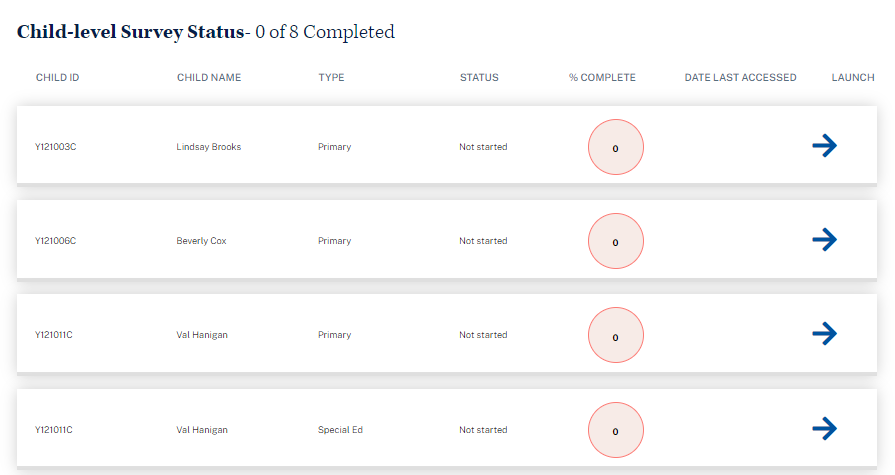
When the teacher is assigned more than 10 child-level surveys, filters appear to allow the teacher to filter the list by survey type (in spring rounds) and status.
![]()
Child-level Survey Status (with example text):
Child ID |
Child Name |
Type |
Status |
% Complete |
Date Last Accessed |
Launch |
9999991C |
Child 1 Name |
Primary |
Complete |
100 |
9/13/23 |
|
9999992C |
Child 2 Name |
Primary |
In-progress |
50 |
9/16/23 |
Launch Survey |
9999993C |
Child 3 Name |
Primary |
Not started |
0 |
N/A |
Launch Survey |
9999993C |
Child 3 Name |
Special Ed |
Not started |
0 |
N/A |
Launch Survey |
4.3 More Information Section

To learn more about the ECLS-K:2024, please download the following documents, scroll down to see findings from previous studies, or return to the MyECLS home screen for more study information:
ECLS-K:2024 Teacher Fact Sheet [LINK TO TEACHER FACT SHEET]
Teacher Letter [LINK TO LETTER]
Display “Barriers to Participation” infographic.
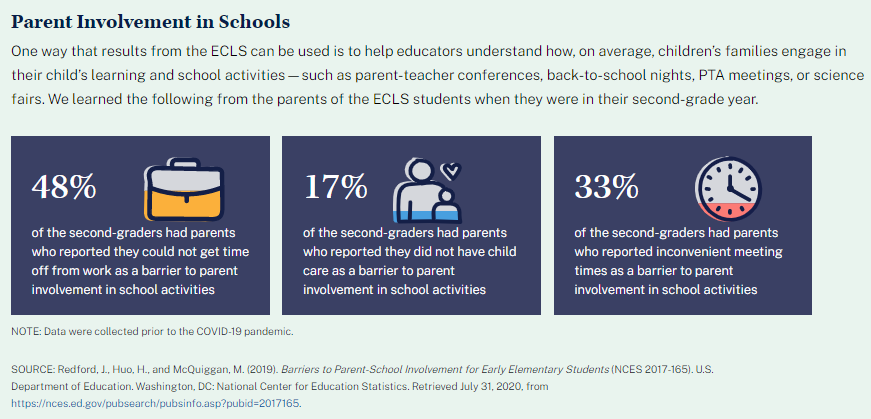
Parent Involvement in Schools
One way that results from the ECLS can be used is to help educators understand how, on average, children’s families engage in their child’s learning and school activities – such as parent-teacher conferences, back-to-school nights, PTA meetings, or science fairs. We learned the following from the parents of the ECLS students when they were in their second-grade year.
48% of the second-graders had parents who reported they could not get time off from work as a barrier to parent involvement in school activities
17% of the second-graders had parents who reported they did not have child care as a barrier to parent involvement in school activities
33% of the second-graders had parents who reported inconvenient meeting times as a barrier to parent involvement in school activities.
NOTE: Data were collected prior to the COVID-19 pandemic.
SOURCE: Redford, J., Huo, H., and McQuiggan, M. (2019). Barriers to Parent-School Involvement for Early Elementary Students (NCES 2017-165). U.S. Department of Education. Washington, DC: National Center for Education Statistics. Retrieved July 31, 2020, from https://nces.ed.gov/pubsearch/pubsinfo.asp?pubid=2017165.
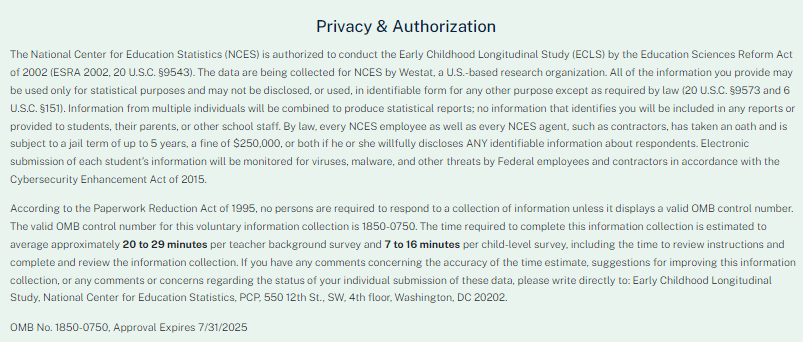
This language appears at the bottom of the Teacher Portal page, directly on the screen.
Privacy and Authorization
The National Center for Education Statistics (NCES) is authorized to conduct the Early Childhood Longitudinal Study (ECLS) by the Education Sciences Reform Act of 2002 (ESRA 2002, 20 U.S.C. §9543). The data are being collected for NCES by Westat, a U.S.-based research organization. All of the information you provide may be used only for statistical purposes and may not be disclosed, or used, in identifiable form for any other purpose except as required by law (20 U.S.C. §9573 and 6 U.S.C. §151). Information from multiple individuals will be combined to produce statistical reports; no information that identifies you will be included in any reports or provided to students, their parents, or other school staff. By law, every NCES employee as well as every NCES agent, such as contractors, has taken an oath and is subject to a jail term of up to 5 years, a fine of $250,000, or both if he or she willfully discloses ANY identifiable information about respondents. Electronic submission of each student’s information will be monitored for viruses, malware, and other threats by Federal employees and contractors in accordance with the Cybersecurity Enhancement Act of 2015.
According to the Paperwork Reduction Act of 1995, no persons are required to respond to a collection of information unless it displays a valid OMB control number. The valid OMB control number for this voluntary information collection is 1850-0750. The time required to complete this information collection is estimated to average approximately 20 to 29 minutes per teacher background survey and 7 to 16 minutes per child-level survey, including the time to review instructions and complete and review the information collection. If you have any comments concerning the accuracy of the time estimate, suggestions for improving this information collection, or any comments or concerns regarding the status of your individual submission of these data, please write directly to: Early Childhood Longitudinal Study, National Center for Education Statistics, PCP, 550 12th St., SW, 4th floor, Washington, DC 20202.
OMB No. 1850-0750, Approval Expires XX/XX/XXXX
The Parent Portal is intended for the parents or guardians of selected children. It has five sections: Overview, Consent, Surveys, Contact Information, and More Information. Use the navigation icons on the left to skip to each section. Each section displays as an accordion, allowing the user to expand and collapse each section. Once consent is recorded, contact information is provided, and survey is completed, each section will be marked as complete. This portal is available in all rounds, but the consent section will appear only in the kindergarten and spring first-grade rounds.
5.1 Overview Section
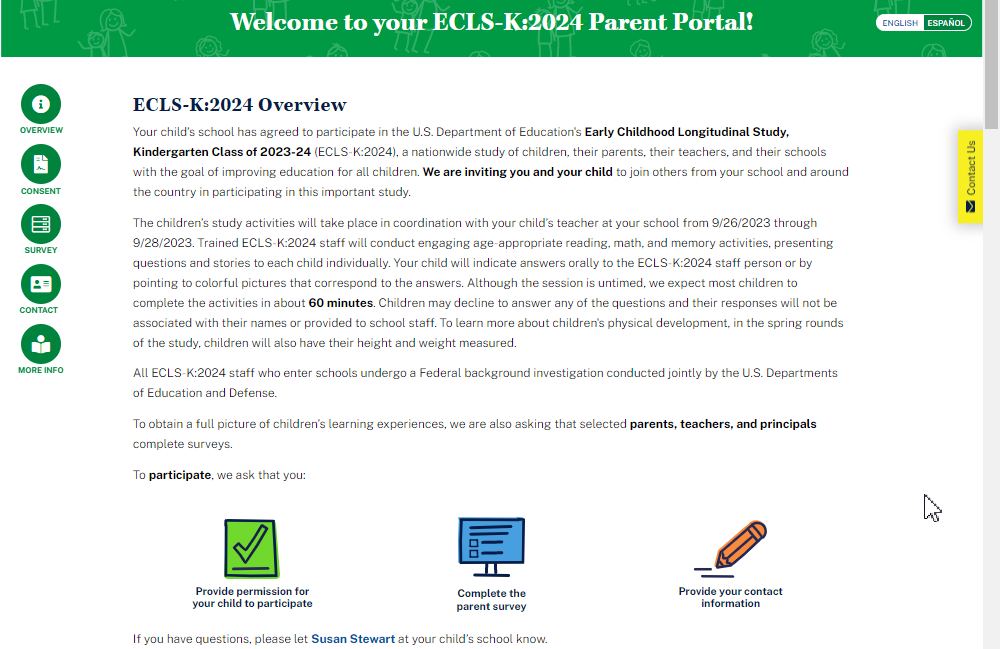
Welcome to your ECLS-K:2024 Parent Portal!
DISPLAY ENGLISH/SPANISH TOGGLE BUTTON.
Navigation icons:
Overview
Consent (not displayed in fall first grade)
Survey (not displayed in fall first grade)
Contact
More Info
Sections can be collapsed and expanded by clicking “Collapse” (Contraer) and “Expand” (Expandir).
ECLS-K:2024 Overview
[[DISPLAY FOR FALL KINDERGARTEN SCHOOLS AND SPRING KINDERGARTEN SCHOOLS FOR WHICH CHILDREN WERE NOT PREVIOUSLY SAMPLED: Your child’s school has agreed to participate in the U.S. Department of Education's Early Childhood Longitudinal Study, Kindergarten Class of 2023-24 (ECLS-K:2024), a nationwide study with the goal of improving education for all children. To obtain a full picture of children’s early learning experiences, we are inviting you and your child to join others from your school and around the country in participating in this important study. ] / [DISPLAY FOR SPRING KINDERGARTEN SCHOOLS FOR WHICH CHILDREN WERE PREVIOUSLY SAMPLED, SPRING FIRST GRADE, AND NEW TRANSFER SCHOOLS IN SPRING KINDERGARTEN: Your child’s school is participating in another round of study activities for the U.S. Department of Education's Early Childhood Longitudinal Study, Kindergarten Class of 2023-24 (ECLS-K:2024), a nationwide study with the goal of improving education for all children. We hope that you and your child will participate in this important study.] / [DISPLAY FOR FALL FIRST GRADE: We are preparing for the spring study activities for the U.S. Department of Education's Early Childhood Longitudinal Study, Kindergarten Class of 2023-24 (ECLS-K:2024), a nationwide study with the goal of improving education for all children. Please take a few moments to update your contact information so that you and your child can continue to participate in this important study.] / [DISPLAY IN SPRING FIRST GRADE FOR PARENTS OF CHILDREN NOT ENROLLED IN A PARTICIPATING SCHOOL (DO NOT DISPLAY IN FALL FIRST GRADE.): We are conducting another round of study activities for the U.S. Department of Education's Early Childhood Longitudinal Study, Kindergarten Class of 2023-24 (ECLS-K:2024), a nationwide study with the goal of improving education for all children. We hope that you and your child will participate in this important study.]]
[DISPLAY IN ALL ROUNDS. IN SPRING FIRST GRADE, DISPLAY ONLY FOR PARENTS OF CHILDREN ENROLLED IN A PARTICIPATING SCHOOL: Study activities will take place at your child’s school [[from [ASSESSMENT DATE START] through [ASSESSMENT DATE END]] / [between March and June [2024/2025]]].] Trained ECLS-K:2024 staff will conduct engaging, age-appropriate reading, math, and memory activities, presenting questions and stories to each child individually. All ECLS-K:2024 staff who enter schools undergo a Federal background investigation conducted jointly by the U.S. Departments of Education and Defense. Although the session is untimed, we expect most children to complete the activities in about 60 minutes. Children may decline to answer any of the questions and their responses will not be associated with their names or provided to school staff. [IN SCHOOLS FLAGGED FOR HEIGHT AND WEIGHT MEASUREMENTS, DISPLAY: To learn more about children’s physical development, in selected rounds of the study, children will also have their height and weight measured.]
To participate, we ask that you: Display with icons:
[DISPLAY FOR FALL KINDERGARTEN SCHOOLS AND SPRING KINDERGARTEN SCHOOLS FOR WHICH CHILDREN WERE NOT PREVIOUSLY SAMPLED: Provide permission for your child to participate]
[DISPLAY FOR KINDERGARTEN AND SPRING FIRST GRADE: Complete the parent survey]
Provide your contact information
[IN SPRING FIRST GRADE, DISPLAY ONLY FOR PARENTS OF CHILDREN ENROLLED IN A PARTICIPATING SCHOOL: If you have questions [or have reconsidered your child’s participation], please let [SCHOOL COORDINATOR] at your child’s school know. When the user hovers over “school coordinator”, the SC phone number and email address recorded on the School Information Screen will display.]

Spanish text:
¡Bienvenido(a) a su portal de padres y madres de ECLS-K:2024!
Descripción
Consentimiento (not displayed in fall first grade)
Encuesta (not displayed in fall first grade)
Contacto
Información
Descripción general de ECLS-K:2024
[[DISPLAY FOR FALL KINDERGARTEN SCHOOLS AND SPRING KINDERGARTEN SCHOOLS FOR WHICH CHILDREN WERE NOT PREVIOUSLY SAMPLED: La escuela de su niño(a) ha aceptado participar en el Estudio Longitudinal de la Primera Infancia, Clase de Kindergarten de 2023-24 (ECLS-K:2024), del Departamento de Educación de los Estados Unidos. Se trata de un estudio nacional cuyo propósito es el de mejorar la educación para todos los niños. Para obtener una imagen completa de las experiencias de aprendizaje temprano de los niños, les estamos invitando a usted y a su niño(a) a unirse a otras personas de su escuela y de todo el país para participar en este importante estudio.] / [DISPLAY FOR SPRING KINDERGARTEN SCHOOLS FOR WHICH CHILDREN WERE PREVIOUSLY SAMPLED, SPRING FIRST GRADE, AND NEW TRANSFER SCHOOLS IN SPRING KINDERGARTEN: La escuela de su niño(a) está participando en una nueva ronda de actividades del Estudio Longitudinal de la Primera Infancia, Clase de Kindergarten de 2023-24 (ECLS-K:2024), del Departamento de Educación de los Estados Unidos. Se trata de un estudio nacional cuyo propósito es el de mejorar la educación para todos los niños. Esperamos que usted y su niño(a) participen en este importante estudio.] / [DISPLAY FOR FALL FIRST GRADE: Estamos preparándonos para las actividades de primavera del Estudio Longitudinal de la Primera Infancia, Clase de Kindergarten de 2023-24 (ECLS-K:2024), del Departamento de Educación de los Estados Unidos. Se trata de un estudio nacional cuyo propósito es el de mejorar la educación para todos los niños. Por favor, dedique unos minutos a poner al día su información de contacto para que usted y su niño(a) puedan seguir participando en este importante estudio.] / [DISPLAY IN SPRING FIRST GRADE FOR PARENTS OF CHILDREN NOT ENROLLED IN A PARTICIPATING SCHOOL: Estamos llevando a cabo una nueva ronda de actividades del Estudio Longitudinal de la Primera Infancia, Clase de Kindergarten de 2023-24 (ECLS-K:2024), del Departamento de Educación de los Estados Unidos. Se trata de un estudio nacional cuyo propósito es el de mejorar la educación para todos los niños. Esperamos que usted y su niño(a) participen en este importante estudio.]]
[DISPLAY IN ALL ROUNDS. IN SPRING FIRST GRADE, DISPLAY ONLY FOR PARENTS OF CHILDREN ENROLLED IN A PARTICIPATING SCHOOL: Las actividades del estudio se llevarán a cabo en la escuela de su niño(a) [[desde el [ASSESSMENT DATE START] hasta el [ASSESSMENT DATE END]] / [entre marzo y junio de [2024/2025]]].] El personal entrenado de ECLS-K:2024 llevará a cabo actividades interesantes y apropiadas para la edad en lectura, matemáticas y memoria, presentando preguntas y cuentos a cada niño(a) individualmente. Todo el personal de ECLS-K:2024 que va a las escuelas debe pasar por una investigación federal de antecedentes penales, la cual es llevada a cabo de manera conjunta por el Departamento de Educación y el Departamento de Defensa de los EE.UU. Aunque la sesión no tiene límite de tiempo, esperamos que la mayoría de los niños completen las actividades en unos 60 minutos. Los niños pueden negarse a responder cualquiera de las preguntas y sus respuestas no se asociarán con sus nombres ni tampoco se darán al personal de la escuela. [IN SCHOOLS FLAGGED FOR HEIGHT AND WEIGHT MEASUREMENTS, DISPLAY: Para saber más sobre el desarrollo físico de los niños, se seleccionarán ciertas rondas del estudio en las que también se medirá la estatura y el peso de los niños.]
Para participar, le pedimos que: Display with icons:
[DISPLAY FOR FALL KINDERGARTEN SCHOOLS AND SPRING KINDERGARTEN SCHOOLS FOR WHICH CHILDREN WERE NOT PREVIOUSLY SAMPLED: Dé permiso para que su niño(a) participe
Complete la encuesta para padres y madres
Proporcione su información de contacto
[IN SPRING FIRST GRADE, DISPLAY ONLY FOR PARENTS OF CHILDREN ENROLLED IN A PARTICIPATING SCHOOL: Si tiene preguntas [o ha reconsiderado la participación de su niño(a)], por favor dígaselo a [SCHOOL COORDINATOR] de la escuela de su niño(a).]
5.2 Consent Section
The consent section is available during the kindergarten and spring first-grade rounds. The consent section will be expanded when the user first accesses the portal. It will collapse and be marked as complete once consent is provided. There are three screens for parents in schools with explicit consent and three screens for those with implicit consent.
Explicit Consent screens 1-3:
SCREEN 1:
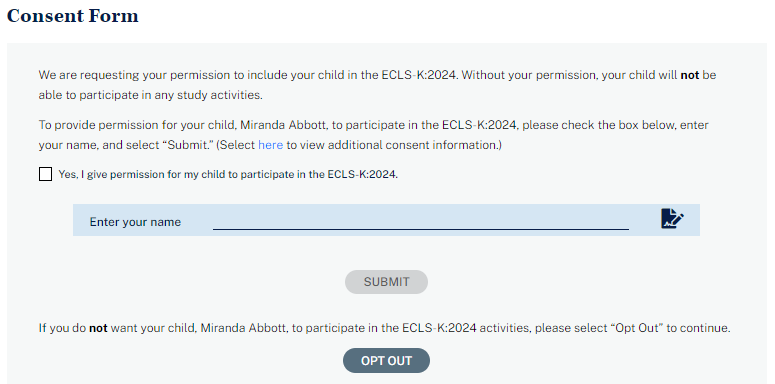
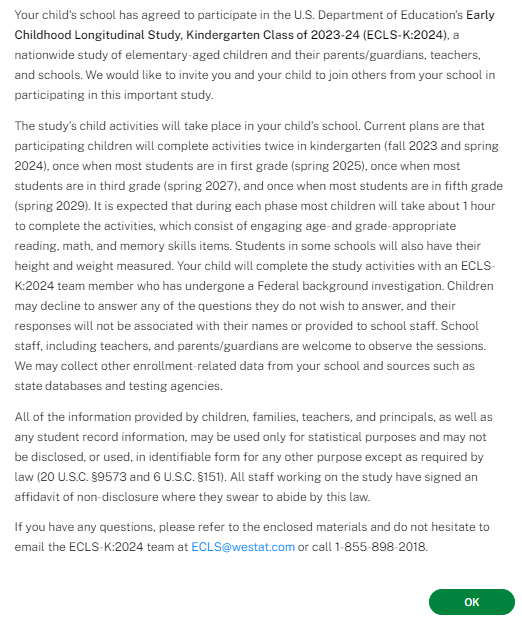
Consent Form
We are requesting your permission to include your child in the ECLS-K:2024. Without your permission, your child will not be able to participate in any study activities.
To provide permission for your child, [CHILD NAME], to participate in the ECLS-K:2024, please check the box below, enter your name, and select “Submit.” (Select here (DISPLAY AS LINK) to view additional consent information.)
[CHECK BOX] Yes, I give permission for my child to participate in the ECLS-K:2024.
Enter Your Name
SUBMIT [BUTTON]
If you do not want your child, [CHILD NAME], to participate in the ECLS-K:2024 activities, please select “Opt Out” to continue.
OPT OUT [BUTTON]
When the user selects the link to view additional consent information, a modal displays the paper explicit consent form text. See Attachment A-1 for the consent form text.
When the user hovers over the checkbox, a tool tip appears: “Please check this box if you want to proceed.”
If “submit” is selected, update child consent status to 2-obtained. The consent section will be marked as complete and the parent survey section will display.
If “opt-out” is selected, go to screen 2.
Spanish text:
Formulario de Consentimiento
Solicitamos su permiso para incluir a su niño(a) en el ECLS-K:2024. Sin su permiso, su niño(a) no podrá participar en ninguna actividad del estudio.
Para dar permiso para que su niño(a) [CHILD NAME] participe en el ECLS-K:2024, por favor marque el cuadrito que está a continuación, ponga su nombre y seleccione “Enviar”. Haga clic aquí (DISPLAY AS LINK) para ver más información para dar consentimiento.
[CHECK BOX] Sí, doy permiso para que mi niño(a) participe en el ECLS-K:2024.
Ponga su nombre
ENVIAR [BUTTON]
Si usted no desea que su niño(a) [CHILD NAME] participe en las actividades de ECLS-K:2024, por favor seleccione “No va a participar” para continuar.
NO VA A PARTICIPAR [BUTTON]
Tooltip text: “Por favor marque este cuadrito si quiere continuar.”
SCREEN 2:
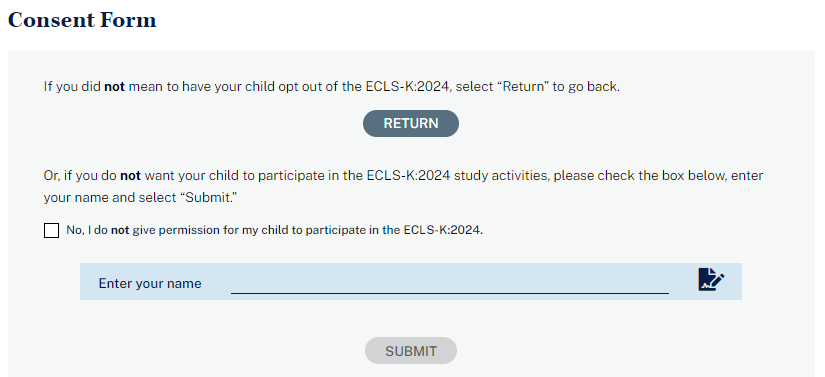
Consent Form
If you did not mean to have your child opt out of the ECLS-K:2024, select “Return” to go back.
RETURN [BUTTON]
Or, if you do not want your child to participate in the ECLS-K:2024 study activities, please check the box below, enter your name, and select “Submit.”
[CHECK BOX] No, I do not give permission for my child to participate in the ECLS-K:2024.
Enter Your Name
SUBMIT [BUTTON]
If ‘’submit” is selected, update the child consent status to 3-refused and go to screen 3.
If “return” is selected, return to screen 1.
Spanish text:
Formulario de Consentimiento
Si no deseaba dejar a su niño(a) fuera del estudio ECLS-K:2024, seleccione “Regresar” para volver.
REGRESAR [BUTTON]
O, si no desea que su niño(a) participe en las actividades del estudio ECLS-K:2024, por favor marque el cuadrito que está a continuación, ponga su nombre y seleccione “Enviar”.
[CHECK BOX] No, no doy mi permiso para que mi niño(a) participe en el ECLS-K:2024.
Ponga su nombre
ENVIAR [BUTTON]
SCREEN 3:
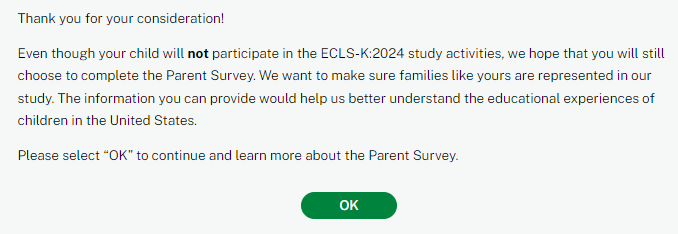
Consent Form
Thank you for your consideration!
Even though your child will not participate in the ECLS-K:2024 study activities, we hope that you will still choose to complete the Parent Survey. We want to make sure families like yours are represented in our study. The information you can provide would help us better understand the educational experiences of children in the United States.
Please select “OK” to continue and learn more about the Parent Survey.
OK [BUTTON]
When the “OK” button is selected, the consent section will be marked as complete and the parent survey section will display.
Spanish text:
Formulario de Consentimiento
¡Gracias por considerarlo!
Aunque su niño(a) no participará en las actividades del estudio ECLS-K:2024, esperamos que usted decida completar la encuesta para padres y madres. Queremos asegurarnos de que las familias como la suya estén representadas en nuestro estudio. La información que usted puede proporcionar nos ayudaría a entender mejor las experiencias educativas de los niños en los Estados Unidos.
Por favor seleccione “OK” para continuar e informarse más sobre la encuesta para padres y madres.
OK [BUTTON]
Implicit Consent screens 4-6:
SCREEN 4
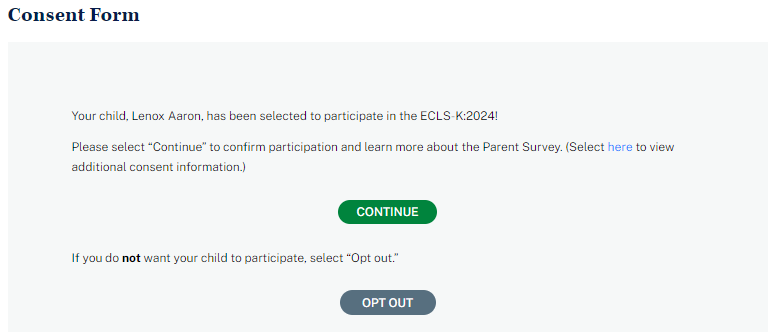
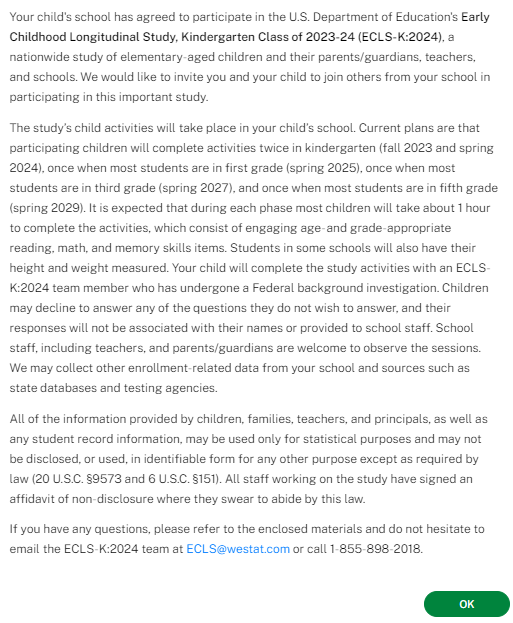
Consent Form
Your child, [CHILD NAME], has been selected to participate in the ECLS-K:2024!
Please select “Continue” to confirm participation and learn more about the Parent Survey. (Select here (DISPLAY AS LINK) to view additional consent information.)
CONTINUE [BUTTON]
If you do not want your child to participate, select “Opt out.”
OPT OUT [BUTTON]
When the user selects the link to view additional consent information, a modal displays the paper implicit consent form text. See Attachment A-1 for the consent form text.
If the “continue” button is selected, the consent section will be collapsed and the parent survey section will display.
If the “opt out” button is selected, go to screen 5.
Spanish text:
Formulario de Consentimiento
¡Su niño(a) [CHILD NAME] ha sido seleccionado(a) para participar en ECLS-K:2024!
Por favor seleccione “Continuar” para confirmar su participación e informarse más sobre la encuesta para padres y madres. Haga clic aquí (DISPLAY AS LINK) para ver más información para dar consentimiento.
CONTINUAR [BUTTON]
Si usted no desea que su niño(a) participe, seleccione “No va a participar”.
NO VA A PARTICIPAR [BUTTON]
SCREEN 5
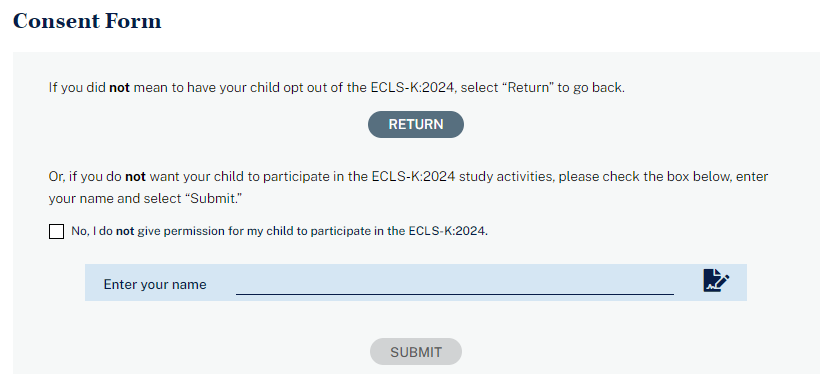
Consent Form
If you did not mean to have your child opt out of the ECLS-K:2024, select “Return” to go back.
RETURN BUTTON
Or, if you do not want your child to participate in the ECLS-K:2024 study activities, please check the box below, enter your name and select “Submit.”
[CHECK BOX] No, I do not give permission for my child to participate in the ECLS-K:2024.
Enter Your Name
SUBMIT [BUTTON]
If ‘’submit” is selected, update the child consent status to 3-refused and go to screen 6.
If “return” is selected, return to screen 4.
Spanish text:
Formulario de Consentimiento
Si no deseaba dejar a su niño(a) fuera de ECLS-K:2024, seleccione “Regresar” para volver.
REGRESAR [BUTTON]
O, si no desea que su niño(a) participe en las actividades del estudio ECLS-K:2024, por favor marque el cuadrito que está a continuación, ponga su nombre y seleccione “Enviar”.
[CHECK BOX] No, no doy mi permiso para que mi niño(a) participe en el ECLS-K:2024.
Ponga su nombre
ENVIAR [BUTTON]
SCREEN 6
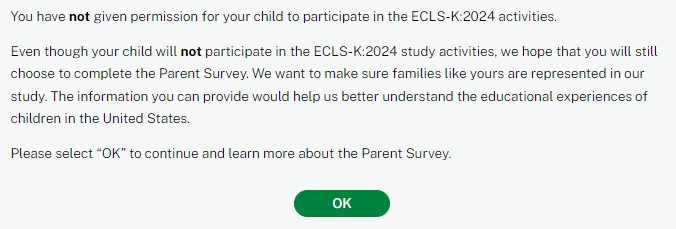
Consent Form
You have not given permission for your child to participate in the ECLS-K:2024 activities.
Even though your child will not participate in the ECLS-K:2024 study activities, we hope that you will still choose to complete the Parent Survey. We want to make sure families like yours are represented in our study. The information you can provide would help us better understand the educational experiences of children in the United States.
Please select “OK” to continue and learn more about the Parent Survey.
OK [BUTTON]
When the “OK” button is selected, the consent section will be marked as complete (see screenshot below, with a check mark image and the text “Consent Given” or “Consent Not Provided”) and the parent survey section will display.
Spanish text:
Formulario de Consentimiento
Usted no ha dado permiso para que su niño(a) participe en las actividades del ECLS-K:2024.
Aunque su niño(a) no participará en las actividades del estudio ECLS-K:2024, esperamos que usted decida completar la encuesta para padres y madres. Queremos asegurarnos de que las familias como la suya estén representadas en nuestro estudio. La información que usted puede proporcionar nos ayudaría a entender mejor las experiencias educativas de los niños en los Estados Unidos.
Por favor seleccione “OK” para continuar e informarse más sobre la encuesta para padres y madres.
OK [BUTTON]

Consent Form
Consent Given
If you want to change your child’s consent status, contact the ECLS-K:2024 team at 1-855-898-2018 or [email protected].
Spanish text:
Formulario de Consentimiento
Consentimiento otorgado
Si desea cambiar su respuesta al pedido de consentimiento para su niño(a), contacte al personal de ECLS-K:2024 en el teléfono 1-855-898-2018 o en [email protected].

Consent Form
Consent Not Provided
If you want to change your child’s consent status, contact the ECLS-K:2024 team at 1-855-898-2018 or [email protected].
Spanish text:
Formulario de Consentimiento
No se ha dado consentimiento
Si desea cambiar su respuesta al pedido de consentimiento para su niño(a), contacte al personal de ECLS-K:2024 en el teléfono 1-855-898-2018 o en [email protected].
5.3 Parent Survey Section
The survey section appears during fall kindergarten, spring kindergarten, and spring first-grade. Participants select the blue arrow to launch the survey. When the survey is complete, a green check mark displays and the survey can no longer be opened.
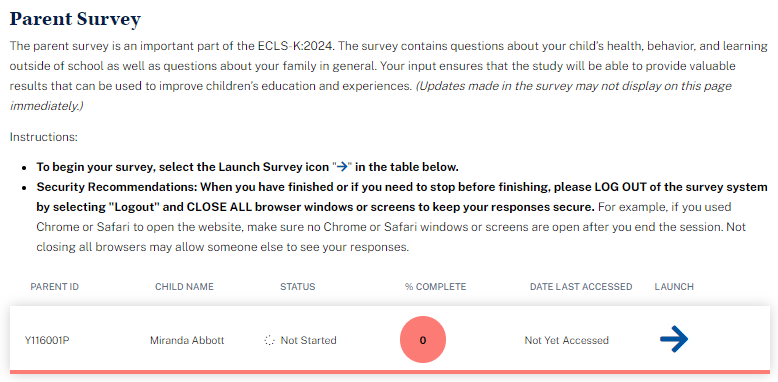
Parent Survey
The parent survey is an important part of the ECLS-K:2024. The survey contains questions about your child’s health, behavior, and learning outside of school as well as questions about your family in general. Your input ensures that the study will be able to provide valuable results that can be used to improve children’s education and experiences. (Updates made in the survey may not display on this page immediately.)
Instructions:
To begin your survey, select the Launch Survey icon [DISPLAY ICON] in the table below.
Security Recommendations: When you have finished or if you need to stop before finishing, please LOG OUT of the survey system by selecting "Logout" and CLOSE ALL browser windows or screens to keep your responses secure. For example, if you used Chrome or Safari to open the website, make sure no Chrome or Safari windows or screens are open after you end the session. Not closing all browsers may allow someone else to see your responses.

[IF THE PARENT SURVEY HAS BEEN ASSIGNED TO FIELD STAFF TO CONDUCT WITH THE PARENT OVER THE PHONE OR IN-PERSON, DISPLAY: Your survey is no longer available. An ECLS-K:2024 staff member will contact you shortly.]

[IF THE PARENT CASE HAS BEEN CODED 70 (CHILD NO LONGER ENROLLED IN SCHOOL - INELIGIBLE, DISPLAY: “Your survey is no longer available. Contact the ECLS-K:2024 team at [email protected] or 855-898-2018.”]
|
Child Name |
Status |
% Complete |
Date Last Accessed |
Launch |
9999001P |
Child Name |
In-progress |
75 |
9/15/23 |
Launch Survey |
Spanish text:
Encuesta para padres y madres
La encuesta para padres y madres es una parte importante del ECLS. La encuesta contiene preguntas acerca de la salud, el comportamiento y el aprendizaje de su niño(a) fuera de la escuela, así como preguntas generales acerca de su familia. Su participación garantiza que el estudio proporcionará resultados valiosos que podrán usarse para mejorar la educación y las experiencias de los niños. Las actualizaciones hechas en la encuesta tal vez no aparezcan inmediatamente en esta página.
Instrucciones:
Para comenzar su encuesta, seleccione el ícono de iniciar la encuesta [DISPLAY ICON] en la siguiente tabla.
Recomendaciones de seguridad: Cuando haya terminado, o si necesita hacer otra cosa antes de terminar, por favor CIERRE LA SESIÓN del sistema de la encuesta, haciendo clic en "Cerrar sesión" y CIERRE TODAS las ventanas o pantallas del navegador para mantener sus respuestas seguras. Por ejemplo, si usted usó Chrome o Safari para abrir la página de Internet, asegúrese de que no hay ventanas o pantallas abiertas en Chrome o Safari después de terminar la sesión. No cerrar todos los navegadores puede permitir que otra persona vea sus respuestas.
[IF THE PARENT SURVEY HAS BEEN ASSIGNED TO FIELD STAFF TO CONDUCT WITH THE PARENT OVER THE PHONE OR IN-PERSON, DISPLAY: Su encuesta ya no está disponible. Un miembro del personal de ECLS-K:2024 se pondrá en contacto con usted en breve.]
[IF THE PARENT CASE HAS BEEN CODED 70 (CHILD NO LONGER ENROLLED IN SCHOOL - INELIGIBLE, DISPLAY: Su encuesta ya no está disponible. Comuníquese con el equipo de estudio ECLS-K:2024 en [email protected] o llamando al 855-898-2018.]
N° de ID del padre o madre |
Nombre del niño(a) |
Estado |
% Completo |
Última vez que ingresó a la encuesta |
Iniciar |
9999001P |
Nombre del niño(a) |
En progreso
|
75 |
9/15/21 |
Iniciar la encuesta |
Survey statuses:
Not started = No Ha Comenzado
In-Progress = En progreso
Complete = Completado
5.4 Contact Information Screen
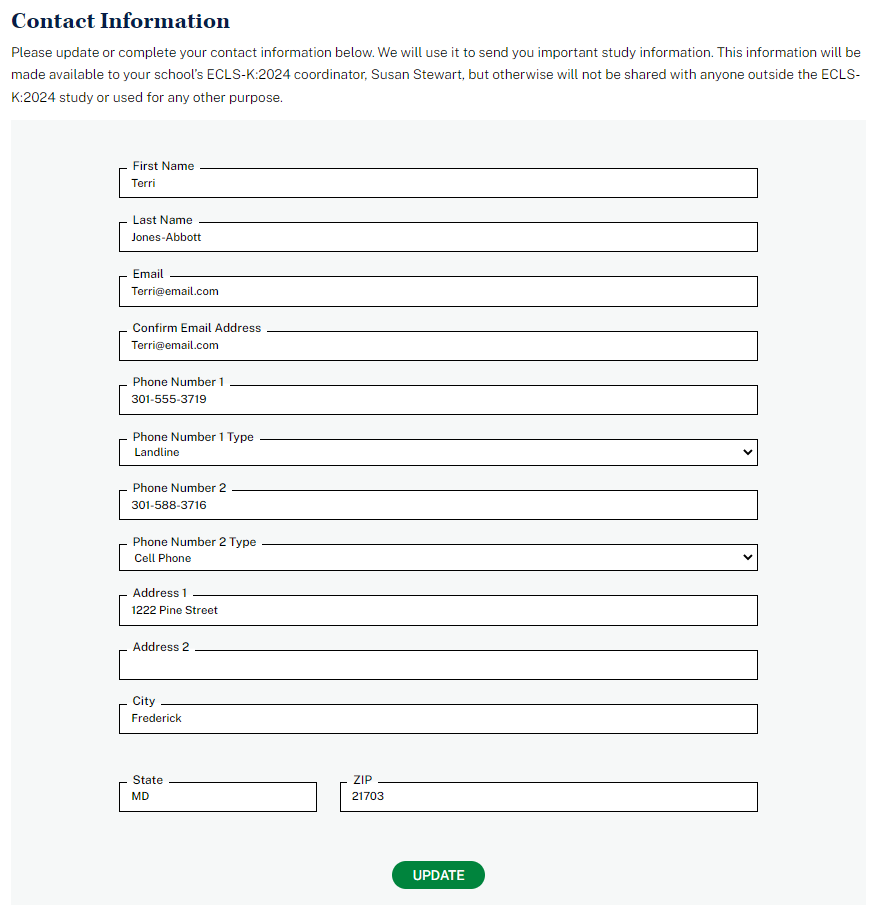
Contact Information
Please update or complete your contact information below. We will use it to send you important study information. This information [IN SPRING FIRST GRADE, DISPLAY ONLY FOR PARENTS OF CHILDREN ENROLLED IN A PARTICIPATING SCHOOL: will be made available to your school’s ECLS-K:2024 coordinator, [SC NAME], but otherwise] will not be shared with anyone outside the ECLS-K:2024 study or used for any other purpose.
First Name
Last Name
Email Address
Confirm Email Address
Phone Number 1
Phone Number 1 Type (home landline, cell phone, work, other)
Phone Number 2
Phone Number 2 Type (home landline, cell phone, work, other)
Address 1
Address 2
City
State
ZIP
Confirm/Update button
Spanish text:
Información de Contacto
A continuación, por favor actualice o complete su información de contacto. La usaremos para enviarle información importante del estudio. Esta información [IN SPRING FIRST GRADE, DISPLAY ONLY FOR PARENTS OF CHILDREN ENROLLED IN A PARTICIPATING SCHOOL: estará disponible para el/la coordinador(a) de ECLS -K:2024 de su escuela, [SC NAME], pero fuera de eso] no se compartirá con nadie fuera del estudio ECLS-K:2024 ni se usará para ningún otro propósito.
Primer nombre
Apellido(s)
Correo electrónico
Confirmar correo electrónico
Número de teléfono 1
Tipo de teléfono 1 (línea de la casa, teléfono celular, de trabajo, otro tipo)
Número de teléfono 2
Tipo de teléfono 2 (línea de la casa, teléfono celular, de trabajo, otro tipo)
Dirección 1
Dirección 2
Ciudad
Estado
CÓDIGO POSTAL
Confirmar/Actualizar button
The following error messages may display beneath the entry fields:
Please enter a valid US zip code (use a hyphen if 9 digits).
Spanish text: Por favor ponga un código postal de Estados Unidos válido (use el guión si pone 9 dígitos).
Please enter a valid email address.
Spanish text: Por favor ponga una dirección de correo electrónico válida.
The email address you entered does not match.
Spanish text: La dirección de email que puso no concuerda.
Please specify a valid state
Spanish text: Por favor especifique un estado válido.
Please enter a valid phone number.
Spanish text: Por favor ponga un número de teléfono válido.
Please select a phone number type [1/2].
Spanish text: Por favor seleccione qué tipo de teléfono es el teléfono número [1/2].
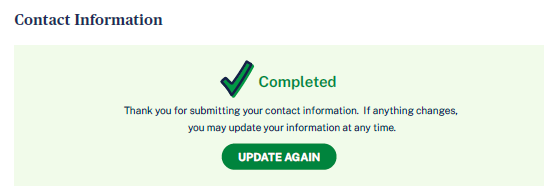
Contact Information
WHEN UPDATE BUTTON IS SELECTED, DISPLAY: Thank you for submitting your contact information. If anything changes, you may update your information at any time.
UPDATE AGAIN BUTTON
Información de Contacto
WHEN UPDATE BUTTON IS SELECTED, DISPLAY: Gracias por enviar su información de contacto. Si algo cambia, usted puede actualizarlo en cualquier momento.
ACTUALIZAR NUEVAMENTE BUTTON
5.5 More Information Section
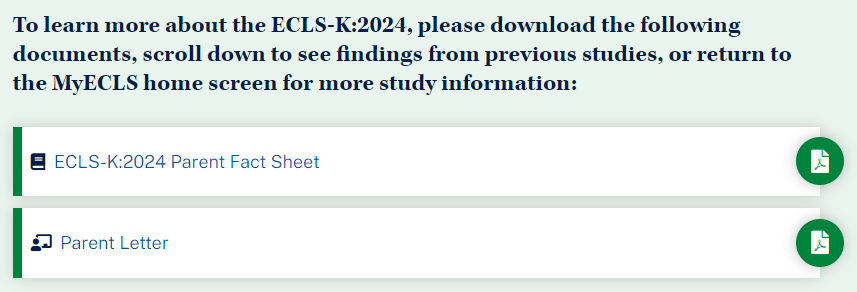
To learn more about the ECLS-K:2024, please download the following documents, scroll down to see findings from previous studies, or return to the MyECLS home screen for more study information:
ECLS-K:2024 Parent Fact Sheet [LINK TO PARENT FACT SHEET]
[SPRING KINDERGARTEN, FALL KINDERGARTEN, AND SPRING FIRST GRADE ONLY: Parent Letter [LINK TO LETTER]]
Para conocer más sobre el ECLS-K:2024, por favor descargue los siguientes documentos, avance para ver resultados de estudios anteriores o regrese a la página principal de MyECLS, para más información sobre el estudio:
Hoja de información de ECLS-K:2024 para padres y madres [LINK TO PARENT FACT SHEET]
[SPRING KINDERGARTEN, FALL KINDERGARTEN, AND SPRING FIRST GRADE ONLY: Carta para los padres y madres [LINK TO LETTER] ]
Display “Common Activities for Families” infographic. For the first grade rounds, replace “Common Activities for Families” infographic with “School Programs and Services Available to Parents and Families.”
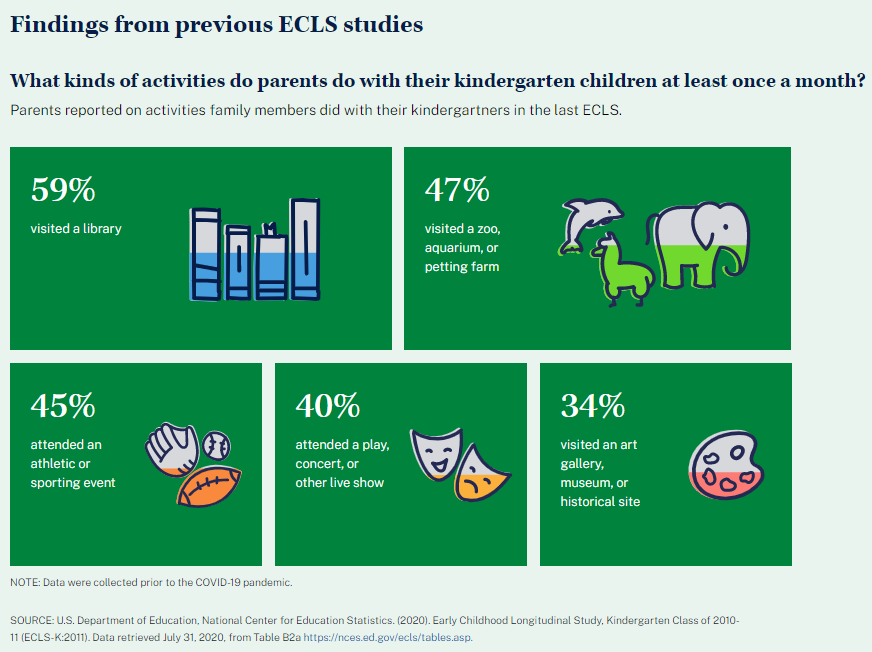
Findings from previous ECLS studies
What kinds of activities do parents do with their kindergarten children at least once a month?
Parents reported on activities family members did with their kindergartners in the last ECLS.
59% visited a library
47% visited a zoo, aquarium, or petting farm
45% attended an athletic or sporting event
40% attended a play, concert, or other live show
34% visited an art gallery, museum, or historical site
NOTE: Data were collected prior to the COVID-19 pandemic.
SOURCE: U.S. Department of Education, National Center for Education Statistics. (2020). Early Childhood Longitudinal Study, Kindergarten Class of 2010-11 (ECLS-K:2011). Data retrieved July 31, 2020, from Table B2a, https://nces.ed.gov/ecls/tables.asp.
Spanish text:
Resultados de estudios ECLS anteriores
¿Qué tipos de actividades realizan los padres y madres con sus niños de kindergarten, al menos una vez al mes?
Los padres o madres reportaron sobre las actividades que los miembros de la familia hicieron con sus niños de kindergarten en el último ECLS.
59% visitó una biblioteca
47% visitó un zoológico, un acuario o una granja de animales domésticos para niños
45% asistió a un evento atlético o deportivo
40% asistió a una obra de teatro, un concierto u otro show en vivo
34% visitó una galería de arte, un museo o un lugar histórico
NOTA: Los datos fueron recopilados antes de la pandemia de COVID-19.
FUENTE: Departamento de Educación de los EE.UU., Centro Nacional para Estadísticas de Educación. (2020). Estudio Longitudinal de la Primera Infancia, Clase de Kindergarten 2010-11 (ECLS-K:2011). Datos extraídos el 31 de julio de 2020, de la tabla B2a, https://nces.ed.gov/ecls/tables.asp.
Display “Barriers to Participation” infographic.

Parent Involvement in Schools
One way that results from the ECLS can be used is to help educators understand how, on average, children’s families engage in their child’s learning and school activities – such as parent-teacher conferences, back-to-school nights, PTA meetings, or science fairs. We learned the following from the parents of the ECLS students when they were in their second-grade year.
48% of the second-graders had parents who reported they could not get time off from work as a barrier to parent involvement in school activities
17% of the second-graders had parents who reported they did not have child care as a barrier to parent involvement in school activities
33% of the second-graders had parents who reported inconvenient meeting times as a barrier to parent involvement in school activities.
NOTE: Data were collected prior to the COVID-19 pandemic.
SOURCE: Redford, J., Huo, H., and McQuiggan, M. (2019). Barriers to Parent-School Involvement for Early Elementary Students (NCES 2017-165). U.S. Department of Education. Washington, DC: National Center for Education Statistics. Retrieved July 31, 2020, from https://nces.ed.gov/pubsearch/pubsinfo.asp?pubid=2017165.
Spanish text:
Participación de los padres y madres en las escuelas
Una forma en que los resultados del ECLS pueden usarse es ayudando a los educadores a entender de qué manera, en promedio, las familias de los niños participan en las actividades del aprendizaje y las actividades escolares de sus niños, tales como conferencias de padres y maestros, noches de regreso a la escuela, reuniones de la Asociación de padres/madres y maestros (PTA por sus siglas en inglés) o ferias de ciencias. Aprendimos lo siguiente de los padres y madres de estudiantes del ECLS cuando estaban en su segundo grado escolar.
48% de los estudiantes de segundo grado tenían padres o madres que reportaron que no tener permiso para ausentarse de sus trabajos era una barrera para su participación en las actividades escolares
17% de los estudiantes de segundo grado tenían padres o madres que reportaron que no tener cuidado de niños era una barrera para su participación en las actividades escolares
33% de los estudiantes de segundo grado tenían padres o madres que reportaron que organizar las reuniones en horarios inconvenientes era una barrera para su participación en las actividades escolares
NOTA: Los datos fueron recopilados antes de la pandemia de COVID-19.
FUENTE: Redford, J., Huo, H., and McQuiggan, M. (2019). Barriers to Parent-School Involvement for Early Elementary Students (NCES 2017-165). Departamento de Educación de los EE.UU. Washington, DC: Centro Nacional para Estadísticas de Educación. Datos extraídos el 31 de julio de 2020, de https://nces.ed.gov/pubsearch/pubsinfo.asp?pubid=2017165.
For the first grade rounds, replace “Common Activities for Families” infographic with “School Programs and Services Available to Parents and Families.”
Display the “School Programs and Services Available to Parents and Families” infographic.

School Programs and Services Available to Parents and Families
In the last two ECLS studies, the U.S. Department of Education asked school principals what types of programs and services to support parents and families were available at their schools.
9% A higher percentage of schools offered family literacy programs in 2010-11 than in 1998-99.
5% A higher percentage of schools offered health or social services in 2010-11 than in 1998-99.
7% A higher percentage of schools offered new family orientations in 2010-11 than in 1998-99.
16% A lower percentage of schools offered parenting education programs in 2010-11 than in 1998-99.
NOTE: Differences between years are calculated using unrounded estimates and may, therefore, differ from differences using rounded estimates. Health or social services are services offered collaboratively by service agencies such as hospitals. Parenting education programs may include classes on child development, education in being a parent, and understanding children's special needs.
NOTE: Data were collected prior to the COVID-19 pandemic.
SOURCE: U.S. Department of Education, National Center for Education Statistics, Early Childhood Longitudinal Study, Kindergarten Class of 1998–99 (ECLS-K), Kindergarten–Eighth Grade Public-Use Data File, and Early Childhood Longitudinal Study, Kindergarten Class of 2010–11 (ECLS-K:2011), Kindergarten–Fifth Grade Public-Use Data File. Data retrieved May 31, 2022, from Table A3a, https://nces.ed.gov/ecls/tables.asp.
Spanish Text:
Programas y servicios escolares disponibles para padres/madres y familias
En los últimos dos estudios de ECLS, el Departamento de Educación de los EE.UU. preguntó a los directores de los centros escolares de qué tupos de programas y servicios de apoyo a padres y familias disponían en sus escuelas.
9% Un porcentaje mayor de escuelas ofrecían programas de alfabetización familiar en 2010-11 que en 1998-99.
5% Un porcentaje mayor de escuelas ofrecía servicios de salud o servicios sociales en 2010-11 que en 1998-99.
7% Un porcentaje mayor de escuelas ofrecieron orientación para familias nuevas en 2010-11 que en 1998-99.
16% Un porcentaje menor de escuelas ofrecieron programas de educación para padres en 2010-11 que en 1998-99.
NOTA: Las diferencias entre los años se calcularon utilizando estimaciones sin redondear y, por lo tanto, pueden ser distintas a las diferencias que se calculan utilizando estimaciones redondeadas. Los servicios de salud o sociales son servicios ofrecidos de manera colaborativa por agencias que prestan servicios, tales como los hospitales. Los programas de educación para padres o madres pueden incluir clases sobre desarrollo infantil, educación para criar hijos y comprensión de las necesidades especiales de los niños.
NOTA: Los datos fueron recopilados antes de la pandemia de COVID-19.
FUENTE: Departamento de Educación de los EE.UU., Centro Nacional para Estadísticas de Educación, Estudio Longitudinal de la Primera Infancia, Clase de Kindergarten de 1998-99 (ECLS-K), Archivo de datos de uso público de Kindergarten- Octavo grado, y Estudio Longitudinal de la Primera Infancia, Clase de Kindergarten de 2010-11 (ECLS-K:2011), Archivo de datos de uso público de Kindergarten-quinto grado. Datos extraídos el 31 de mayo de 2022, de la Tabla A3a, https://nces.ed.gov/ecls/tables.asp.
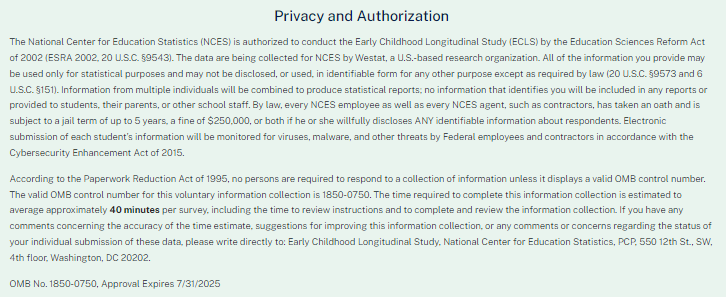
This language appears at the bottom of the Parent Portal page, directly on the screen.
Privacy and Authorization
The National Center for Education Statistics (NCES) is authorized to conduct the Early Childhood Longitudinal Study (ECLS) by the Education Sciences Reform Act of 2002 (ESRA 2002, 20 U.S.C. §9543). The data are being collected for NCES by Westat, a U.S.-based research organization. All of the information you provide may be used only for statistical purposes and may not be disclosed, or used, in identifiable form for any other purpose except as required by law (20 U.S.C. §9573 and 6 U.S.C. §151). Information from multiple individuals will be combined to produce statistical reports; no information that identifies you will be included in any reports or provided to students, their parents, or other school staff. By law, every NCES employee as well as every NCES agent, such as contractors, has taken an oath and is subject to a jail term of up to 5 years, a fine of $250,000, or both if he or she willfully discloses ANY identifiable information about respondents. Electronic submission of each student’s information will be monitored for viruses, malware, and other threats by Federal employees and contractors in accordance with the Cybersecurity Enhancement Act of 2015.
According to the Paperwork Reduction Act of 1995, no persons are required to respond to a collection of information unless it displays a valid OMB control number. The valid OMB control number for this voluntary information collection is 1850-0750. The time required to complete this information collection is estimated to average approximately 40 minutes per survey, including the time to review instructions and to complete and review the information collection. If you have any comments concerning the accuracy of the time estimate, suggestions for improving this information collection, or any comments or concerns regarding the status of your individual submission of these data, please write directly to: Early Childhood Longitudinal Study, National Center for Education Statistics, PCP, 550 12th St., SW, 4th floor, Washington, DC 20202.
OMB No. 1850-0750, Approval Expires XX/XX/XXXX
Spanish text:
Privacidad y Autorización
El Centro Nacional para Estadísticas de Educación (NCES) está autorizado a hacer el Estudio Longitudinal de la Primera Infancia (ECLS por sus siglas en inglés) por el Acta de Reforma de las Ciencias de la Educación de 2002 (ESRA 2002, 20 U.S.C. §9543). La firma Westat, una organización que realiza estudios y está basada en los Estados Unidos, está recopilando los datos para NCES. Toda la información que usted proporcione podrá usarse solamente para propósitos estadísticos y no podrá divulgarse ni usarse de manera que permita identificar a los participantes para ningún otro propósito, salvo que lo requiera la ley (20 U.S.C. §9573 y 6 U.S.C. §151). La información recopilada de múltiples participantes se combinará para producir reportes estadísticos; ninguna información que pudiera identificarlo(a) será incluida en ningún reporte ni será proporcionada a los estudiantes, a sus padres o a otro personal de la escuela. Por ley, cada empleado de NCES, al igual que cada agente de NCES -- por ejemplo, los contratistas -- ha prestado un juramento y puede recibir una pena de cárcel de hasta 5 años, una multa de 250.000 dólares o ambas cosas, si revela deliberadamente CUALQUIER información que permita identificar a los participantes. En cumplimiento con la Ley de Mejora de la Ciberseguridad de 2015, habrá empleados y contratistas federales monitoreando el envío electrónico de la información de cada estudiante para detectar virus, malware y otras amenazas.
Según lo establece el Acta de Reducción del Papeleo de 1995, ninguna persona está obligada a responder a un pedido de información si la misma no contiene un número de control de OMB válido. El número de control de OMB válido para recolectar esta información que se proporciona voluntariamente es 1850-0750. Se estima que el tiempo necesario para completar esta recolección de información es de aproximadamente 40 minutos por encuesta, incluido el tiempo para revisar las instrucciones, y para completar y revisar la recopilación de información. Si usted tiene algún comentario con respecto a la precisión del cálculo de tiempo, sugerencias para mejorar esta recolección de información, o cualquier comentario o inquietud acerca del estatus del envío de sus datos individuales, por favor escriba directamente a: Early Childhood Longitudinal Study, National Center for Education Statistics, PCP, 550 12th St., SW, 4th floor, Washington, DC 20202.
Número OMB. 1850-0750, La aprobación vence el XX/XX/XXXX
1 The MyECLS website will be live during the fall 2024 advance school contact round, during which time field data collectors contact participating schools to confirm school and child information from the spring kindergarten round, to collect new school information for children who are no longer enrolled in the school, to recruit new transfer schools to participate, and to arrange logistics and schedule the dates for the spring first-grade school visit.
F-
| File Type | application/vnd.openxmlformats-officedocument.wordprocessingml.document |
| File Modified | 0000-00-00 |
| File Created | 2024-11-15 |
© 2026 OMB.report | Privacy Policy